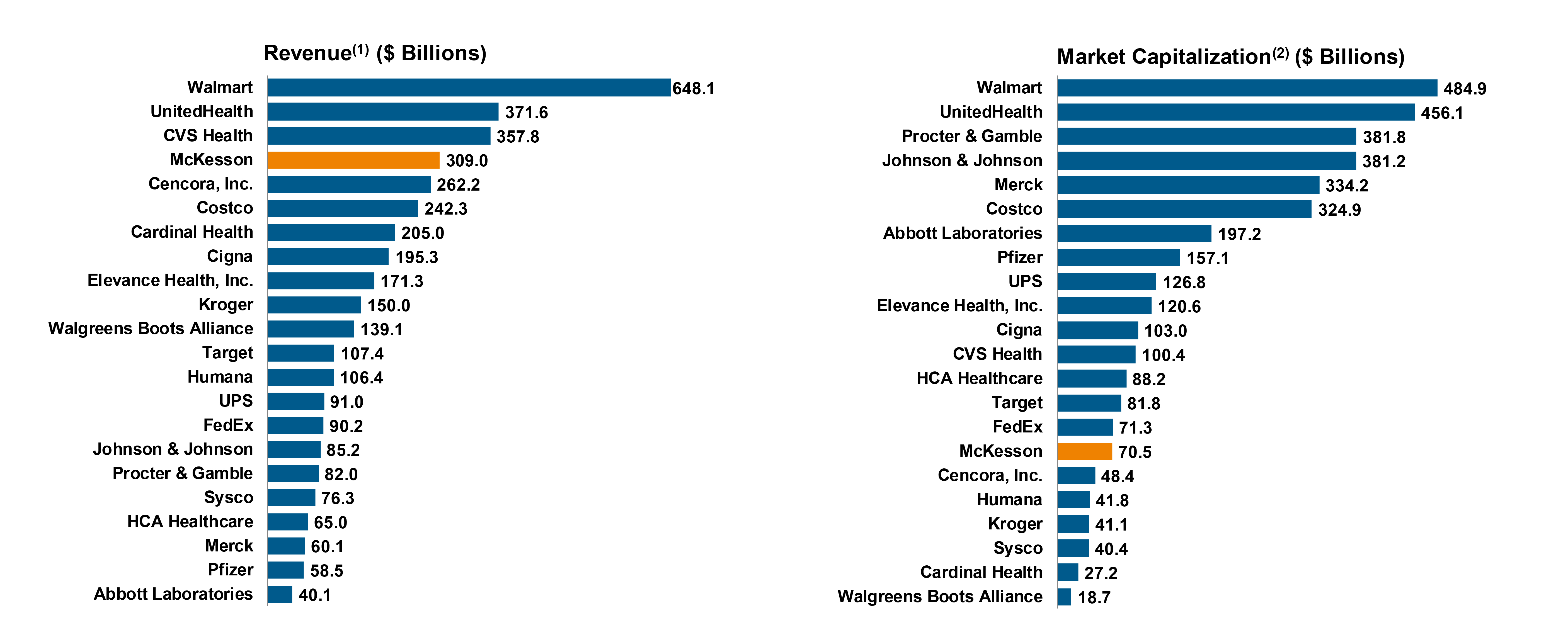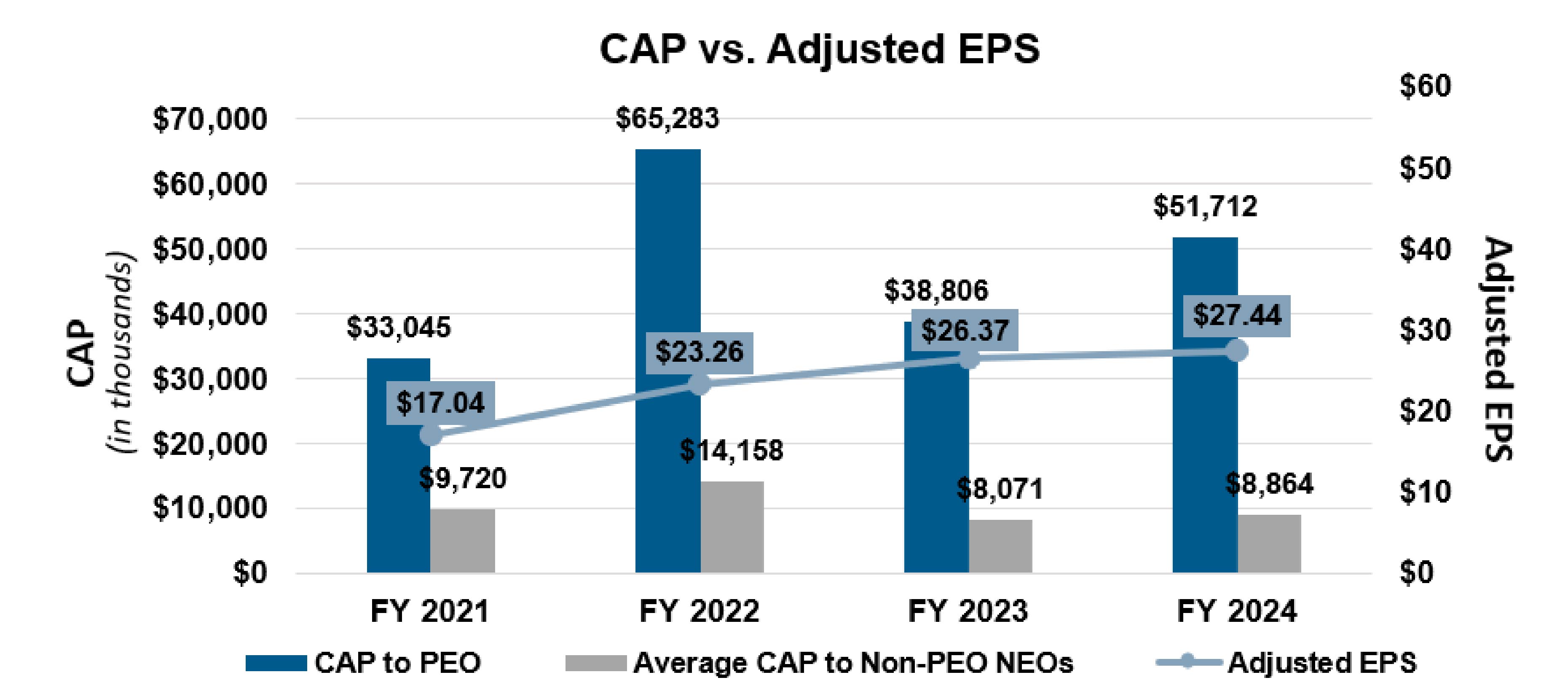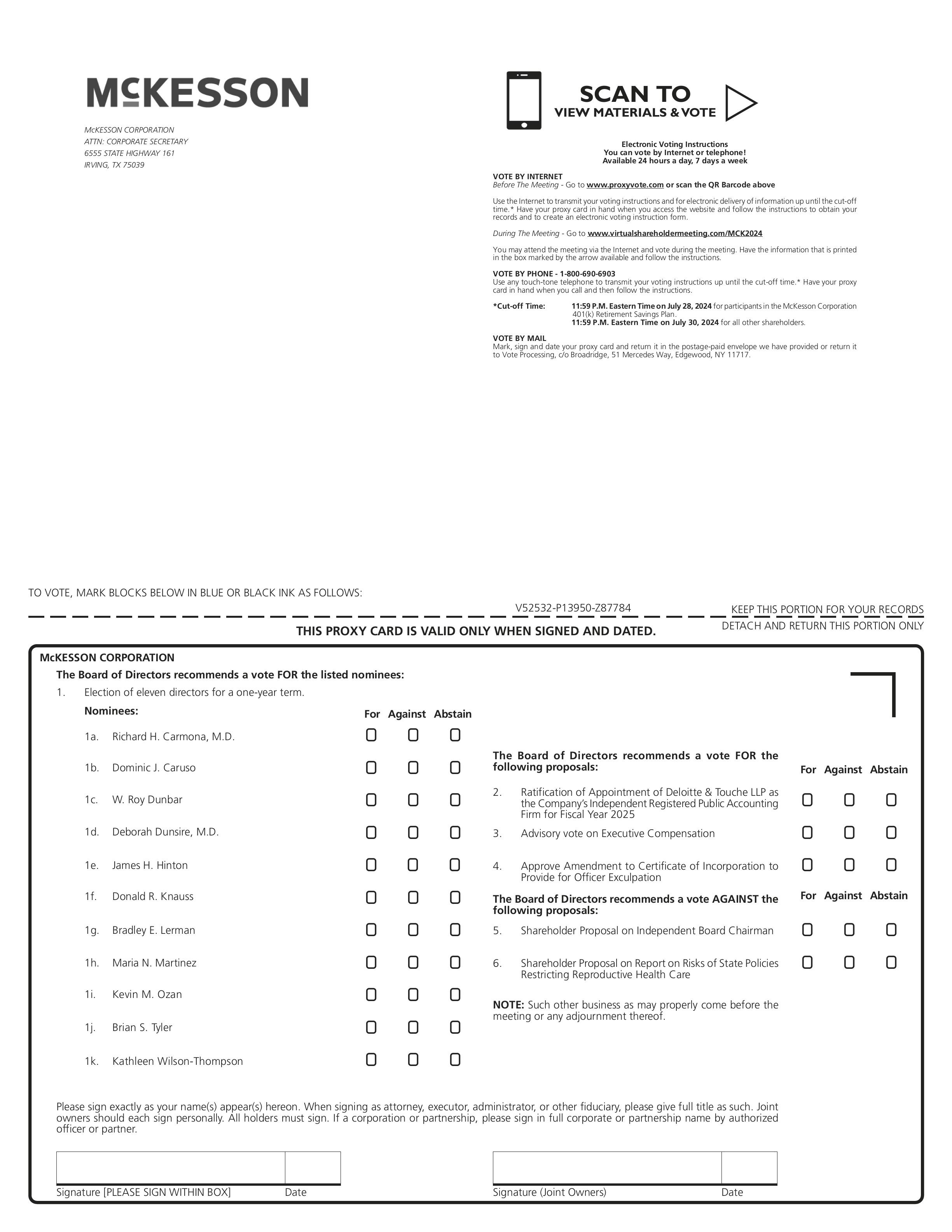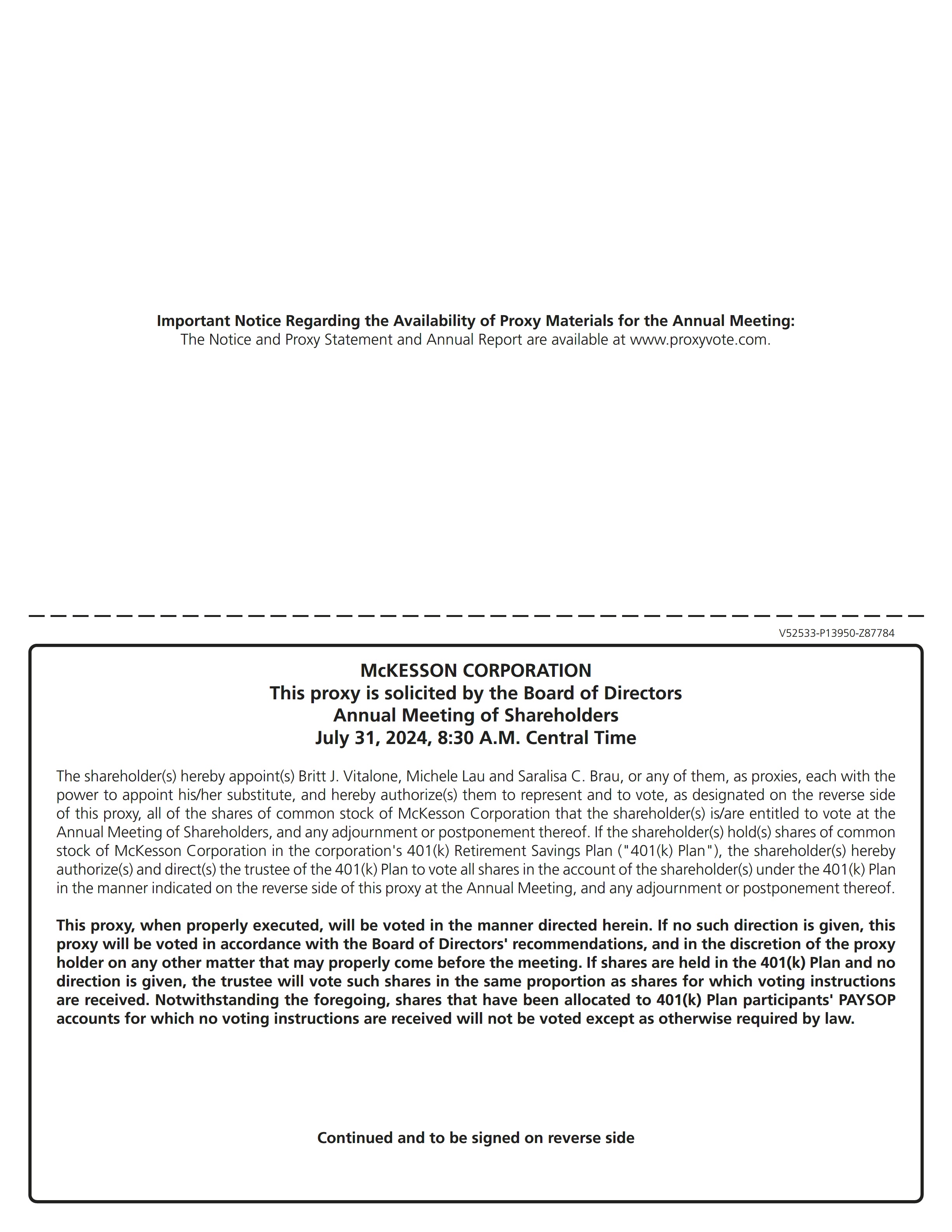UNITED STATES
SECURITIES AND EXCHANGE COMMISSION
Washington, D.C. 20549
SCHEDULE 14A
Proxy Statement Pursuant to Section 14(a) of the Securities
Exchange Act of 1934 (Amendment No. )
| | | | | |
| |
 Filed by the Registrant Filed by the Registrant | ☐ Filed by a Party other than the Registrant |
| | | | | |
| |
| Check the appropriate box: |
| Preliminary Proxy Statement |
| ☐ | CONFIDENTIAL, FOR USE OF THE COMMISSION ONLY (AS PERMITTED BY RULE 14a-6(e)(2)) |
| ☐ | Definitive Proxy Statement |
| ☐ | Definitive Additional Materials |
| ☐ | Soliciting Material Pursuant to §240.14a-12 |
McKESSON CORPORATION
(Name of Registrant as Specified In Its Charter)
(Name of Person(s) Filing Proxy Statement, if other than the Registrant)
| | | | | |
| |
| Payment of Filing Fee (Check the appropriate box): |
| No fee required. |
| ☐ | Fee paid previously with preliminary materials. |
| ☐ | Fee computed on table in exhibit required by Item 25(b) per Exchange Act Rules 14a6(i)(1) and 0-11. |
| | | | | |
| |
| Focus on People and Culture |
| | | | | | | | | | | | | | |
| | | | |
| Purpose Advancing Health Outcomes for All® | | | Mission Improve care in every setting – one product, one partner, one patient at a time |
| | | | |
| | | | | |
| What sets McKesson apart as an exceptional place is our people. Our employees understand that together, unified by our global I²CARE values, we fulfill our mission and uphold our reputation as a trusted partner to our customers and their patients. Our I²CARE values are foundational to all that we do, and who we are as a company. |
| | | | | | | | | | | | | | | | | |
| | | | | |
| | | | | |
| | | | | |
| INTEGRITY | INCLUSION | CUSTOMER-FIRST | ACCOUNTABILITY | RESPECT | EXCELLENCE |
| | | | | |
| | | | | |
| At McKesson, everyone is a leader. ILEAD (Inspire, Leverage, Execute, Advance, Develop) is our common definition and shared commitment to leadership. By embracing this commitment, we bring out the best in ourselves and position McKesson to continue to drive better health – for our company, our customers, and the patients we touch for years to come. |
| | | | | | | | | | | | | | |
| | | | |
| | | | |
| | | | |
| INSPIRE | LEVERAGE | EXECUTE | ADVANCE | DEVELOP |
| | | | |
| | | | | | | | | | | |
| | | |
| A Letter From Our Independent Chair |
| | | |
| | |
| “We value shareholder engagement as integral to the Board’s oversight and deliberative processes. Shareholder feedback informs our decisions and enables the Board to be a more effective steward of shareholder capital.” |
| Donald R. Knauss Independent Chair |
June [ ], 2024
Dear Fellow Shareholders,
On behalf of our entire Board of Directors, thank you for your continued investment in McKesson. As we approach our 2024 Annual Meeting of Shareholders on July 31, 2024, we’d like to take this opportunity to provide an update on important strategic, operational and governance developments that highlight the work we have done on behalf of shareholders throughout the year. As directors, we take pride in the role we play in overseeing the Company’s execution of our strategy and in setting the tone at the top to ensure continued focus on our purpose of Advancing Health Outcomes for All®.
Strategic Priorities and Performance
McKesson achieved strong financial results in fiscal year 2024 and made progress on its strategic priorities. Our priorities guide our efforts and serve as a framework to track and communicate our success. We are proud to report on the advancements made across McKesson's four strategic priorities:
•Focus on People and Culture: Our people and culture are foundational to everything we do. McKesson was recognized as one of America’s Greatest Workplaces for Diversity in 2024 by Newsweek, an Equality 100 Award winner by the Human Rights Campaign Foundation and a Military Friendly Employer for the 11th consecutive year. Among our 2024 director nominees, three are women, four are ethnically or racially diverse and two are U.S. veterans. Our Board regularly reviews with management the Company's talent management practices, culture, digital evolution and other key topics and developments.
•Drive Sustainable Core Growth: We are making investments in our foundational distribution assets by adding state-of-the-art automation and integrating artificial intelligence and machine learning technologies. Over the past year, McKesson opened two new distribution centers in the U.S. with innovative technologies, sustainability features and employee-friendly designs to enable faster medication shipments and greater employee productivity.
•Expand Oncology and Biopharma Platforms: We are confident in the scale and depth of our differentiated oncology and biopharma assets. We saw another year of significant expansion in the U.S. Oncology Network with growth to support approximately 2,600 providers spanning across 600 sites in 31 states.
•Evolve and Grow the Portfolio: While we continue to invest and grow the Company, evolving the portfolio is an ongoing process as we ensure our resources and investments are focused on strategic growth areas. In January 2024, we acquired Compile, Inc., a healthcare data platform that captures and aggregates data to provide insights and analytics for biopharma companies.
Our progress to date is underpinned by the execution against these important strategic priorities. Page 6 provides highlights of some of our more significant financial accomplishments in fiscal year 2024.
| | |
| A Letter From Our Independent Chair |
|
Board Refreshment
Our directors are a highly committed group and they bring a balanced mix of skills, experiences and backgrounds to their oversight work. We continually assess the qualifications of our directors as part of our robust Board evaluation process, while considering McKesson's strategic and other oversight needs. As part of our Board succession planning, we elected Deborah Dunsire, M.D. and Kevin M. Ozan to the Board in 2024. Dr. Dunsire previously served as President and Chief Executive Officer of H. Lundbeck A/S, a biopharmaceutical company specializing in developing and delivering transformative therapies for brain diseases, and prior to that, she held executive leadership roles for several pharmaceutical companies. Mr. Ozan previously served as EVP and Chief Financial Officer of McDonald's Corporation, a leading global retailer, and he has over two decades of experience in strategy and finance. The Board is delighted to welcome Dr. Dunsire and Mr. Ozan and values the perspectives they bring.
Linda P. Mantia and Susan R. Salka will not be standing for re-election at the Annual Meeting. On behalf of the entire Board, I would like to thank them both for their dedicated service on the McKesson Board. We appreciate the significant contributions they have made over the years, including their service as committee chairs. Their leadership and valuable insights in service of our shareholders are much appreciated.
Executive Operating Team Updates
As we advance our strategic priorities, we constantly evaluate our organizational structure to ensure we have the right leadership to drive long-term sustainable growth. Our Board is fully aware that everything we do starts with our talent, and we recognize the important role the Board plays in ensuring that McKesson has a broad and deep talent pipeline. The Board along with the Compensation and Talent Committee regularly reviews senior leadership and CEO succession planning, consulting with management as necessary. McKesson made several leadership changes in the past year to align our operating team to our go-forward priorities and drive long-term shareholder value. Our EVP and Chief Financial Officer, Britt J. Vitalone, assumed expanded leadership responsibilities for McKesson Technology and mergers and acquisitions, and a new EVP and Chief Information Officer and Chief Technology Officer, Francisco Fraga, was appointed, reflecting the importance of technology and data capabilities in enabling McKesson's enterprise strategy. Michele Lau rejoined McKesson as EVP and Chief Legal Officer, bringing extensive legal, compliance, government affairs and sustainability experience, in addition to over a decade of previous experience at McKesson. The Board would like to express its gratitude to Lori A. Schechter, who retired as EVP, Chief Legal Officer and General Counsel at the end of 2023, for her service of over a decade to McKesson and the Board.
Shareholder Engagement
Our Board appreciates our shareholders’ perspectives on critical topics, including Board, governance, compensation and sustainability-related matters. We value shareholder engagement as integral to the Board’s oversight and deliberative processes. Shareholder feedback informs our decisions and enables the Board to be a more effective steward of shareholder capital. In fiscal year 2024, McKesson proactively reached out to shareholders who collectively represented approximately 51% of our outstanding common stock, ultimately engaging with approximately 33%. These conversations provide the Board and management with invaluable insights, many of which resulted in responsive actions. I personally have benefited from having conversations directly with our shareholders, and I know my fellow directors have as well. Discussions with shareholders over the last year have informed the Board’s deliberation on several topics, including the composition of the Board, human capital management and the Company’s sustainability metrics.
Thank You
We are grateful for your support of McKesson and the over 51,000 employees who further McKesson’s mission and uphold its culture and values. Your vote is very important to us. We strongly encourage you to read both our proxy statement and annual report in their entirety prior to the Annual Meeting and request that you support our voting recommendations.
Donald R. Knauss
Independent Chair of the Board
| | | | | |
| PRELIMINARY PROXY — SUBJECT TO COMPLETION |
|
| Notice of 2024 Annual Meeting of Shareholders To Be Held on July 31, 2024 |
| | | | | | | | | | | | | | | | | |
| Time and Date | | Location | | Record Date |
July 31, 2024 08:30 a.m. Central Time | www.virtualshareholdermeeting.com/MCK2024 | Shareholders of record at the close of business on June 5, 2024 are entitled to notice of and to vote at the Annual Meeting or any adjournment or postponement of the Annual Meeting. |
| | | | | | | | | | | | | | |
| Items of Business | Vote Recommendations | For Further Details |
| | | | |
| 1 | Elect for a one-year term a slate of 11 directors as nominated by the Board of Directors | | “FOR” each nominee | |
| | | | |
| | | | |
| 2 | Ratify the appointment of Deloitte & Touche LLP as the Company’s independent registered public accounting firm for the fiscal year ending March 31, 2025 | | “FOR” | |
| | | | |
| | | | |
| 3 | Conduct a non-binding advisory vote on executive compensation | | “FOR” | |
| | | | |
| | | | |
| 4 | Approve an amendment to our Certificate of Incorporation to provide for the exculpation of officers as permitted by Delaware law | | "FOR" | |
| | | | |
| | | | |
| 5-6 | Vote on two shareholder proposals, if properly presented | | “AGAINST” | |
We also will conduct such other business as may properly be brought before the meeting.
You will be able to attend the Annual Meeting online, vote and submit questions during the meeting by visiting www.virtualshareholdermeeting.com/MCK2024 and entering the 16-digit control number included in our Notice Regarding the Availability of Proxy Materials, voting instructions form or proxy card. Online access to the audio webcast will open approximately 15 minutes prior to the start of the Annual Meeting to allow time for you to log in and test the computer audio system.
On or about June [ ], 2024, we began delivering proxy materials to all shareholders of record at the close of business on June 5, 2024. The mailing address of our principal executive offices is McKesson Corporation, 6555 State Highway 161, Irving, Texas 75039.
June [ ], 2024
By Order of the Board of Directors
Saralisa C. Brau
Corporate Secretary
VOTING METHODS
| | | | | | | | | | | | | | | | | | | | | | | |
| Vote via Internet www.proxyvote.com or visit the URL located on your proxy card | | Call Toll-Free Call the phone number located at the top of your proxy card | | Vote by Mail Follow the instructions on your proxy card | | Vote at Meeting Join our Annual Meeting at www.virtualshareholdermeeting.com/MCK2024 |
Important Notice Regarding the Availability of Proxy Materials for the 2024 Annual Meeting of Shareholders to be held on July 31, 2024. Our 2024 proxy statement and annual report are available free of charge at proxyvote.com.
| | | | | | | | | | | |
| |
| |
| |
| |
| |
| |
| |
| Change in Control Policy | |
| |
| |
| |
| | | |
| Item 4 | | |
| |
| | | |
| Approve Amendment to Certificate of Incorporation to Provide for Officer Exculpation | |
| | | |
| | | |
| Item 5 | | |
| |
| | | |
| | |
| | | |
| | | |
| Item 6 | | |
| |
| | | |
| | |
| | | |
| | | |
| |
| |
| |
| | | |
| |
| | | |
| |
| | | | | | | | | | | |
| | | |
| Notable Developments and Where to Read More | |
| | | |
| | | |
| | | |
| | | |
| | | |
| | | |
| | | |
This summary highlights certain information in this proxy statement and does not contain all the information you should consider in voting your shares. Please refer to the complete proxy statement and our annual report prior to voting at the Annual Meeting of Shareholders to be held on July 31, 2024 (Annual Meeting).
Our Company Priorities
McKesson Corporation is a diversified healthcare services leader dedicated to Advancing Health Outcomes for All®. We partner with biopharma companies, care providers, pharmacies, manufacturers, governments and others to deliver insights, products and services to help make quality care more accessible and affordable. Our company is focused on addressing the changing needs of our customers, their patients and the broader healthcare ecosystem. We have developed a clear enterprise strategy centered around a set of four company priorities:
Focus on People and Culture
| | | | | |
| One of McKesson’s defining characteristics is our strong culture. As members of Team McKesson, we are proud to foster a sense of belonging, find purpose and meaning in our work, and do everything we can to care for each other, our customers and all those who depend on us. We believe the best way to realize our purpose of Advancing Health Outcomes for All® is to utilize our strengths, live our I²CARE values (Integrity, Inclusion, Customer-First, Accountability, Respect and Excellence) and stay grounded in the ILEAD leadership principles (Inspire, Leverage, Execute, Advance, Develop) that move our company forward and enable us to make a lasting and meaningful impact. |
Drive Sustainable Core Growth
| | | | | |
| Our operational excellence and ability to leverage our scale and distribution expertise is one of the many reasons why McKesson continues to be the partner of choice for hospitals, health systems and pharmacies of all sizes. |
Expand Oncology and Biopharma Platforms
| | | | | |
| We are building integrated platforms that leverage our differentiated assets and capabilities. We continue to develop innovative solutions and services that solve complicated healthcare problems and improve patients’ lives. |
Evolve and Grow the Portfolio
| | | | | |
| We are focused on unlocking more innovation and more speed by maximizing the organization’s operational efficiency and allocating our resources on the highest growth opportunities. |
Fiscal Year 2024 Highlights
In fiscal year 2024 (FY 2024), McKesson delivered growth in revenue and adjusted earnings per share. Our results reflect the commitment of our employees and their dedication to deliver for customers, patients, communities and shareholders.
| | |
Total Revenues
(in billions) |
| | | | | | | | | | | |
| n | Operating Cash Flow | n | Free Cash Flow* |
| | |
Shareholder Return
(in billions) |
| | | | | | | | | | | |
| n | Total Cash Returned to Shareholders | n | Share Repurchases |
* See Appendix A to this proxy statement for a reconciliation of free cash flow, a non-GAAP metric, to the most directly comparable GAAP metric.
McKesson’s Impact
Advancing Health Outcomes for All®
| | | | | | | | | | | | | | | | | | | | |
| | | | | | |
| Our People | | Our Partners | | Our Community | | Our Planet |
We are committed to improving care in every setting in pursuit of our purpose of Advancing Health Outcomes for All®. It is this purpose that drives us to make advancements within our enterprise and beyond. McKesson is an impact-driven organization that is committed to providing equitable and dynamic opportunities for people to thrive, collaborating to improve health outcomes for patients, enhancing the health of those in our communities and delivering environmental action for health. These themes support McKesson’s purpose and align with our Impact Pillars: Our People, Our Partners, Our Community and Our Planet.
To learn more about McKesson’s impact in these areas, please see our FY 2024 Impact Report, which we expect to be available on the Company’s website in June 2024. Our Impact Report is not part of, or incorporated by reference into, this proxy statement.
Science Based Targets Initiative
In fiscal year 2023, McKesson received approval from the Science Based Targets initiative (SBTi) for our near-term climate change targets – following through on our commitment to set science-based targets to guide our greenhouse gas (GHG) emissions reductions. In doing so, McKesson joined companies across the globe committed to setting and achieving targets to reduce GHG emissions that are aligned to the goal of limiting global temperature rise to 1.5º C.
| | | | | | | | | | | | | | | | | | | | |
|
| Our near-term, science-based targets as approved by SBTi are as follows: | |
| | | | |
| Reduce absolute scope one and two GHG emissions 50.4% by FY 2032 from a FY 2020 base year | | Ensure 70% of McKesson suppliers, by spend covering purchased goods and services, will have their own science-based targets by FY 2027 |
| |
|
| McKesson's efforts to achieve these science-based targets include projects and initiatives in the following areas: |
| | | | |
| Energy efficiency projects in our buildings | | Increasing our procurement of renewable energy |
| Improving fleet efficiency and using alternative fuel vehicles | | Engaging with our suppliers to set their own SBTi targets |
|
Investing in Our Local Communities
The McKesson Foundation, a 501(c)(3) organization (Foundation), continued to support our communities and awarded grants to charitable organizations in the U.S. and Canada working to reduce the burden of cancer, prepare tomorrow’s healthcare workforce and accelerate crisis response. Through its grant-making program, the Foundation funded nearly 50 organizations and disbursed approximately $9 million in FY 2024. One third of the grant funds supported direct patient care and assistance.
The McKesson Foundation Scholarship Program, funded by the Foundation and administered by Scholarship America, expanded the number of new scholarships awarded to McKesson family members and increased the scholarship award amount. Nearly half of the new scholarship recipients are the first in their family to attend college.
| | | | | | | | |
| | |
| | $2 million in employee matching gifts to benefit more than 2,200 charities in FY 2024 |
| | |
| | Our employees volunteered more than 44,000 hours with charities across the U.S. and Canada |
| | |
We Welcome Shareholder Feedback Year-Round
Our Board of Directors believes proactive shareholder engagement and consideration of shareholder feedback are critical to driving long-term growth and creating shareholder value. Our shareholder engagement program is a robust, year-round process encompassing meetings held throughout the year with shareholders during which we encourage ongoing, meaningful dialogue about the issues they find most important. We report shareholder feedback regularly to our Board, and our Independent Chair and chair of the Audit Committee participated in several of these key engagements in FY 2024.
| | | | | | | | | | | | | | | | | | | | |
| | | | | | |
| | Assess & Prepare | | | | Engage with Shareholders |
| Our Board reviews our annual meeting results, ongoing shareholder feedback and corporate governance and compensation trends to help drive and develop our shareholder engagement priorities. Management also attends various conferences throughout the year to better understand our stakeholders' views on corporate governance trends and other matters. | We respond to shareholder feedback by enhancing our policies, practices and disclosures informed by ongoing dialogue with our shareholders. The proxy statement communicates important updates and enhancements made during the fiscal year. |
| | | | | | |
| | |
| | | | | | |
| | Respond to Shareholder Feedback | | | | Evaluate Shareholder Feedback |
| We invite shareholders to engage with us throughout the year. We also connect with shareholder proponents to learn about concerns they identify. During our engagements, we provide important corporate governance and other updates about the Company and proactively request shareholders' feedback. | Our Board reviews shareholder feedback throughout the year and identifies key themes, which inform important practices and policies. |
| | | | | | |
Scope of Outreach and Key Topics
In FY 2024, we proactively reached out to shareholders representing approximately 51% of our outstanding common stock and engaged with shareholders representing approximately 33% of our outstanding common stock. Our Independent Chair and chair of the Audit Committee participated in meetings with shareholders representing approximately 19% of our outstanding common stock. Topics discussed with our shareholders included:
•Board Composition
•Board Skills and Diversity
•Board Evaluation
•Management Succession Planning
•Sustainability Metrics in Executive Compensation
•Human Capital Management
•Emissions Reduction Targets
Moreover, our Chief Executive Officer, Chief Financial Officer and Investor Relations team attended six healthcare conferences and multiple non-deal road shows in FY 2024 to discuss the Company’s strategic priorities and other topics.
| | | | | | | | | | | |
| Item | | Your Board’s Recommendation |
| | | |
| 1 | ELECTION OF 11 DIRECTOR NOMINEES FOR A ONE-YEAR TERM Our director nominees bring broad and relevant leadership and professional experience to the McKesson Board. Ten of our eleven director nominees are independent. | | FOR each nominee |
 (See Page 15) (See Page 15) |
| | | |
Director Nominees and Our Approach to Governance
Our director nominees bring a broad and relevant mix of skills, experience, backgrounds and perspectives. Additional information about each director nominee’s experience, qualifications and self-identification can be found beginning on page 15 of this proxy statement. Board Diversity
50% of independent director nominees are women and / or ethnically or racially diverse
Board Refreshment
70% of independent director nominees have a tenure of less than 5 years
Director Independence
10 director nominees are independent
| | | | | |
| Female | lll |
| |
| Ethnic or Racial Diversity | llll |
| |
| Veteran | ll |
| | | | | | | | | | | | | | |
| Skills and Experience Highlights that Advance Company Priorities |
| | | | |
| | | | | | | | | | | | | | | | | |
| The following table provides summary information about the 11 director nominees and their committee memberships immediately after the Annual Meeting if all director nominees are elected. |
| Name | | Age | Director Since | Committee Memberships | Other Public Company Boards |
| Richard H. Carmona, M.D.  Chief of Health Innovations of Canyon Ranch, Inc. and 17th Surgeon General of the United States | 74 | 2021 | | 1 |
| Dominic J. Caruso  Retired EVP and CFO, Johnson & Johnson | 66 | 2018 | | 1 |
| W. Roy Dunbar  Retired CEO and Chairman,
Network Solutions, LLC | 63 | 2022 | | 3 |
| Deborah Dunsire, M.D.  Retired President and CEO,
H. Lundbeck A/S | 62 | 2024 | | 2 |
| James H. Hinton  Operating Partner, Welsh, Carson, Anderson & Stowe | 65 | 2022 | | 0 |
| Donald R. Knauss  Retired Chairman and CEO,
The Clorox Company | 73 | 2014 | | 2 |
| Bradley E. Lerman  EVP and Chief Legal Officer, Starbucks Corporation | 68 | 2018 | | 0 |
| Maria N. Martinez  Retired EVP and COO, Cisco Systems, Inc. | 66 | 2019 | | 0 |
| Kevin M. Ozan  Retired EVP and CFO, McDonald's Corporation | 61 | 2024 | | 1 |
| Brian S. Tyler CEO, McKesson Corporation | 57 | 2019 | – | 1 |
| Kathleen Wilson-Thompson  Retired EVP and Global CHRO,
Walgreens Boots Alliance, Inc. | 66 | 2022 | | 2 |
| | | | | | | | | | | | | | | | | |
| Committee Chair | | Audit | | Compensation and Talent |
| Compliance | | Finance | | Governance and Sustainability |
| Independent | | | | |
We believe that our director nominees possess the right mix of skills, qualifications and experience that provide us with the optimal composition for the McKesson Board. A snapshot of our director nominees' skills include:
Focus on People and Culture
Drive Sustainable Core Growth
Expand Oncology and Biopharma Platforms
Evolve and Grow
the Portfolio
| | |
| Sustainability and Human Capital Management |
| | |
| Distribution / Supply Chain Experience |
| | |
Healthcare
Industry Experience |
| | |
Business
Transformation / M&A |
Governance Highlights
Focused oversight responsibilities. Our Governance and Sustainability Committee is responsible for the oversight of corporate governance and sustainability matters, including an annual review of sustainability strategy. Our Compensation and Talent Committee is responsible for the oversight of senior management succession planning and topics related to our best talent strategy and talent development, employee engagement and culture matters. Our Compliance Committee, in coordination with the Audit Committee, reviews among other things the Company's approach to risk identification and mitigation plans for certain cybersecurity and technology-related risks. These focused committee-level responsibilities allow our Board to effectively address issues salient to our Company strategy and the broader market environment.
Leading corporate governance practices. We highlight some of the key features of our corporate governance practices below. Please see “Corporate Governance” beginning on page 26 of this proxy statement for more information about McKesson’s corporate governance practices. | | | | | | | | |
| | |
| | |
| Shareholder Rights | Board of Directors | Corporate Governance |
| | |
•Annual election of directors with majority voting standard for uncontested elections •Proxy access •Meaningful right to call special meeting of shareholders (15% ownership threshold) •No supermajority vote provisions | •Independent Chair of the Board •10 of 11 director nominees are independent •Regular executive sessions of independent directors •Annual Board and committee evaluation process •Policy requiring directors with over 12 years of tenure to offer to resign •Policies on other public company board service and retirement age | •Pay for performance alignment •No poison pill •Comprehensive Board and senior management succession planning process •Robust shareholder engagement program •Enhanced risk oversight policies •Stock ownership guidelines for executives and directors |
| | | | | | | | |
| Item | | Your Board’s Recommendation |
| | |
| 2 | RATIFICATION OF APPOINTMENT OF DELOITTE & TOUCHE LLP AS THE COMPANY’S INDEPENDENT REGISTERED PUBLIC ACCOUNTING FIRM FOR FISCAL YEAR 2025 Deloitte & Touche LLP (D&T) is an independent accounting firm with the breadth of expertise and knowledge necessary to audit the Company. Their institutional knowledge of our business and control framework results in effective and efficient audits. The Audit Committee has reviewed the independence, qualifications and performance of D&T and has determined that their retention is in the best interests of McKesson and its shareholders. |  FOR FOR (See Page 42) (See Page 42) |
| | |
| | | | | | | | |
| Item | | Your Board’s Recommendation |
| | |
| 3 | ADVISORY VOTE ON EXECUTIVE COMPENSATION Our executive compensation program is the result of thorough Compensation and Talent Committee review, and it continues to emphasize pay for performance and reflects shareholder feedback. |  FOR FOR (See Page 44) (See Page 44) |
| | |
Executive Compensation Highlights
As discussed in detail under “Compensation Discussion and Analysis,” we have developed an executive compensation program designed to strike the right balance of pay for performance, attract and retain an exceptionally talented executive team, steer McKesson’s leadership to meet ambitious goals without taking undue risk, and build long-term value for our shareholders.
| | | | | | | | |
Shareholders expressed support for our compensation structure and design, including the addition in FY 2023 of sustainability priority areas to our Management Incentive Plan (MIP) awards as a discretionary, downward modifier tied to McKesson’s strategic business objectives and our Company purpose of Advancing Health Outcomes for All®. We were pleased to receive positive feedback from shareholders regarding our program over the past year, which was reflected in the vote results from our 2023 Annual Meeting of Shareholders where approximately 89% of votes cast were in favor of our say-on-pay proposal. This level of support validated the enhancements that we have made to our executive compensation program over the years, and therefore the Compensation and Talent Committee did not implement changes to our program for FY 2024. | | |
| Approximately 89% of votes cast were in favor of our say-on-pay proposal at our 2023 Annual Meeting |
| |
Our executive compensation program is predominantly performance-based, consisting of four primary compensation elements that each serve a unique purpose. The metrics below incentivize our executives to focus on operational objectives that are expected to drive shareholder value.
| | | | | | | | | | | | | | |
| Pay Element | | Performance Metric | Rationale | Target Pay |
| Base Salary | | — | Attracts and retains high-performing executives by providing market-competitive fixed pay | — |
Management Incentive Plan (annual cash incentive) | | Adjusted EPS | Rewards operational performance and profitability; important driver of share price valuation and shareholder expectations | 100% — 185% of Base Salary |
| Adjusted Operating Profit | Rewards operational performance and profitability; important driver of share price valuation and shareholder expectations |
| Free Cash Flow | Rewards generating cash to invest in growth and return capital to shareholders; important valuation metric |
| Sustainability
Priority Areas | Ensures sustainability priorities are aligned with business strategic objectives and Company purpose | Discretionary Downward-Only Modifier |
Performance Stock Units (long-term equity incentive) | | 3-Year Cumulative Adjusted EPS | Measures long-term earnings power, drives returns for the Company and directly correlates to share price performance | 60% of Target LTI Value |
| 3-Year Average ROIC | Encourages leaders to make sound investments that generate returns for shareholders; important valuation metric |
| MCK TSR vs. Comparator Group | Rewards share price performance relative to comparator group over time |
Restricted Stock Units (long-term equity incentive) | | — | Directly aligns with value delivered to shareholders | 40% of Target LTI Value |
| | | | | | | | |
| Item | | Your Board’s Recommendation |
| | |
| 4 | APPROVE AMENDMENT TO CERTIFICATE OF INCORPORATION TO PROVIDE FOR OFFICER EXCULPATION Officer exculpatory provisions are permissible under Delaware law and they allow companies to recruit and retain highly qualified individuals to serve as officers. |  FOR FOR (See Page 87) (See Page 87) |
| | |
| | | | | | | | |
| Item | | Your Board’s Recommendation |
| | |
| 5 | SHAREHOLDER PROPOSAL ON INDEPENDENT BOARD CHAIRMAN Management is recommending a vote against this shareholder proposal. |  AGAINST AGAINST (See Page 88) (See Page 88) |
| | |
| | | | | | | | |
| Item | | Your Board’s Recommendation |
| | |
| 6 | SHAREHOLDER PROPOSAL ON REPORT ON RISKS OF STATE POLICIES RESTRICTING REPRODUCTIVE HEALTH CARE Management is recommending a vote against this shareholder proposal. |  AGAINST AGAINST (See Page 90) (See Page 90) |
| | |
| | | | | | | | | | | | | | |
| ITEM 1 | | |
| | |
| | | | |
| Election of Directors | |
| | | | |
| | | | |
| There are 11 director nominees for election to the Board. The directors elected at the Annual Meeting will hold office until the 2025 Annual Meeting of Shareholders and until their successors have been elected and qualified, or until their earlier resignation, removal or death. Linda P. Mantia, who is no longer an independent director, and Susan R. Salka, who has served on the Board for almost ten years, will not be standing for re-election. Both of their terms will end effective at the Annual Meeting. The Governance and Sustainability Committee has recommended, and the Board has approved, the re-election of the eleven director nominees listed in Item 1 for the Annual Meeting. Each director nominee has informed the Board that he or she is willing to serve as a director. If any director nominee should decline or become unable or unavailable to serve as a director for any reason, your proxy authorizes the individuals named in the proxy to vote for a replacement nominee, or the Board may reduce its size. | |
| | | | |
| | | | |
| Your Board recommends a vote FOR each director nominee. | |
| | | | |
| | |
| Item 1. Election of Directors |
|
Diverse Skills, Experiences and Qualifications
The skills matrix below identifies our eleven director nominees’ prominent experiences and qualifications to effectively serve on our Board. Our director nominees bring unique backgrounds and ranges of expertise, knowledge and experience, which we believe provide an appropriate and diverse mix of qualifications necessary for our Board to effectively fulfill its oversight responsibilities. By its nature, the information contained in this summary is not intended to be exhaustive but aims to convey the general breadth of experience and qualifications that our director nominees bring to their work on the Board to oversee strategy, performance, culture and risk at McKesson.
| | | | | | | | | | | | | | | | | | | | | | | | | | | | | | | | | | | | | | | | | |
| | | | | | | | | | | | | |
| | Business Transformation / M&A Business transformation and M&A experience helps provide oversight of McKesson’s strategic planning decisions, including significant transactions | | | | | | | | | | | |
| Healthcare Industry Experience Relevant industry experience ensures knowledge of the unique challenges faced by our business, including our regulatory environment, customer base and competitive landscape | | | | | | | | | | | |
| Distribution / Supply Chain Experience Supply chain and distribution experience ensures thorough understanding of a key business model and aids in oversight of our operations | | | | | | | | | | | |
| Sustainability and Human Capital Management Experience with sustainability priorities is important to our Board as we strive to improve care in every setting and attract and retain top talent | | | | | | | | | | | |
| | Senior Executive Leadership Experience in a leadership role (CEO, CFO or other executive position) provides expertise in shaping strategy and overseeing the performance of our management team | | | | | | | | | | | |
| Other Public Company Board Service Experience as a public company director provides knowledge of corporate governance and understanding of board accountability and oversight | | | | | | | | | | | |
| Financial / Accounting Experience in the preparation and review of financial statements and internal controls over financial reporting provides background in advising and overseeing capital structure and accurate reporting | | | | | | | | | | | |
| Risk Management and Compliance Compliance expertise or experience in the identification, assessment and mitigation of enterprise risks facing our company helps to assess and provide oversight of potential threats | | | | | | | | | | | |
| Cybersecurity / Technology Experience with technology helps us accelerate our strategic growth initiatives and oversee cybersecurity and technology-related risks | | | | | | | | | | | |
| Global / International Experience International experience is important for our Board as we maintain a global presence through our supply chain | | | | | | | | | | | |
| Marketing / Public Relations / Communications These skills provide the ability to oversee our communications and work with management on effective disclosures | | | | | | | | | | | |
| | Female | | | | | | | | | | | |
| Ethnic or Racial Diversity | | | | | | | | | | | |
| Military Service or Veteran | | | | | | | | | | | |
| | |
| Item 1. Election of Directors |
|
Director Nominees
The following section provides a brief description of each of the eleven director nominees, including their age, principal occupation, position and business experience, including other public company directorships for at least the past five years. Each director nominee’s biographical information includes a description of the nominee’s experience, qualifications, attributes or skills that qualify the nominee to serve on the Company’s Board at this time.
| | | | | | | | | | | | | | |
| Richard H. Carmona, M.D. | | |
| |
| Chief of Health Innovations, Canyon Ranch, Inc. and 17th Surgeon General of the United States |
Age: 74 Director since: 2021 | Committees: Compensation and Talent Compliance | Director Qualification Highlights: Public Health and Healthcare Industry |
| | | | | |
PROFESSIONAL EXPERIENCE AND BACKGROUND •Dr. Carmona has served as chief of health innovations of Canyon Ranch Inc., a life-enhancement company, since 2017. •He has also served in several other executive roles since joining Canyon Ranch in 2006, including vice chairman, chief executive officer of the Canyon Ranch health division and president of the nonprofit Canyon Ranch Institute. •Prior to Canyon Ranch, Dr. Carmona served as the 17th Surgeon General of the United States from 2002 through 2006, achieving the rank of Vice Admiral. Prior to serving as the Surgeon General, he was chairman of the State of Arizona Southern Regional Emergency Medical System and chief executive officer of the County Hospital and Healthcare System. •Dr. Carmona is a Laureate Professor of Public Health Policy and Administration at the University of Arizona. •Dr. Carmona also was a professor of surgery, public health, and family and community medicine at the University of Arizona, and surgeon and deputy sheriff of the Pima County, Arizona Sheriff’s Department. | •He served in the United States Army and the Army’s Special Forces and is a combat-decorated veteran. SKILLS AND QUALIFICATIONS Dr. Carmona brings to the Board valuable public company experience having served on public company boards and committees for the past 15 years. In addition, he brings hands-on experience in public health, clinical sciences and healthcare management. He is well-versed in the international and domestic legislative and policy aspects of the healthcare industry through his experience as the 17th U.S. Surgeon General and as the CEO of a hospital and health care system. OTHER PUBLIC COMPANY BOARDS Current: Herbalife Nutrition Ltd. Past Five Years: Axon Enterprises, Inc. (2007 - 2022); Better Therapeutics, Inc. (2017 - 2024); The Clorox Company (2007 - 2022) |
| |
| | | | | | | | | | | | | | | | | | | | | | | | | | | | | |
| Business Transformation / M&A | | Distribution / Supply Chain Experience | | Senior Executive Leadership | | Marketing / Public Relations / Communications | | Ethnic or Racial Diversity |
| | | | | | | | | |
| Cybersecurity / Technology | | Financial / Accounting | | Healthcare Industry Experience | | Sustainability and Human Capital Management | | Military Service or Veteran |
| | | | | | | | | |
| Other Public Company Board Service | | Risk Management and Compliance | | Global / International Experience | | Female | | |
| | |
| Item 1. Election of Directors |
|
| | | | | | | | | | | | | | | | | |
| Dominic J. Caruso | | | |
| | |
| Retired Executive Vice President and Chief Financial Officer, Johnson & Johnson |
Age: 66 Director since: 2018 | Committees: Audit (Chair) Compliance | Director Qualification Highlights: Financial Expertise Risk Management and Controls |
| | | | | |
PROFESSIONAL EXPERIENCE AND BACKGROUND •Mr. Caruso retired as executive vice president and chief financial officer of Johnson & Johnson, a manufacturer of medical devices and pharmaceutical products, in August 2018, having served in the role since 2007. •He led the company’s financial and investor relations activities, as well as the procurement organization. •Mr. Caruso joined Johnson & Johnson in October 1999 as chief financial officer for Centocor, Inc., upon the completion of the merger of Centocor and Johnson & Johnson. •Prior to joining Centocor, he had varied industry experiences with KPMG. •Mr. Caruso was actively involved in government relations activities globally, including having served as co-chair of the U.S. Chamber of Commerce Global Initiative on Health and the Economy. | •He currently serves on the Board of Trustees of the Cystic Fibrosis Foundation. SKILLS AND QUALIFICATIONS Mr. Caruso brings to the Board financial expertise and leadership, as well as a deep familiarity with investors’ perspectives, having previously served as an executive officer of a publicly traded healthcare company. With a focus on healthcare compliance throughout his career at Johnson & Johnson, Centocor, Inc. and KPMG, Mr. Caruso also brings experience in financial and compliance risk oversight. OTHER PUBLIC COMPANY BOARDS Current: Kyndryl Holdings, Inc. Past Five Years: None |
| |
| | | | | | | | | | | | | | |
| W. Roy Dunbar | | | |
| | |
| Retired Chief Executive Officer and Chairman, Network Solutions, LLC |
Age: 63 Director since: 2022 | Committees: Audit Governance and Sustainability | Director Qualification Highlights: Technology Sustainability and Human Capital Management |
| | | | | |
PROFESSIONAL EXPERIENCE AND BACKGROUND •Mr. Dunbar most recently served as chief executive officer and chairman at Network Solutions, LLC, an IT service management company, from 2008 to 2010. •From 2004 to 2008, he served as president of global technology and operations for MasterCard where he was responsible for its global payments platform and operations. •Prior to that, he spent over a decade at Eli Lilly and Company where he served as president for the intercontinental region, vice president of information technology and chief information officer. •Mr. Dunbar graduated from Manchester University in the United Kingdom with a pharmacy degree and a master’s degree in business administration from Manchester Business School. | SKILLS AND QUALIFICATIONS Mr. Dunbar brings to the Board experience in technology, operations and healthcare, as well as data governance and cybersecurity. He also brings additional experience in sustainability matters to help guide the Company’s increasing focus on global impact initiatives. Mr. Dunbar has served in various executive capacities where he was accountable for international operations. OTHER PUBLIC COMPANY BOARDS Current: Duke Energy Corp., Johnson Controls International plc, SiteOne Landscape Supply, Inc. Past Five Years: Humana Inc. (2005 - 2020) |
| |
| | | | | | | | | | | | | | | | | | | | | | | | | | | | | |
| Business Transformation / M&A | | Distribution / Supply Chain Experience | | Senior Executive Leadership | | Marketing / Public Relations / Communications | | Ethnic or Racial Diversity |
| | | | | | | | | |
| Cybersecurity / Technology | | Financial / Accounting | | Healthcare Industry Experience | | Sustainability and Human Capital Management | | Military Service or Veteran |
| | | | | | | | | |
| Other Public Company Board Service | | Risk Management and Compliance | | Global / International Experience | | Female | | |
| | |
| Item 1. Election of Directors |
|
| | | | | | | | | | | | | | | | | |
| Deborah Dunsire, M.D. | | |
| |
| Retired President and Chief Executive Officer, H. Lundbeck A/S |
Age: 62 Director since: 2024 | Committees: Compensation and Talent Finance | Director Qualification Highlights: Healthcare Industry Business Transformation |
| | | | | |
PROFESSIONAL EXPERIENCE AND BACKGROUND •Dr. Dunsire served as President and CEO of H. Lundbeck A/S, a biopharmaceutical company specializing in developing and delivering transformative therapies for brain diseases, from 2018 to 2023. •From 2017 to 2018, she served as President and CEO of XTuit Pharmaceuticals, a biopharmaceutical company focused on cancer treatments. •Prior to her employment with XTuit Pharmaceuticals, Dr. Dunsire held various executive leadership roles at FORUM Pharmaceuticals, Millennium: The Takeda Oncology Company and Millennium Pharmaceuticals. •Dr. Dunsire started her career as a primary care physician in Johannesburg, South Africa and received her medical degree from the University of Witwatersrand in Johannesburg, South Africa. | SKILLS AND QUALIFICATIONS Dr. Dunsire brings to the Board deep healthcare and clinical experience, including leadership of large, complex biopharmaceutical companies, as well as experience in healthcare operations and clinical research. She also brings a unique perspective with her clinical background and expertise within the pharmaceutical and oncology arenas, which align with McKesson's strategic growth priorities. OTHER PUBLIC COMPANY BOARDS Current: Syros Pharmaceuticals, Inc., Ultragenyx Pharmaceutical Inc. Past Five Years: Alexion Pharmaceuticals Inc. (2018 – 2021) |
| |
| | | | | | | | | | | | | | |
| James H. Hinton | | |
| |
| Operating Partner, Welsh, Carson, Anderson & Stowe |
Age: 65 Director since: 2022 | Committees: Compensation and Talent Finance | Director Qualification Highlights: Healthcare Industry Compliance |
| | | | | |
PROFESSIONAL EXPERIENCE AND BACKGROUND •Mr. Hinton currently serves as an operating partner for the private equity firm Welsh, Carson, Anderson & Stowe. •From 2017 to 2021, he served as the CEO of Baylor Scott & White Health, the largest not-for-profit health system in Texas and one of the largest in the U.S. •Mr. Hinton joined Presbyterian Healthcare Services, New Mexico’s largest not-for-profit healthcare provider, in 1983 and he served as their CEO from 1995 to 2016. •During that time, he was a member of the American Hospital Association Board of Trustees and served as its Chair in 2014. •Mr. Hinton holds a master’s degree in healthcare administration from Arizona State University and a bachelor’s degree in economics from the University of New Mexico. | SKILLS AND QUALIFICATIONS Mr. Hinton brings to the Board broad-based healthcare experience, including in all aspects of leading a complex healthcare services organization, as well as experience in healthcare operations and compliance. He also brings experience in the development of integrated systems, adding value to the customer experience and affordability. OTHER PUBLIC COMPANY BOARDS Current: None Past Five Years: None |
| |
| | | | | | | | | | | | | | | | | | | | | | | | | | | | | |
| Business Transformation / M&A | | Distribution / Supply Chain Experience | | Senior Executive Leadership | | Marketing / Public Relations / Communications | | Ethnic or Racial Diversity |
| | | | | | | | | |
| Cybersecurity / Technology | | Financial / Accounting | | Healthcare Industry Experience | | Sustainability and Human Capital Management | | Military Service or Veteran |
| | | | | | | | | |
| Other Public Company Board Service | | Risk Management and Compliance | | Global / International Experience | | Female | | |
| | |
| Item 1. Election of Directors |
|
| | | | | | | | | | | | | | | | | |
| Donald R. Knauss | | |
| |
| Retired Chairman and Chief Executive Officer, The Clorox Company |
Age: 73 Director since: 2014 | Committees: Compensation and Talent (Chair) Finance Governance and Sustainability | Director Qualification Highlights: Human Capital Management Distribution / Supply Chain Experience |
| | | | | |
PROFESSIONAL EXPERIENCE AND BACKGROUND •Mr. Knauss retired from The Clorox Company, a multinational manufacturer and marketer of consumer and professional products, in 2015, having served as executive chairman of the board from November 2014 until July 2015 and chairman and chief executive officer from October 2006 until November 2014. •He was executive vice president of The Coca-Cola Company and president and chief operating officer for Coca-Cola North America from February 2004 until September 2006. •Prior to his employment with The Coca-Cola Company, he held various positions in marketing and sales with PepsiCo, Inc. and Procter & Gamble, and he also served as an officer in the United States Marine Corps. •Mr. Knauss also serves on the board of trustees for the University of San Diego. | SKILLS AND QUALIFICATIONS Mr. Knauss brings to the Board substantial board leadership skills through his chairmanship role at The Clorox Company. He also brings substantial executive experience through which he has developed valuable operational insights and strategic and long-term planning capabilities, as well as extensive international business management and retail experience, which includes experience in the retail pharmacy area. Mr. Knauss also has significant public company board experience. OTHER PUBLIC COMPANY BOARDS Current: Kellanova (formerly Kellogg Company), Target Corporation Past Five Years: None |
| |
| | | | | | | | | | | | | | | | | |
| Bradley E. Lerman | | |
| |
| Executive Vice President and Chief Legal Officer, Starbucks Corporation |
Age: 68 Director since: 2018 | Committees: Audit Compliance (Chair) | Director Qualification Highlights: Risk Management and Compliance Sustainability and Human Capital Management |
| | | | | |
PROFESSIONAL EXPERIENCE AND BACKGROUND •Mr. Lerman currently serves as the executive vice president and chief legal officer of Starbucks Corporation, a company with a multinational chain of coffeehouses and roastery reserves. •Previously, Mr. Lerman served as the senior vice president, general counsel and corporate secretary of Medtronic plc, an American medical device company, from 2014 to January 2022. •At Medtronic, he led the company’s global legal, government affairs and ethics and compliance functions. Prior to Medtronic, Mr. Lerman served as executive vice president, general counsel and corporate secretary for the Federal National Mortgage Association (Fannie Mae). •Previous to Fannie Mae, he served as senior vice president, associate general counsel and chief litigation counsel for Pfizer. •Mr. Lerman also served as a litigation partner at Winston & Strawn LLP in Chicago and as an assistant U.S. attorney in the Northern District of Illinois. | •He received a law degree from Harvard Law School and his bachelor’s degree in economics from Yale University. SKILLS AND QUALIFICATIONS Mr. Lerman brings to the Board significant legal and regulatory experience gained from years of large law firm practice and government positions with law enforcement responsibilities. He also brings a multilayered understanding of the healthcare industry and experience linking compliance and legal consideration with corporate strategy and sustainability initiatives. OTHER PUBLIC COMPANY BOARDS Current: None Past Five Years: None |
| |
| | | | | | | | | | | | | | | | | | | | | | | | | | | | | |
| Business Transformation / M&A | | Distribution / Supply Chain Experience | | Senior Executive Leadership | | Marketing / Public Relations / Communications | | Ethnic or Racial Diversity |
| | | | | | | | | |
| Cybersecurity / Technology | | Financial / Accounting | | Healthcare Industry Experience | | Sustainability and Human Capital Management | | Military Service or Veteran |
| | | | | | | | | |
| Other Public Company Board Service | | Risk Management and Compliance | | Global / International Experience | | Female | | |
| | |
| Item 1. Election of Directors |
|
| | | | | | | | | | | | | | |
| Maria N. Martinez | | | |
| | |
| Retired Executive Vice President and Chief Operating Officer, Cisco Systems, Inc. |
Age: 66 Director since: 2019 | Committees: Compliance Governance and Sustainability (Chair) | Director Qualification Highlights: Technology International Experience |
| | | | | |
PROFESSIONAL EXPERIENCE AND BACKGROUND •Ms. Martinez served as executive vice president and chief operating officer from March 2021 to May 2024 and was executive vice president and chief customer experience officer from April 2018 until March 2021 at Cisco Systems, Inc., a multinational digital communications technology company. •Prior to joining Cisco, Ms. Martinez served in a variety of senior executive roles at Salesforce, Inc., including president, Global Customer Success and Latin America from March 2016 to April 2018; president, Sales and Customer Success from February 2013 to March 2016; executive vice president and chief growth officer from February 2012 to February 2013; and executive vice president, Customers for Life from February 2010 to February 2012. •Prior to joining Salesforce, she managed the global services business for Microsoft Corporation, including professional services and customer support for all products. •Ms. Martinez also has held a number of other leadership positions at Motorola, Inc. and AT&T Inc., and served as chief executive officer of Embrace Networks, Inc. | •Ms. Martinez has received several distinctions for her leadership, including the No. 2 ranking on the ALPFA (Association for Latino Professionals for America) list of the 50 Most Powerful Latinas. •Ms. Martinez holds a bachelor’s degree in electrical engineering from the University of Puerto Rico and a master’s degree in computer engineering from Ohio State University. SKILLS AND QUALIFICATIONS Ms. Martinez brings to our Board leadership experience at leading technology companies, which enhances the Board’s depth of experience in business and digital transformation. She also brings a global leadership perspective, as well as a focus on customer success and customer experience. OTHER PUBLIC COMPANY BOARDS Current: None Past Five Years: Cue Health Inc. (2021 - 2024) |
| |
| | | | | | | | | | | | | | | | | |
| Kevin M. Ozan | | | | |
| | | |
| Retired Executive Vice President and Chief Financial Officer, McDonald's Corporation |
Age: 61 Director since: 2024 | Committees: Audit Finance (Chair) | Director Qualification Highlights: Financial Expertise International Experience |
| | | | | |
PROFESSIONAL EXPERIENCE AND BACKGROUND •Mr. Ozan most recently served as senior executive vice president, strategic initiatives from September 2022 to June 2023 and executive vice president and chief financial officer from March 2015 to August 2022 of McDonald’s Corporation, a leading global food service retailer. •Mr. Ozan held various roles of increasing responsibility across the financial and investor relations teams at McDonald’s from 1997 to 2015. •Prior to joining McDonald’s, he worked for over a decade in Ernst & Young’s audit and mergers and acquisitions practices. •Mr. Ozan currently serves on the board of directors of Cineworld, a private company with one of the largest cinema businesses in the world. | •Mr. Ozan has a bachelor’s degree in accounting from the University of Michigan and a master’s degree in business from the Kellogg School of Management at Northwestern University. SKILLS AND QUALIFICATIONS Mr. Ozan brings to the Board considerable experience in the areas of finance, mergers and acquisitions, risk management and international operations having served as a former senior financial executive at a global company. OTHER PUBLIC COMPANY BOARDS Current: The Hershey Company Past Five Years: None |
| |
| | | | | | | | | | | | | | | | | | | | | | | | | | | | | |
| Business Transformation / M&A | | Distribution / Supply Chain Experience | | Senior Executive Leadership | | Marketing / Public Relations / Communications | | Ethnic or Racial Diversity |
| | | | | | | | | |
| Cybersecurity / Technology | | Financial / Accounting | | Healthcare Industry Experience | | Sustainability and Human Capital Management | | Military Service or Veteran |
| | | | | | | | | |
| Other Public Company Board Service | | Risk Management and Compliance | | Global / International Experience | | Female | | |
| | |
| Item 1. Election of Directors |
|
| | | | | | | | | | | | | | | | | |
| Brian S. Tyler | | | | |
| | | |
| Chief Executive Officer, McKesson Corporation |
Age: 57 Director since: 2019 | Committees: None | Director Qualification Highlights: Business Transformation Health Care Experience |
| | | | | |
PROFESSIONAL EXPERIENCE AND BACKGROUND •Mr. Tyler has served as chief executive officer of McKesson Corporation since April 2019 and previously served as the Company’s president and chief operating officer from August 2018 to March 2019. •Mr. Tyler served as chairman of the Management Board of McKesson Europe AG from 2017 to 2018, president and chief operating officer of McKesson Europe from 2016 to 2017, president of McKesson's North American Pharmaceutical Distribution and Services from 2015 to 2016, and McKesson's executive vice president, corporate strategy and business development from 2012 to 2015. •Mr. Tyler previously served in various other leadership roles at McKesson, including as president of U.S. Pharmaceutical, president of McKesson Medical-Surgical, and president of McKesson Specialty Health. •Mr. Tyler is a member of the board of directors of the International Federation of Pharmaceutical Wholesalers (IFPW) and a member of the IFPW Foundation board of directors. | •He is a member of the American Cancer Society’s CEOs Against Cancer group in the North Texas chapter. •Mr. Tyler earned his Ph.D. from the University of Chicago, Department of Economics specializing in industrial organization, labor economics and public finance / project evaluation. SKILLS AND QUALIFICATIONS Mr. Tyler brings over 25 years of business and healthcare experience to the Board. As McKesson’s CEO and a long-time leader of McKesson’s businesses, Mr. Tyler has extensive knowledge of the Company’s culture and workforce, and its challenges and opportunities. OTHER PUBLIC COMPANY BOARDS Current: Republic Services, Inc. Past Five Years: None |
| |
| | | | | | | | | | | | | | | | | |
| Kathleen Wilson-Thompson | | |
| |
| Retired EVP and Global Chief Human Resources Officer, Walgreens Boots Alliance, Inc. |
Age: 66 Director since: 2022 | Committees: Compensation and Talent Governance and Sustainability | Director Qualification Highlights: Healthcare Industry Sustainability and Human Capital Management |
| | | | | |
PROFESSIONAL EXPERIENCE AND BACKGROUND •Ms. Wilson-Thompson most recently served as executive vice president and global chief human resources officer of Walgreens Boots Alliance, Inc., a healthcare and retail pharmacy company, from December 2014 to January 2021, after serving as senior vice president and chief human resources officer from January 2010 to December 2014. •Previously, she served as senior vice president, global human resources and chief labor and employment counsel at Kellanova (formerly Kellogg Company). •Ms. Wilson-Thompson earned an A.B. degree from the University of Michigan, and J.D. and LL.M. (Corporate and Finance Law) degrees from Wayne State University. •Ms. Wilson-Thompson is also the immediate past chair of the board of directors of the University of Michigan Alumni Association. | SKILLS AND QUALIFICATIONS Ms. Wilson-Thompson brings to the Board more than a decade of senior executive level experience leading human resources and human capital management strategy at global healthcare companies. She also brings experience through her extensive public company board service in the manufacturing and retail industries. OTHER PUBLIC COMPANY BOARDS Current: Tesla, Inc., Wolverine Worldwide, Inc. Past Five Years: None |
| |
| | | | | | | | | | | | | | | | | | | | | | | | | | | | | |
| Business Transformation / M&A | | Distribution / Supply Chain Experience | | Senior Executive Leadership | | Marketing / Public Relations / Communications | | Ethnic or Racial Diversity |
| | | | | | | | | |
| Cybersecurity / Technology | | Financial / Accounting | | Healthcare Industry Experience | | Sustainability and Human Capital Management | | Military Service or Veteran |
| | | | | | | | | |
| Other Public Company Board Service | | Risk Management and Compliance | | Global / International Experience | | Female | | |
| | |
| Item 1. Election of Directors |
|
Director Qualifications, Nomination and Diversity
To fulfill its responsibility to recruit and recommend to the Board nominees for election as directors, the Governance and Sustainability Committee considers all qualified candidates who may be identified by any of the following sources: current or former Board members, a professional search firm, Company employees, shareholders or other parties. Dr. Dunsire and Mr. Ozan were elected to the Board, effective June 3, 2024 and January 8, 2024, respectively. Both directors were recommended by a third-party search firm.
Shareholders may make a recommendation for a director candidate by submitting the candidate’s name, resume and biographical information and qualifications to the attention of the Corporate Secretary’s Office by email at corpsecretary@mckesson.com. Qualifying recommendations received by the Corporate Secretary will be presented to the Governance and Sustainability Committee for its consideration. The Governance and Sustainability Committee will consider director candidates who meet the criteria described below, and it will recommend to the Board nominees who best suit the Board’s needs. In order for a shareholder to make a nomination of a director candidate for election at an upcoming meeting of shareholders, such shareholder’s nomination must comply with the requirements set forth in the Company’s By-Laws.
In evaluating candidates for the Board, the Governance and Sustainability Committee reviews each candidate’s independence, skills, experience and expertise against the criteria adopted by the Board. Members of the Board should have the highest professional and personal ethics, integrity and values, and represent diverse perspectives and experiences consistent with the Company’s requirements. They should have broad experience at the policy-making level in business, technology, healthcare or public interest, or have achieved prominence in a relevant field. The Governance and Sustainability Committee will consider whether the candidate’s background and experience demonstrate the ability to make the kind of important and sensitive judgments that the Board is called upon to make, and whether the nominee’s skills are complementary to the existing Board members’ skills. In addition, Board members must be willing to consider different perspectives and able to devote sufficient time and energy to the performance of their duties as a director.
Other Board Memberships
As part of its Corporate Governance Guidelines, the Board has adopted a policy on the number of other public company boards on which its directors may serve. This policy guides the Board's annual review of outside director commitments to ensure that each McKesson director is able to devote the time required to fulfill the increasingly complex role of a public company director. The Company appreciates the experience directors bring from their service on other boards, and the policy provides that directors should not serve on more than four other public company boards in addition to McKesson’s Board. The policy also requires that directors use their best efforts to provide notice to the Chair, along with the Corporate Secretary, prior to accepting a board seat, advisory role or assignment to a committee on another company board, whether public, private or not for profit. Directors also must offer to tender their resignations when they change employment or their major responsibilities. The Governance and Sustainability Committee has reviewed the board commitments of all director nominees and determined that their involvement with other public company boards are in compliance with our Corporate Governance Guidelines.
| | |
| Item 1. Election of Directors |
|
Diversity Considerations
The Board does not maintain a formal policy regarding Board diversity. However, the Governance and Sustainability Committee does consider diversity of backgrounds, cultures, education, experience, skills, thought, perspectives, personal qualities and other attributes, as well as race, ethnicity, gender, national origin, veteran status and other categories when it considers director nominees. Our Governance and Sustainability Committee and the Board believe that a diverse representation on the Board fosters a robust, comprehensive and balanced deliberation and decision-making process that is essential to the continued effective functioning of the Board and continued success of the Company.
Tenure and Retirement Policies
| | | | | | | | | | | | | | | | | | | | | | | | | | | | | | | | |
Under our Corporate Governance Guidelines, non-employee directors with more than 12 years of service on the McKesson Board must offer to resign from the Board. In addition, non-employee directors who reach the age of 75 by the next annual meeting of shareholders generally are not re-nominated to the Board. | | OUR TENURE AND
RETIREMENT POLICIES | |
| | | | | | | | | |
| | | | | | | | | |
| | | | | | | |
12-Year
Term
Limit | | | 75
Retirement
Age |
| | | | | | | | | |
| | |
| Item 1. Election of Directors |
|
Evaluating Board Composition, Performance and Effectiveness
Board evaluations play a critical role in assessing the effective functioning of our Board. The directors or a third-party evaluator conducts an annual evaluation to consider where the Board functions most effectively, and more importantly, to identify areas in which they believe the Board can make a better contribution to the Company. The core elements of our Board’s evaluation process include the following:
| | | | | | | | | | | | | | | | | | | | | | | | | | | | | | | | | | | |
Establish Annual
Workplan | | | | Conduct Annual
Review | | | | Director
Self-Assessments |
| | | |
| | | | | | | | | | | |
| | | | | | | | | |
| | | | | | | | | | | |
| Report to Board | | | | Independent Chair Conversations | | | | Enhancements |
| | | |
| | | | | | | | | | | | | | | | | |
| | | | | |
| 1 | Establish Annual Workplan | | | •Our Governance and Sustainability Committee leads the evaluation of the Board and the performance of the Independent Chair of the Board. Each committee is responsible for evaluating its own performance and determining their workplan for the following year. The Governance and Sustainability Committee also establishes a workplan for the Independent Chair and Board, and it reviews periodically the Board’s evaluation process and makes enhancements based on the Company’s evolving business strategies and risks. |
| | | | |
| | | |
| 2 | Conduct Annual Review | | | •Each committee annually evaluates its performance against pre-established workplan items. |
| | | | |
| | | |
| 3 | Director Self-Assessments | | | •A director self-assessment is disseminated and used as a discussion guide for directors to use in reflecting upon their own performance as a director and overall Board dynamic. |
| | | | |
| | | |
| 4 | Enhancements | | | •For FY 2023, an independent third-party facilitator conducted the Board evaluation and provided feedback on Board effectiveness and strengthening Board oversight. |
| | | | |
| | | |
| 5 | Independent Chair Conversations | | | •Our Independent Chair also speaks to directors individually. The Governance and Sustainability Committee uses the results of individual director conversations as part of the nomination process for the next annual meeting. |
| | | | |
| | | |
| 6 | Report to Board | | | •As a result of its evaluation process, the Board has enhanced its processes in the following areas over the past year: •Board Refreshment •Oversight of Strategy and Risk •Oversight of Cybersecurity and Technology |
| | | | | |
| | |
| Item 1. Election of Directors |
|
Corporate Governance
We are committed to continually assessing our governance policies and structures to incorporate best practices. We highlight some of our corporate governance practices below.
| | | | | | | | | | | |
| Key Governance Attributes | | | |
| | |
| | | |
Independent Chair We have maintained an independent chair structure since 2019. Donald R. Knauss has served as the Independent Chair since April 2022. | | Other Governance Best Practices •Regular executive sessions of the independent directors •Proxy access right •No supermajority voting requirements •Majority voting standard for uncontested director elections •Annual director elections •No poison pill |
| | |
| | |
CEO and Senior Management Succession Planning Recognizing that succession planning is a key component of the Company’s continued success, the Board is committed to CEO and senior management succession planning. | |
| | |
| | |
Reduced Ownership Threshold to Call a Special Meeting to 15% In 2019, the Company reduced the ownership threshold required to call a special meeting of shareholders from 25% to 15%. | |
| |
| |
| The following governance materials appear on our website at www.mckesson.com/investors/corporate-governance: •Certificate of Incorporation •By-Laws •Corporate Governance Guidelines •Committee Charters •Director Independence Standards •Code of Conduct |
| | |
| | |
Committed to Board Refreshment Seven of our 11 director nominees have served on our Board for less than five years. We also have a policy that requires non-employee directors with a tenure of more than 12 years to offer to resign from the Board. | |
| | |
| | |
Significant Strategy and Risk Oversight The Board and its committees devote significant time and effort to understanding and reviewing strategy and enterprise risks. This includes oversight of our Company’s strategy and review of risks related to financial reporting, compensation practices, cybersecurity, technology, sustainability and distribution of controlled substances, among other risks. The Board has maintained a standing Compliance Committee since 2019. The purpose of the Compliance Committee is to assist the Audit Committee and the Board in oversight of management’s identification and evaluation of our primary legal and regulatory compliance risks, compliance program to address such risks and certain cybersecurity and technology-related risks. | |
| | |
| | |
Code of Conduct McKesson’s Code of Conduct describes fundamental principles, policies and procedures that shape our work and help our employees, officers and directors make ethical decisions. Our Code of Conduct is available in multiple languages. Please visit www.mckesson.com/Investors/Corporate-Governance/Code-of-Conduct/ for more information. | |
| | | |
| | |
| Item 1. Election of Directors |
|
| | | | | | | | | | | |
Anti-Hedging and Pledging Our policies and practices restrict the Company’s directors, officers and employees from engaging in speculative transactions and transactions that hedge or offset any decrease in the market value of our common stock. Directors and officers are prohibited from engaging in certain transactions involving the Company's securities such as: (i) standing orders and limit orders; (ii) short sales; (iii) transactions in derivative securities related to the Company, including publicly-traded put or call options with respect to the Company’s common stock; (iv) hedging or monetization transactions; and (v) pledges of the Company’s securities as collateral for any loans. |
| | | |
Insider Trading We have adopted insider trading policies and procedures, which apply to McKesson and its directors, officers and employees, and govern the purchase, sale and other disposition of the securities of the Company and other organizations, such as our business partners. Together with the Code of Conduct, these policies and procedures provide broad prohibitions against the illegal and unauthorized use and disclosure of material non-public information. Our insider trading policies and procedures also subject our directors, officers and certain other employees to additional trading restrictions. We believe the insider trading policies and procedures are reasonably designed to promote compliance with insider trading laws, rules and regulations, and the listing standards applicable to us. For more information, please see the description of our insider trading policies and procedures in our most recent Annual Report on Form 10-K. |
| | | |
Stock Ownership Guidelines Our non-employee directors are expected to own shares or share equivalents of McKesson common stock equal to six times the annual Board retainer, within six years of joining the Board. Our executive officers also are subject to stock ownership requirements, the details of which are described on page 66 of this proxy statement. |
| | |
| Item 1. Election of Directors |
|
The Board, Committees and Meetings
The Board is the Company’s governing body with responsibility for oversight, counseling and direction of the Company’s management to serve the long-term interests of the Company and its shareholders. The Board’s goals are to build long-term value for the Company’s shareholders and to ensure the vitality of the Company for its customers, employees and other individuals and organizations that depend on the Company. To achieve its goals, the Board monitors both the performance of the Company and the performance of the Company's CEO. With the exception of Brian S. Tyler, the Company’s CEO, all director nominees for the Annual Meeting are independent.
The Board has the following five standing committees: Audit Committee, Compensation and Talent Committee, Compliance Committee, Finance Committee, and Governance and Sustainability Committee. Each of these committees is governed by a written charter approved by the Board in compliance with the requirements of the Securities and Exchange Commission (SEC) and the New York Stock Exchange (NYSE), where applicable. The charter of each committee is reviewed annually by that committee and the Board. All current members of our Audit Committee, Compensation and Talent Committee, and Governance and Sustainability Committee are independent, as determined by the Board, under the NYSE listing standards and the Company’s director independence standards, which are available on the Company’s website at www.mckesson.com/Investors/Corporate-Governance/Director-Independence-Standards/. In addition, each current member of the Audit Committee and Compensation and Talent Committee meets the additional, heightened independence criteria applicable to such committee members under the relevant rules.
Board and Meeting Attendance
The Board met five times during FY 2024. Each director then serving attended at least 75% of the aggregate number of meetings of the Board and of its committees on which he or she served. The non-management directors also met in executive session at every Board meeting during FY 2024. Directors meet their responsibilities not only by attending Board and committee meetings, but also through communication with senior management, independent accountants, advisors and consultants and others on matters affecting the Company. Directors also are expected to attend the Annual Meeting. All directors then serving attended the 2023 Annual Meeting of Shareholders. The number of Board and committee meetings held during FY 2024 as well as the attendance of directors who served at such time are outlined below.
| | | | | | | | | | | | | | | | | | | | |
| | | | | | |
| 100% Annual Meeting Attendance | 100% Board Meeting Attendance | 5 Total Board Meetings | >75% Committee Meeting Attendance | 28 Total Committee Meetings | |
| | | | | | |
| | |
| Item 1. Election of Directors |
|
Committee Membership, Responsibilities and Other Information
The charter governing each of the Board’s five standing committees can be found at www.mckesson.com/investors/corporate-governance. The members below reflect the membership of the committees immediately after the Annual Meeting if all director nominees are elected. Current committee members include the below plus Linda P. Mantia on the Finance Committee and Susan R. Salka on the Audit and Finance Committees. Mses. Mantia and Salka will serve until their terms conclude at the Annual Meeting.
| | | | | | | | |
| Audit Committee | | |
| |
| | |
Dominic J. Caruso* (Chair) W. Roy Dunbar Bradley E. Lerman Kevin M. Ozan* | Meetings in FY 2024: 10 (includes one joint meeting with the Compliance Committee) All members are independent and financially literate * Designated as “audit committee financial expert” Responsibilities include: •Reviewing with management the interim and annual audited financial statements filed in the Quarterly Reports on Form 10-Q and Annual Report on Form 10-K, respectively, including any major issues regarding accounting principles and practices and critical audit matters •Reviewing the adequacy and effectiveness of internal controls over financial reporting that could significantly affect the Company’s financial statements •Reviewing with management and the independent registered public accounting firm the interim and annual financial statements •Appointing the independent accountants, monitoring their independence, evaluating their performance and approving their fees •Reviewing and overseeing the annual audit plan, including the scope of the audit activities of the independent accountants and performance of the Company’s internal audit function •Assisting the Board, in coordination with the Compliance Committee, in providing risk oversight of the Company’s policies and procedures regarding compliance with applicable laws and regulations |
| | |
| | |
| Item 1. Election of Directors |
|
| | | | | | | | |
| Compensation and Talent Committee | |
|
| | |
Donald R. Knauss (Chair) Richard H. Carmona, M.D. Deborah Dunsire, M.D. James H. Hinton Kathleen Wilson-Thompson | Meetings in FY 2024: 5 Responsibilities include: •Reviewing and overseeing the Company’s overall compensation philosophy and the development and implementation of compensation programs aligned with the Company’s business strategy •Reviewing various sustainability matters relevant to the Committee’s oversight responsibilities, including the Company's best talent strategy and talent development, employee engagement and culture, in coordination with the Board and other committees, as appropriate •Determining the structure and amount of all elements of executive officer compensation and benefits, including material perquisites, after consideration of management’s recommendation and in consultation with the committee’s independent compensation consultant •Reviewing and making determinations regarding the adoption, administration and amendments to all equity incentive plans for employees, and cash incentive plans for executive officers •Evaluating the relationship between the incentives associated with Company plans and the level of risk-taking by executive officers in response to such incentives •Participating with management in the preparation of the Compensation Discussion and Analysis for the Company’s proxy statement •Evaluating the qualifications, performance and independence of its advisors •Overseeing the administration of, and as appropriate, the enforcement of the Company’s Compensation Recoupment Policies and any recoupment related activity |
| | |
| | |
| Item 1. Election of Directors |
|
| | | | | | | | |
| Compliance Committee | | |
| |
| |
Bradley E. Lerman (Chair) Richard H. Carmona, M.D. Dominic J. Caruso Maria N. Martinez | Meetings in FY 2024: 4 (includes one joint meeting with the Audit Committee) Responsibilities include: •Overseeing the Company’s principal legal and regulatory compliance risks and related compliance program, as well as certain cybersecurity and technology-related risks, in coordination with the Audit Committee •Reviewing the Company’s approach to, and results of, risk identification, assessment and mitigation plans for the principal legal and regulatory compliance risks facing the Company •Reviewing the Company’s compliance with laws and policies governing the distribution of controlled substances and reporting of suspicious orders •Overseeing any significant complaints and other matters raised through the Company’s compliance reporting mechanisms, including those matters that involve allegations relating to violations of non-compliance with the Controlled Substances Monitoring Program or distribution of opioids •Reviewing any significant government inquiries or investigations and other significant legal actions •Receiving information about current and emerging legal and regulatory compliance risks and enforcement trends that may affect the Company’s business operations, performance or strategy •Commissioning studies, surveys and reviews as appropriate to evaluate the Company’s compliance and quality of personnel / committees providing compliance •Reviewing appointment, performance, compensation and replacement of the Company’s Chief Compliance Officer and the Senior Vice President of the Controlled Substances Monitoring Program |
| | |
| | | | | | | | |
| Finance Committee | | |
| |
| |
Kevin M. Ozan (Chair) Deborah Dunsire, M.D. James H. Hinton Donald R. Knauss | Meetings in FY 2024: 5 Responsibilities include: •Reviewing with management the long-range financial policies of the Company •Providing advice and counsel to management on the financial aspects of significant acquisitions and divestitures, major capital commitments, proposed financings and other significant transactions of a financial nature •Making recommendations concerning significant changes in the capital structure of the Company •Reviewing tax policy utilized by management and the funding status and investment policies of the Company’s tax-qualified retirement plans |
| |
| | |
| Item 1. Election of Directors |
|
| | | | | | | | |
| Governance and Sustainability Committee | |
|
| | |
Maria N. Martinez (Chair) Donald R. Knauss W. Roy Dunbar Kathleen Wilson-Thompson | Meetings in FY 2024: 5 Responsibilities include: •Reviewing the size and composition of the Board and recommending measures to be taken so that the Board reflects an appropriate balance of knowledge, experience, skills, expertise and diversity •Recommending the slate of nominees to be proposed for election at the annual meeting of shareholders and qualified candidates to fill Board vacancies •Evaluating the Board’s overall performance, reviewing the level and form of non-employees director compensation and administering the Company’s related party transactions policy •Reviewing the size and composition of each standing committee, identifying individuals to serve as members and monitoring the functions of the committees •Monitoring emerging corporate governance trends, shareholder feedback, and overseeing and evaluating the Company’s corporate governance policies and programs •Overseeing the Company's corporate governance and sustainability matters, as well as the Company’s reporting to stakeholders on these matters |
| | |
| | |
| Item 1. Election of Directors |
|
Board Leadership Structure
The Board has an independent chair leadership structure with Mr. Knauss serving as Independent Chair of the Board and Brian Tyler serving as CEO. We believe that having an Independent Chair is currently in the best interests of the Company given Mr. Knauss’ previous experience on our Board, knowledge of the Company and ability to provide independent oversight of management.
Chair of the Board Duties
•The Chair presides at all meetings of the Board and annual meetings of shareholders.
•The Chair regularly solicits input from the CEO and independent directors as to the additional matters to place on the Board agenda and the information that would be useful for their review and consideration.
•The non-management directors regularly meet in executive sessions presided over by Mr. Knauss as Independent Chair.
•The Chair calls executive sessions of the non-management directors, provides feedback to the CEO following such executive sessions, considers the overall annual meeting calendar and agendas to ensure that issues of importance are included and given sufficient time for discussion, recommends to the Governance and Sustainability Committee the assignment of Board members to serve on or chair Board committees, leads the Board’s annual evaluation of the CEO, and may retain or recommend to the Board or its committees the retention of such advisors to assist the Board or its committees with their functions.
•The Chair (and other directors) participate in shareholder engagements as appropriate.
Key Areas of Board Oversight
Board of Directors’ Role in Risk Oversight
Our Board is responsible for overseeing the business and affairs of the Company. This general oversight responsibility includes oversight of strategy and risk management, which the Board carries out as a whole or through its committees. Among other things, the Board periodically discusses the Company’s enterprise risk management process, including its identification, management and assessment of operations, strategic, financial and compliance risks.
Although the Board has ultimate responsibility for overseeing risk management, it has delegated certain oversight responsibilities to committees with specific areas of responsibility and experience. Each of the standing committees regularly meets in executive session. The chairs of the committees report to the Board significant risks, as identified by management, and the measures undertaken by management for controlling and mitigating those risks.
The Board believes its risk management processes are well-supported by the current Board leadership structure.
| | |
| Item 1. Election of Directors |
|
| | | | | | | | | | | | | | | | | | | | |
| | Board | | |
| | | |
| | | | | | |
| Certain risk areas under the Board’s role in risk oversight, which are not comprehensive of all of the risks they review, include: | |
| | | | | | |
| | | | | | |
| Cybersecurity and Technology Risk Oversight •Receives cybersecurity trends and regulatory updates •Receives information protection program strategy •Discusses implications for the Company’s business strategy •In FY 2024, to further increase Board fluency in cybersecurity and artificial intelligence (AI) matters, the Board participated in a cybersecurity tabletop exercise as well as an educational session on AI developments with management and leading external experts | Controlled Substance Distribution Risk Oversight •Receives reports on the Company’s Controlled Substances Monitoring Program (CSMP) •Discusses the Company’s compliance with federal and state-controlled substances regulatory requirements and the effectiveness of the Company’s CSMP •Receives updates on pending litigation and investigations | |
| | | | | | |
pq
| | | | | | | | | | | | | | | | | | | | | | | |
| | | Board Committees | | | |
| | | | | |
| | | | | | | |
| The chair of each standing committee reports to the Board on the significant risks, as identified by management, and the measures undertaken by management for controlling and mitigating those risks. | |
| | | | | | | |
| | | | | | | |
| Audit Committee •Assists the Board in monitoring integrity of financial statements; the independent auditor’s qualifications, independence and performance; critical audit matters and performance of the Company’s internal audit function •Coordinates with the Compliance Committee in overseeing compliance with legal and regulatory requirements | Compensation and Talent Committee •Oversees risk assessment and management related to the Company’s compensation policies and practices •Oversees matters related to our best talent strategy and talent development, employee engagement and culture | Governance and Sustainability Committee •Oversees matters related to corporate governance and sustainability matters •Oversees evaluation of the Board’s performance, Board composition and refreshment, and committee composition and leadership •Evaluates the Company’s governance practices and monitors shareholder feedback | |
| | | | | | | |
| | | | | | | |
| Compliance Committee •Assists the Board in coordination with the Audit Committee in oversight of management’s identification and evaluation of the Company’s principal legal and regulatory compliance risks, related compliance program, and certain cybersecurity and technology-related risks •Coordinates with the Audit Committee in monitoring compliance with legal and regulatory requirements •Coordinates with the Compensation and Talent Committee in incorporating compliance and regulatory excellence into executive compensation decisions | Finance Committee •Oversees risk assessment and management processes related to, among other things, credit, capital structure, liquidity and insurance programs •Assists the Board in oversight of the financial aspects of significant acquisitions and divestitures and other significant transactions of a financial nature | |
| | | | | | | |
pq
| | | | | | | | | | | | | | | | | | | | | | | |
| | | Management | | | |
| | | | | |
| | | | | | | |
| •Responsible for the day-to-day management of the risks facing the Company, including macroeconomic, financial, strategic, operational, public reporting, legal, regulatory, political, cybersecurity, compliance and reputational risks •Carries out the risk management responsibility through a coordinated effort among the various risk management functions within the Company | |
| | | | | | | |
| | |
| Item 1. Election of Directors |
|
| | | | | |
| |
| FY 2024 Report of the Compliance Committee Formed in 2019, the Compliance Committee assists the Board in coordination with the Audit Committee in overseeing management’s identification and evaluation of the Company’s principal legal and regulatory compliance risks, related compliance programs, and certain cybersecurity and technology-related risks. The Compliance Committee includes directors with significant regulatory expertise and a deep understanding of the healthcare industry. In FY 2024, the Compliance Committee met four times, including one joint meeting with the Audit Committee. Management communicated compliance program and related updates during meetings and at other times as needed throughout the year. The Compliance Committee’s key FY 2024 accomplishments include, but are not limited to, the following: •Reviewed and discussed management’s approach to its annual Compliance Program risk assessment, identification of principal risk areas and evaluation of emerging enforcement trends; •Met regularly with the Chief Legal Officer and Chief Compliance Officer, including in separate closed sessions. The Compliance Committee also met with other members of senior management throughout the year; •Provided oversight of regulatory programs, such as the Controlled Substances Monitoring Program (CSMP) and the Enterprise Quality Program; •Participated in focused risk reviews illustrating how the Company’s principal risks apply to its businesses, including in the areas of pharmaceutical distribution, clinical research and private label sourcing, including discussions regarding the Federal Food, Drug & Cosmetic Act, Drug Supply Chain Security Act and Uyghur Forced Labor Prevention Act; •Conferred with outside counsel on matters related to the CSMP and the results of the Company’s annual risk assessment process; •Reviewed the structure, staffing and resources of the Compliance and Ethics Department and CSMP functions; •Discussed significant government inquiries, investigations and significant matters raised through the Integrity Line and associated metrics and trends; •Participated in annual training on applicable U.S. Drug Enforcement Regulation and U.S. Food and Drug Administration laws, regulations and guidance for drug distributors, led by qualified external experts; and •Conducted a joint meeting with the Audit Committee to discuss, among other things, the Compliance Program annual priorities, data strategy and governance, cybersecurity and technology, and quality program initiatives. |
| |
| | |
| Item 1. Election of Directors |
|
| | | | | |
| |
| Risk Assessment of Compensation Policies and Practices We annually conduct a review of all incentive compensation plans utilized throughout the Company, using a framework for risk assessment provided to us by a nationally recognized outside compensation advisor. In conducting our review, a detailed assessment of each incentive compensation plan, without regard to materiality, is first prepared by representatives from the Company’s business units and then reviewed by senior executives of our Human Resources Department. The review framework requires representatives of our business units to examine and report on the presence of certain design elements under both cash and equity incentive compensation plans that could encourage our employees to incur excessive risk, such as the selection and documentation of incentive metrics, the ratio of incentive to fixed compensation, the year-over-year variability in payouts, the amount of management discretion and the percentage of compensation expense as compared to the business units’ revenues. Consistent with our findings in past years, management concluded that for FY 2024 our policies and practices do not create risks that are reasonably likely to have a material adverse effect on the Company. A summary of management’s findings was reviewed with the Compensation and Talent Committee at its April 2024 meeting. The Compensation and Talent Committee discussed management’s findings and considered that the Company utilizes many design features that mitigate the likelihood of encouraging excessive risk-taking behavior. Among these design features are: •Multiple metrics across the entire enterprise that balance top-line, bottom-line and cash management objectives •Linear payout curves, performance thresholds and caps •Reasonable goals and objectives, which are well-defined and communicated •Strong compensation recoupment policies •Training on our Code of Conduct and other policies that educate our employees on appropriate behaviors and the consequences of taking inappropriate actions •Balance of short- and long-term variable compensation tied to a mix of financial and operational objectives and the long-term value of our stock •The Compensation and Talent Committee’s ability to exercise downward discretion in determining payouts, including after consideration of regulatory, compliance and legal issues •Rigorous stock ownership and retention guidelines Based on the foregoing, the Compensation and Talent Committee concurred with management that our compensation policies and practices do not create inappropriate or unintended significant risk to the Company as a whole. We believe that our incentive compensation plans do not provide incentives that encourage risk-taking beyond the organization’s ability to effectively identify and manage significant risks, are compatible with effective internal controls and the risk management practices of the Company, and are supported by the oversight and administration of the Compensation and Talent Committee with regard to our executive compensation program. |
| |
| | |
| Item 1. Election of Directors |
|
Shareholder Engagement
| | | | | | | | | | | | | | | | | | | | | | | |
| Who We Met With In FY 2024 | | | | | |
| | | | | |
| | | | | |
| | | | | | | |
| | | | | | | |
| We reached out to shareholders representing over 51% of shares outstanding | We met with shareholders representing approximately 33% of shares outstanding | A director participated in meetings with shareholders representing approximately 19% of shares outstanding | |
| | | | | | | |
| | | | | | | |
| Our Primary Engagement Team •Chair of the Board •Investor Relations Officer •Corporate Secretary | What We Discussed •Board Composition •Board Skills and Diversity •Board Evaluations •Management Succession Planning •Sustainability Metrics in Executive Compensation •Human Capital Management •Emissions Reduction Targets | |
| | | | | | | |
| | | | | | | | | | | | | | |
| | | | |
| Key Themes Discussed | Recent McKesson Actions |
|
| | | | |
| | | | |
| Board Composition | •Board elected Deborah Dunsire, M.D. in June 2024 and Kevin M. Ozan in January 2024, who collectively bring valuable senior executive leadership experience and supplements the Board’s skills in healthcare, finance, accounting, M&A and risk management, among other items |
| | | | |
| | | | |
| Board Skills and Diversity | •We enhanced the Board skills matrix linking experience and skills to McKesson's strategic priorities •We recruited 8 directors, including 4 women and / or 4 racially or ethnically diverse directors, in the past 5 years |
| | | | |
| | | | |
| Board Evaluations | •In FY 2023, an independent third-party facilitator conducted the Board evaluations and provided feedback on Board effectiveness and considerations for strengthening Board oversight |
| | | | |
| | | | |
| Management Succession Planning | •As a result of our succession planning focus, we appointed new EVP, Chief Legal Officer, Michele Lau, and EVP, Chief Information Officer and Chief Technology Officer, Francisco Fraga – both of whom bring significant leadership and depth of experience to their respective positions |
| | | | |
| | | | |
| Sustainability Metrics in Executive Compensation | •Beginning in FY 2023, we introduced sustainability priorities as a discretionary, downward modifier in the Management Incentive Plan |
| | | | |
| | | | |
| Human Capital Management | •We continued to focus on delivering our Employee Value Proposition – providing meaningful work, demonstrating care for our employees and ensuring a culture of belonging |
| | | | |
| | | | |
| Emissions Reduction Targets | •We received SBTi approval of our climate change targets in FY 2023 and continue to provide updates on progress to meeting our goals in shareholder engagements efforts and FY 2024 Impact Report |
| | | | |
| | |
| Item 1. Election of Directors |
|
Onboarding and Continuing Education
The Company provides new directors with a director orientation program to familiarize them with, among other things, the duties and responsibilities of directors, the Company’s business, strategic plans, significant financial, accounting and risk management matters, compliance programs, conflicts of interest policies, Code of Conduct, Corporate Governance Guidelines, principal officers, senior internal auditor and independent auditors. Management also provides various director education opportunities throughout the year to all directors. In FY 2024, among other topics, the directors participated in a cybersecurity tabletop exercise as well as an educational session on AI developments led by external experts to further increase the directors' fluency in cybersecurity and AI matters.
Related Party Transactions Policy and Transactions with Related Persons
The Company has a Related Party Transactions Policy requiring approval or ratification of certain transactions involving executive officers, directors and nominees for director, beneficial owners of more than 5% of the Company’s common stock, and immediate family members of any such persons, where the related person had, has or will have a direct material interest. There were no reportable related party transactions for FY 2024.
Communications with Directors
Shareholders and other interested parties may communicate with any of the directors, including the Independent Chair and any other, or all of the directors as a group, by addressing their correspondence to the Board member or members, c/o the Corporate Secretary’s Office via e-mail to boardchair@mckesson.com or to nonmanagementdirectors@mckesson.com. The Corporate Secretary’s office maintains a log of such correspondence received by the Company that is addressed to members of the Board, other than advertisements, solicitations or correspondence deemed by the Corporate Secretary to be irrelevant to Board responsibilities. Directors may review the log at any time and request copies of any correspondence received.
Director compensation at McKesson includes a combination of cash and equity-based compensation. The Governance and Sustainability Committee periodically reviews the level and form of compensation paid to our non-employee directors and, if it deems appropriate, recommends changes to the Board. In reviewing our non-employee director compensation program, the committee is guided by these principles:
•Our non-employee directors should be compensated at competitive levels for the work required in a company of our size and scope, differentiating among directors where appropriate to reflect different levels of responsibilities;
•A significant portion of compensation should be in the form of stock, to align the directors’ interests with our shareholders; and
•The structure of the program should be simple and transparent.
Each non-employee director of the Company is paid an annual cash retainer and an annual restricted stock unit (RSU) award. Our Independent Chair is provided additional compensation that the Board believes is commensurate with that role. Our non-employee director compensation is structured as follows:
Annual Director Retainer
| | | | | | | | | | | | | | |
| n | $200,000
Annual RSU | n | $115,000
Annual Cash Retainer |
| | |
Supplemental Fees for Independent Chair and Committee Chairs •Independent Chair annual premium of $240,000 (50% cash, 50% RSUs) •Annual cash retainer of $20,000 for chairing a standing committee (excluding Audit Committee) •Annual cash retainer of $25,000 for chairing the Audit Committee |
Details on the value of the annual cash retainers and RSU awards paid to each non-employee director for FY 2024 are provided below. Non-employee directors are paid their reasonable expenses for attending Board and committee meetings. Directors who are employees of the Company or its subsidiaries do not receive any compensation for service on the Board.
Cash Compensation
Each non-employee director receives an annual cash retainer of $115,000, and the Independent Chair and chairs of the standing committees each receive an additional annual cash retainer. Information on retainers paid in FY 2024 is set forth in the Director Compensation table below. Directors may elect in advance of a calendar year to defer up to 100% of their annual retainer (including any standing committee chair or Board Chair retainer) under the Company’s Deferred Compensation Administration Plan III (DCAP III). The minimum deferral period for any amounts deferred is five years; however, notwithstanding the deferral election, if a director ceases to be a director of the Company for any reason other than disability, retirement or death, the account balance will be paid in a lump sum in the first January or July which is at least six months following and in the year after the director’s separation from service. In the event of disability, retirement or death, the account balance will be paid in accordance with the director’s deferral election. To be eligible for retirement, a director must have served on the Board for at least six consecutive years prior to the director’s separation. A director may elect to have all or part of his or her DCAP III account credited with earnings (or losses) based on the director’s choice of a hypothetical investment in certain funds available under the Company’s 401(k) Retirement Savings Plan (401(k) Plan). To the extent no such hypothetical investment selection is made by the director, interest is credited at a
default interest rate equal to 120% of the long-term applicable federal rate published by the Internal Revenue Service (IRS) for December of the immediately preceding calendar year.
Equity Compensation
Non-employee directors receive an annual grant of RSUs with an approximate grant date fair value of $200,000. The actual number of RSUs granted is determined by dividing $200,000 by the closing price of the Company’s common stock on the grant date (with any fractional unit rounded up to the nearest whole unit); provided, however, that the number of units granted in any annual grant will in no event exceed 5,000, in accordance with the terms of our 2022 Stock Plan. As noted above, the Board Chair receives an additional annual grant of RSUs with an approximate grant date fair value of $120,000.
The RSUs granted to non-employee directors are vested upon grant. If a director meets the director stock ownership guidelines (currently $690,000, six times the annual cash retainer), then the director will, on the grant date, receive the shares underlying the RSUs, unless the director elects to defer receipt of the shares. The determination of whether a director meets the director stock ownership guidelines is made as of the last day of the deferral election period preceding the applicable RSU award. If a non-employee director has not met the stock ownership guidelines as of the last day of such deferral election period, then issuance of the shares underlying the RSUs will automatically be deferred until the director’s separation from service.
Recipients of RSUs are entitled to dividend equivalents at the same dividend rate applicable to the Company’s common shareholders, which is determined by our Board and currently is $0.62 per share each quarter. Dividend equivalents are not distributed until the shares underlying the RSUs are issued to the director. Dividend equivalents on RSUs granted prior to April 28, 2020 are credited to an account that accrues interest at the default interest rate set forth in DCAP III, which is 120% of the long-term applicable federal rate published by the IRS for December of the immediately preceding calendar year. Interest accrual on dividend equivalents was eliminated for RSU awards granted after April 28, 2020.
Director Stock Ownership Requirement
Under our Corporate Governance Guidelines, our non-employee directors are expected to own shares or share equivalents of McKesson common stock equal to six times the annual Board retainer, within six years of joining the Board.
2024 Director Compensation Table
The following table sets forth information on the compensation paid to or earned by each non-employee director for the fiscal year ended March 31, 2024. Mr. Tyler is not included in this table as he is an employee of the Company and, consequently, he does not receive any compensation for his service as a director. The compensation paid to or earned by Mr. Tyler as an officer of the Company is shown in the 2024 Summary Compensation Table. Dr. Dunsire is not included in this table as she joined the Board on June 3, 2024.
| | | | | | | | | | | |
| Name | Fees Earned or Paid in Cash ($)(1) | Stock Awards ($)(2) | Total
($) |
| Richard H. Carmona, M.D. | 115,000 | | 200,083 | | 315,083 | |
| Dominic J. Caruso | 140,000 | | 200,083 | | 340,083 | |
| W. Roy Dunbar | 115,000 | | 200,083 | | 315,083 | |
| James H. Hinton | 115,000 | | 200,083 | | 315,083 | |
| Donald R. Knauss | 235,000 | | 320,215 | | 555,215 | |
| Bradley E. Lerman | 135,000 | | 200,083 | | 335,083 | |
| Linda P. Mantia | 135,000 | | 200,083 | | 335,083 | |
| Maria N. Martinez | 135,000 | | 200,083 | | 335,083 | |
| Kevin M. Ozan | 26,538 | | 112,804 | | 139,342 | |
| Susan R. Salka | 135,000 | | 200,083 | | 335,083 | |
| Kathleen Wilson-Thompson | 115,000 | | 200,083 | | 315,083 | |
(1)Consists of the director annual cash retainer, committee chair fee and Independent Chair fee, whether paid or deferred.
(2)Represents the aggregate grant date fair value of RSUs, computed in accordance with Accounting Standards Codification issued by the Financial Accounting Standards Board, Topic 718, labeled “Compensation — Stock Compensation” (ASC Topic 718) disregarding any estimates of forfeitures related to service-based vesting conditions. Such values do not reflect whether the recipient has actually realized a financial benefit from the award. For information on the assumptions used to calculate the value of the awards, refer to Financial Note 4 of the Company’s consolidated financial statements in its Annual Report on Form 10-K for the fiscal year ended March 31, 2024, as filed with the SEC on May 8, 2024. In connection with his initial election to the Board in FY 2024, Mr. Ozan was granted a prorated portion of the automatic annual grant of RSUs made to non-employee directors in July 2023.
| | | | | | | | | | | | | | | | | | | | |
| ITEM 2 | | | | |
| | | | |
| | | | | | |
| Ratification of Appointment of Deloitte & Touche LLP as the Company’s Independent Registered Public Accounting Firm | |
| | | | | | |
| | | | | | |
| We are asking our shareholders to ratify the selection of Deloitte & Touche LLP (D&T) as the Company’s independent registered public accounting firm for the fiscal year ending March 31, 2025 (FY 2025). Although ratification is not required by our By-Laws or otherwise, the Board is submitting the selection of D&T to our shareholders for ratification as a matter of good corporate practice. If shareholders fail to ratify the selection, the Audit Committee will reconsider whether or not to retain D&T. Even if the selection is ratified, the Audit Committee in its discretion may select a different registered public accounting firm at any time during the year if it determines that such a change would be in the best interests of the Company and our shareholders. Representatives of D&T are expected to be present at the Annual Meeting to respond to questions and to make a statement if they desire to do so. For the fiscal years ended March 31, 2024 and 2023, professional services were performed by D&T, the member firms of Deloitte Touche Tohmatsu, and their respective affiliates. Fees for those years were as follows: | |
| | | | | | |
| | FY 2024 | FY 2023 | |
| Audit Fees | $15,741,000 | | $15,965,000 | | |
| Audit-Related Fees | 2,537,000 | | 1,675,000 | | |
| TOTAL AUDIT AND AUDIT-RELATED FEES | 18,278,000 | | 17,640,000 | | |
| Tax Fees | 80,000 | | 60,000 | | |
| All Other Fees | — | | — | | |
| TOTAL | $18,358,000 | | $17,700,000 | | |
| | | | | | |
| Audit Fees. This category consists of fees for professional services rendered for the audit of the Company’s consolidated annual financial statements, review of the interim consolidated financial statements included in quarterly reports and services that are normally provided by D&T in connection with statutory and regulatory filings or engagements. This category also includes advice on accounting matters that arose during, or as a result of, the audit or the review of interim financial statements, and foreign statutory audits required by non-U.S. jurisdictions. Audit-Related Fees. This category consists of fees for assurance and related services such as registration statements and comfort letters, service organization control reports, accounting and financial reporting audit-related fees, due diligence in connection with mergers, divestitures and acquisitions, and attest services related to financial reporting that are not required by statute or regulation. Tax Fees. This category consists of fees for professional services rendered for U.S. and international tax compliance, including services related to the preparation of tax returns and professional services. | |
| | | | | | |
| | | | | | |
| Your Board recommends a vote FOR this ratification proposal. | |
| | | | | | |
| | |
| Item 2. Ratification of Appointment of Deloitte & Touche LLP as the Company’s Independent Registered Public Accounting Firm |
|
Policy on Audit Committee Pre-Approval of Audit and Permissible Non-Audit Services of Independent Registered Public Accounting Firm
Pursuant to applicable rules and its charter, the Audit Committee has sole responsibility for appointing, setting compensation for and overseeing the work of the independent registered public accounting firm. The Audit Committee has a Pre-approval Policy for Audit and Non-audit Services under which the Audit Committee pre-approves all audit and permissible non-audit services, including audit-related and tax services, to be provided by D&T. The policy delegates to the chair of the Audit Committee limited authority to pre-approve services, which approvals are reviewed by the Audit Committee at its next meeting. All of the services described in the D&T fee table were approved in conformity with the Audit Committee’s pre-approval process.
Audit Committee Report
The Audit Committee assists the Board of Directors in fulfilling its responsibility for oversight of the quality and integrity of the Company’s financial reporting processes. The functions of the Audit Committee are described in greater detail in the Audit Committee’s written charter adopted by the Company’s Board of Directors, which may be found on the Company’s website at www.mckesson.com under the caption “Investors — Governance.” The Audit Committee is composed exclusively of directors who are independent under the applicable Securities and Exchange Commission (SEC) and New York Stock Exchange (NYSE) rules and the Company’s independence standards. The Audit Committee’s members are not professionally engaged in the practice of accounting or auditing, and they necessarily rely on the work and assurances of the Company’s management and the independent registered public accounting firm. Management has the primary responsibility for the financial statements and the reporting process, including the system of internal control over financial reporting. Deloitte & Touche LLP (D&T) is responsible for performing an independent audit of the Company’s consolidated financial statements in accordance with generally accepted auditing standards and expressing opinions on the conformity of those audited financial statements with United States generally accepted accounting principles and the effectiveness of the Company’s internal control over financial reporting. The Audit Committee has (i) reviewed and discussed with management the Company’s audited financial statements for the fiscal year ended March 31, 2024; (ii) discussed with D&T the matters required to be discussed by the applicable requirements of the Public Company Accounting Oversight Board (PCAOB) and the SEC; (iii) received the written disclosures and the letter from D&T required by applicable requirements of the PCAOB regarding D&T’s communications with the Audit Committee concerning independence; and (iv) discussed with D&T its independence from the Company. The Audit Committee further considered whether the provision of non-audit related services by D&T to the Company is compatible with maintaining the independence of that firm from the Company. The Audit Committee also has discussed with management of the Company and D&T such other matters and received such assurances from them as it deemed appropriate.
The Audit Committee discussed with the Company’s internal auditors and D&T the overall scope and plans for their respective audits. The Audit Committee meets regularly with the internal auditors and D&T, with and without management present, to discuss the results of their audits, the evaluation of the Company’s internal control over financial reporting and the overall quality of the Company’s accounting and financial reporting.
Based on the reviews and discussions referred to above, the Audit Committee recommended to the Board of Directors that the audited financial statements for the fiscal year ended March 31, 2024 be included in the Company’s Annual Report on Form 10-K for filing with the SEC.
Audit Committee of the Board of Directors
| | | | | |
| Dominic J. Caruso, Chair |
| W. Roy Dunbar |
| Bradley E. Lerman |
| Kevin M. Ozan |
| Susan R. Salka |
| | | | | | | | | | | | | | |
| ITEM 3 | | |
| | |
| | | | |
| Advisory Vote on Executive Compensation | |
| | | | |
| | | | |
| As required by Section 14A of the Securities Exchange Act of 1934, as amended (Exchange Act), shareholders are entitled to vote to approve, on a non-binding advisory basis, the compensation of named executive officers (NEOs) as disclosed in this proxy statement. This item, commonly known as a “say-on-pay” proposal, gives shareholders the opportunity to express their views on compensation for NEOs. The vote is not intended to address any specific item of compensation, but rather the overall compensation of NEOs and the objectives, policies and practices described in this proxy statement. The Board endorses the compensation of our NEOs and believes our executive compensation program is designed to attract, retain and incentivize management while aligning pay with performance, driving long-term value creation and reflecting the views of shareholders. We believe that our executive compensation program aligns with McKesson’s financial results and positions us for continued growth. Accordingly, the Board recommends that you vote “FOR” the following resolution at the Annual Meeting: “RESOLVED, that the Company’s shareholders approve, on an advisory basis, the compensation of the named executive officers, as disclosed in the Company’s proxy statement for the 2024 Annual Meeting of Shareholders pursuant to the compensation disclosure rules of the Securities and Exchange Commission, including the Compensation Discussion and Analysis, the 2024 Summary Compensation Table and the other related tables and disclosure.” We were pleased that our executive compensation program was approved by shareholders at the 2023 Annual Meeting of Shareholders with approximately 89% of votes cast in favor of the proposal. We received positive feedback from shareholders regarding our pay practices, including our commitment to pay for performance and our use of at-risk, performance-based compensation tied to key financial metrics. We remain committed to using the input and feedback we receive from shareholders to inform our program design. Notably, after receiving feedback on the importance of incorporating measurable sustainability metrics into our program, the Compensation and Talent Committee established sustainability priority areas for all executive officers for FY 2024 as part of their annual cash incentive. While the say-on-pay vote is advisory and therefore not binding, our Board and our Compensation and Talent Committee value the diverse perspectives of our shareholders, which we receive through a number of channels, including the say-on-pay vote. Since 2011, we have provided for an annual advisory vote on compensation of our NEOs. We believe that the FY 2024 pay outcomes demonstrate our pay-for-performance philosophy, are consistent with shareholder feedback, and ensure that our leadership team is aligned with our strategic goals. Detailed information on our compensation program, including a full review of FY 2024 executive compensation, can be found in the Compensation Discussion and Analysis beginning on page 46 of this proxy statement. | |
| | | | |
| | | | |
| Your Board recommends a vote FOR the approval of the compensation of our NEOs, as disclosed in this proxy statement pursuant to the compensation disclosure rules of the SEC. | |
| | | | |
A Letter From Our Compensation and Talent Committee
Dear Fellow Shareholders,
As members of the Compensation and Talent Committee, we thank you for your continued investment in McKesson. We recognize the importance of our responsibility for the design and oversight of our executive compensation program, which aims to attract, retain and incentivize our executives. We support a compensation philosophy that aligns our leadership team with the interests of our shareholders and motivates our executives to maximize long-term shareholder value while driving our business goals and key strategic priorities. We are pleased to share with you the following “Compensation Discussion and Analysis.” Key highlights include:
Engaging with Our Shareholders. We value our shareholders' input on our compensation program. Throughout our proactive year-round engagement program, our Board solicits feedback from our shareholders to ensure we are meeting expectations regarding our compensation program, along with other key governance topics. Since our 2023 Annual Meeting, we reached out to shareholders representing approximately 51% of our outstanding common stock and engaged with shareholders representing approximately 33% of our outstanding common stock. During these conversations, shareholders expressed support for our compensation structure and design, including the addition in FY 2023 of sustainability priority areas to our Management Incentive Plan (MIP) awards as a discretionary, downward modifier tied to McKesson’s strategic business objectives and our Company purpose of Advancing Health Outcomes for All®.
In addition to this feedback gathered through our engagements with shareholders, we also carefully review the results of our annual advisory vote on executive compensation. We were pleased that shareholders at the 2023 Annual Meeting approved our executive compensation with approximately 89% of votes cast in favor of our 2023 say-on-pay proposal. This level of support validated the enhancements that we have made to our executive compensation program over the years, and therefore the Compensation and Talent Committee did not implement changes to our program for FY 2024.
Continued Alignment of Executive Compensation with Our Key Priorities. Supporting the development of our Company’s strategy and overseeing its execution is our Board’s most critical function. We remain focused on our four key priorities related to our enterprise strategy: focus on people and culture, expand oncology and biopharma platforms, drive sustainable core growth, and evolve and grow the portfolio. As members of the Compensation and Talent Committee, we play a critical role in ensuring that we have appropriate incentives in place to drive performance in both the short term and the long term, while navigating a rapidly changing market. We continue to assess our compensation within the context of performance, the progress we are making on our enterprise strategy, and our commitment to long-term shareholder value. We were pleased with McKesson’s performance against these goals in FY 2024.
Looking Ahead. We appreciate the trust each of our shareholders has placed in McKesson. As we look ahead, the Compensation and Talent Committee will continue to evaluate our compensation program and ensure its structure and design continues to meet the expectations of our shareholders. We thank all shareholders who we had the opportunity to speak with over the course of the last year for their perspectives. We will continue to solicit your feedback on these matters.
We look forward to continuing this dialogue and ask for your continued support.
The Compensation and Talent Committee
Donald R. Knauss, Chair
Richard H. Carmona, M.D.
Deborah Dunsire, M.D.*
James H. Hinton
Kathleen Wilson-Thompson
*Dr. Dunsire joined the Board on June 3, 2024.
Compensation Discussion and Analysis
The Compensation Discussion and Analysis describes McKesson’s executive compensation program and reviews compensation decisions for our CEO and CFO, our three other most highly compensated executive officers serving as of March 31, 2024, our former Executive Vice President, Chief Legal Officer and General Counsel, Lori A. Schechter, who stepped down as an executive officer of the Company in FY 2024, and our former Executive Vice President, Chief Information Officer and Chief Technology Officer, Nancy Avila, whose employment terminated during FY 2024 (collectively, our Named Executive Officers or “NEOs”). The NEOs who were serving at fiscal year-end, which exclude Ms. Schechter and Ms. Avila, are referred to collectively as our “current NEOs.” For FY 2024, our NEOs were as follows:
| | | | | |
| Name | Title |
| Brian S. Tyler | Chief Executive Officer |
| Britt J. Vitalone | Executive Vice President and Chief Financial Officer |
| Michele Lau | Executive Vice President and Chief Legal Officer |
| LeAnn B. Smith | Executive Vice President and Chief Human Resources Officer |
| Thomas L. Rodgers | Executive Vice President and Chief Strategy and Business Development Officer |
| Lori A. Schechter | Former Executive Vice President, Chief Legal Officer and General Counsel |
| Nancy Avila | Former Executive Vice President, Chief Information Officer and Chief Technology Officer |
Overview
Business Strategy and Key Initiatives
At McKesson, we are focused on executing against clear priorities to drive value. Part of that growth will come through our ability to work together, to execute and to use the capabilities and assets across McKesson to innovate in new and different ways. We will continue to be disciplined in our capital deployment as we execute this strategy.
| | | | | | | | | | | |
| | | |
| | | |
Focus on People and Culture | Sustainable Core Growth | Expand Oncology and Biopharma Platforms | Evolve and Grow the Portfolio |
| | | |
Commitment to Investing in Talent Best Place to Work | Scaled and Durable Distribution of Assets Leading Pharmaceutical and Medical Supply Distribution Network
| Differentiated Assets and Capabilities Leadership in Access, Affordability, and Adherence Solutions | Digital Enablement and Artificial Intelligence Technology Modernization and Process Simplification |
In FY 2024, we remained focused on our enterprise strategy previously communicated to all stakeholders and our transformation to a diversified healthcare services company centered around a set of four Company priorities: our focus on people and culture, driving sustainable growth in our core, continuing to expand in the areas of oncology and biopharma services where we have key differentiation, and evolving and growing the portfolio. We believe the execution against these four key pillars is critical to our ability to generate long-term sustainable growth.
FY 2024 Performance Highlights
In FY 2024, we delivered growth in revenue and adjusted earnings per share. We are pleased with the momentum across all business segments. We made significant progress against our company priorities, which included focusing on our people and culture to attract and retain talent, delivering sustainable core growth in our pharmaceutical and medical supply distribution networks, expanding the oncology and biopharma platforms through strategic investments, and evolving and growing the portfolio. The commitment to these priorities is critical to our financial performance and sustainable long-term growth. During FY 2024, we completed the acquisition of healthcare software solutions company Compile, which is anticipated to provide a centralized commercial data platform for McKesson and accelerate its capabilities in commercializing data and providing insights to biopharma customers. McKesson remains strategically positioned, with a broad set of differentiated assets and capabilities, to support healthcare innovation and improve care in every setting. FY 2024 financial highlights are shown below.
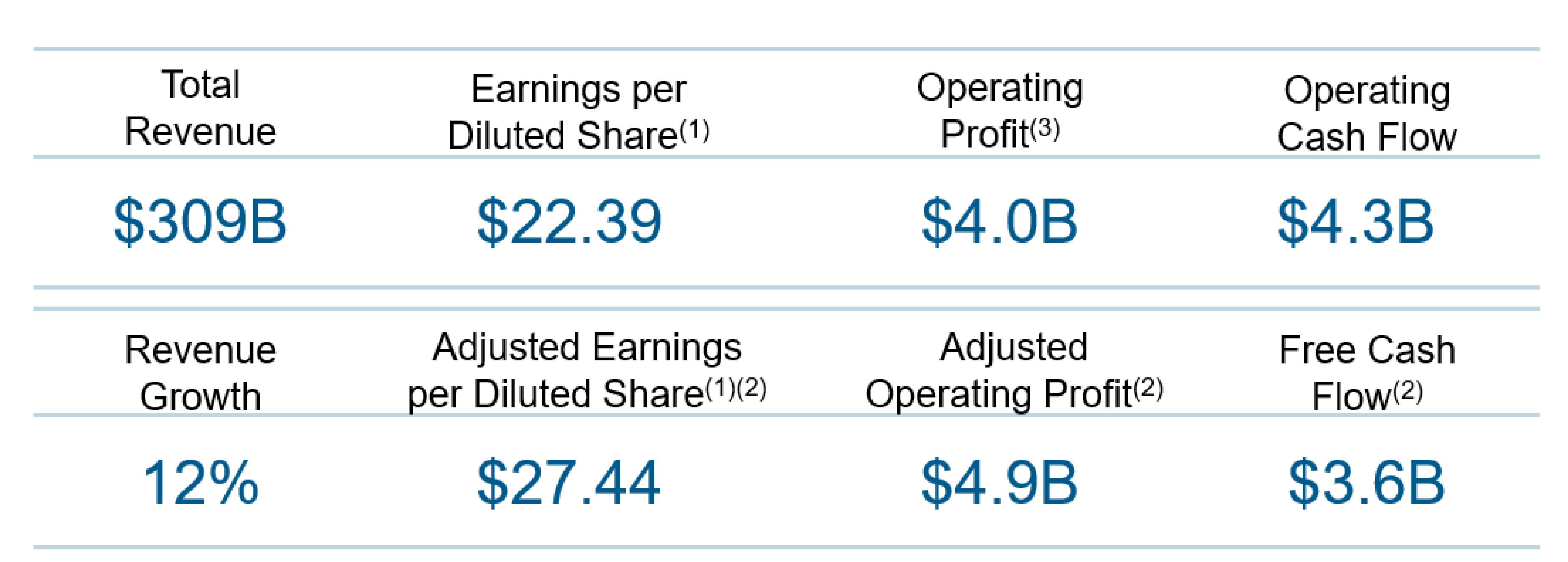
(1)Reflects continuing operations attributable to McKesson, net of tax.
(2)Results are non-GAAP financial measures; refer to the accompanying definitions and reconciliation schedules within Appendix A.
(3)Reflects income from continuing operations before interest expense and income taxes.
In our discussion of executive compensation throughout this proxy statement, we refer to Adjusted Earnings per Diluted Share (Adjusted EPS), Adjusted Operating Profit (AOP), Free Cash Flow (FCF), Return on Invested Capital (ROIC) and Relative Total Shareholder Return (rTSR) as performance metrics specifically used in our incentive programs. In Appendix A to this proxy statement, we provide reconciliations from diluted earnings per share from continuing operations, operating profit and operating cash flow calculated in accordance with U.S. generally accepted accounting principles (GAAP) to the non-GAAP metrics used in calculating performance under our incentive plans. A description of ROIC, a non-GAAP metric, can be found on page 57 of this proxy statement. 2023 Say-on-Pay Vote and Continued Shareholder Engagement
We were pleased that our executive compensation program was approved by shareholders at the 2023 Annual Meeting of Shareholders with approximately 89% of votes cast in favor of our say-on-pay proposal. We received positive feedback from shareholders regarding our pay practices, including our commitment to a pay-for-performance philosophy and our use of at-risk, performance-based compensation tied to key financial and sustainability metrics that align with our business strategy. We appreciate our shareholders’ ongoing support for our executive compensation program.
We are committed to seeking feedback and soliciting input to ensure we meet ongoing shareholder expectations regarding our compensation, sustainability, governance and corporate responsibility practices. As we do every year, our Board undertook a significant engagement effort to receive feedback from shareholders regarding our executive compensation program and other matters of importance to the Company and our shareholders. Since our 2023 Annual Meeting, we proactively reached out to shareholders representing approximately 51% of our outstanding common stock and engaged with shareholders representing approximately 33% of our outstanding common stock. Shareholders voiced broad support for our compensation design, in particular, the recent addition of the downward-only modifier tied to our key sustainability priority areas. Additional information on this modifier can be found on page 55. Our shareholders’ views on executive compensation and corporate governance are important to us, and we value and utilize their feedback and insights each year. The Board and its committees regularly discuss and consider the feedback we receive from shareholders through this engagement process, as well as the outcome of the annual advisory vote on executive compensation. As we continue to execute against our strategy, we look forward to ongoing shareholder engagement, including dialogue focused on our executive compensation program and corporate governance and sustainability practices. Additional information on our shareholder engagement can be found on page 8 of this proxy statement.
Focus on Corporate Culture
At McKesson, the way we do business is just as important as the business itself, so each executive is evaluated on his or her commitment to the Company’s “I2CARE” and “ILEAD” principles. I2CARE is the cultural foundation of the Company. Our I2CARE principles unify the Company and guide individual’s behavior toward each other, customers, vendors and other stakeholders. ILEAD is our common definition and shared commitment to leadership. These leadership principles serve as a guide to all our employees enterprise-wide. By embracing this commitment, we bring out the best in ourselves and our teams to, ultimately, enable McKesson to drive better outcomes for our company, our customers, and the patients we impact for years to come.

Through our best talent strategy, we build successful teams by fostering a culture of inclusion and belonging and believe it is an important element that drives long-term shareholder value. McKesson was recognized for the tenth consecutive year as an “Equality 100 Award Winner” by the Human Rights Campaign Foundation; for the eleventh year in a row as a “Military Friendly Employer” by GI Jobs; and as a “Best Place to Work” for Disability Inclusion on the Disability Equality Index for the eighth consecutive year. Francisco Fraga, our Executive Vice President, Chief Information Officer and Chief Technology Officer, made the “100 Most Influential Hispanic Leaders for Technology” list, by the Hispanic Technology Executive Council (HITEC). In 2023, McKesson was designated by the Age Friendly Institute as a “Certified Age-Friendly Employer.” McKesson was also named to several Seramount lists including: “Best Company for Multicultural Women,” “Top Company for Executive Women,” and a “Leading Inclusion Index Company.” Additionally, in 2024, McKesson was named by Newsweek as one of “America’s Greatest Workplaces for Diversity.” McKesson also participated in the Hispanic Association on Corporate Responsibility (HACR) Inclusion Index and the McKinsey Women in the Workplace and Race in the Workplace studies.
Our vision for a healthier world begins with our employees, who bring our purpose to life every day. As a company, we provide opportunities for growth and development, programs for an inclusive workplace so our employees can be their best, and initiatives that focus on employee health and wellness. We strive to make inclusion and belonging integral to everything we do, because we believe building a more inclusive future is everyone’s responsibility. The Company engaged internal and external experts to help leaders build skills in these and other areas. To keep pace with rapidly evolving business and industry needs, in 2023 we launched digital mindset upskilling to provide opportunities for advancement in key areas of digital acumen. Additionally, in 2024, McKesson was recognized by Fortune as one of “America’s Most Innovative Companies” which reflects our commitment to being at the forefront of product innovation, process innovation, and culture.
Corporate culture is a top priority for Brian Tyler, our CEO, who focuses on talent and performance mindset, emphasizing the importance of an inclusive work setting and winning as one team. Our Compensation and Talent Committee considers executive officers’ efforts on talent and culture matters when determining compensation for our executive officers, including our NEOs.
Executive Transitions during FY 2024
Ms. Schechter. On October 27, 2023, Ms. Schechter, the Company’s Executive Vice President, Chief Legal Officer and General Counsel, gave notice of her intention to retire. On November 1, 2023, we announced that Ms. Lau, former Chief Legal Officer for GoDaddy, was expected to become the Company’s Executive Vice President and Chief Legal Officer, which became effective on January 1, 2024. Ms. Schechter remained with the Company as Board and Enterprise Risk Advisor, assisting with transition activities, until her retirement on June 3, 2024.
Because Ms. Schechter voluntarily retired, she was not entitled to severance benefits. Upon her departure on June 3, 2024, Ms. Schechter satisfied the standard age and service requirements (attainment of age 60 with 10 years of service) to qualify for retirement treatment under the Stock Plans, which is described in more detail under "Benefits and Payments upon Voluntary Termination” on page 79 of this proxy statement. Ms. Lau. In connection with Ms. Lau’s appointment as Chief Legal Officer, the Company entered into an offer letter with Ms. Lau, which provided for:
•Annual base salary of $700,000, to be effective January 1, 2024;
•A target MIP award equal to 100% of her annual base salary pro-rated from her start date to the end of our fiscal year; and
•Target long-term incentive awards of $2,850,000, comprised of 60% PSUs and 40% RSUs.
We determined Ms. Lau's compensation based on competitive market data derived from our Compensation Peer Group, as well as her experience. In addition, the offer letter provided that Ms. Lau receive a one-time sign-on cash award of $1,500,000 within 30 days of her hire date and a sign-on RSU award of $4,000,000 vesting on the first and second anniversaries of the grant date, the sole purpose of these awards being to address compensation forfeited at her prior employer.
Ms. Avila. On September 29, 2023, we announced that Ms. Avila would cease to be Executive Vice President, Chief Information Officer and Chief Technology Officer as of October 2, 2023. Ms. Avila remained with the Company through January 1, 2024, to assist with transition activities. In connection with her involuntary termination without cause on January 1, 2024, Ms. Avila did not receive any additional compensation, benefits or vesting of long-term awards beyond what she was otherwise entitled to under the standard terms of the Company’s Executive Severance Policy, Management Incentive Plan and the Stock Plans. Ms. Avila received 16 months’ salary continuation having an aggregate value of $897,600, a prorated FY 2024 award (based on actual performance) under the Management Incentive Plan, accelerated vesting of RSUs that would have vested within six months following her termination date and continued participation in PSU awards that would have vested within six months of her termination date under the Stock Plans.
Integration of Regulatory, Compliance and Legal Considerations
In 2018, the Compensation and Talent Committee codified its long-standing practice of considering regulatory, compliance and legal issues when making compensation decisions. The Compensation and Talent Committee carefully considered the work that was done to address regulatory, compliance and legal aspects of McKesson’s business during FY 2024. The committee has integrated those considerations into its compensation decisions. The Board’s Compliance Committee, in coordination with the Audit Committee, is actively engaged in overseeing management’s identification and evaluation of principal legal and compliance risks and, as part of its oversight role, reviews the Company’s efforts to foster a culture of compliance, ethics and regulatory excellence. Prior to making its decisions regarding FY 2024 incentive payouts, the Compensation and Talent Committee reviewed the Compliance Committee’s report regarding senior management’s compliance efforts during FY 2024, including the performance of our NEOs. This review was a factor in the Compensation and Talent Committee’s evaluation of executive officer performance with respect to the FY 2024 sustainability priority areas, as discussed on page 55 of this proxy statement.
Best Practices in Compensation Governance
| | | | | | | | | | | |
| What We Do |
| ✓ | Pay for performance | ✓ | Engage with shareholders on matters including executive compensation and governance throughout the year |
| ✓ | Emphasize long-term performance | ✓ | Align plan design with business strategy |
| ✓ | Design with mix of operational and market-based metrics | ✓ | Balance mix of annual and long-term metrics |
| ✓ | Develop sound financial goals | ✓ | Engage independent advisors |
| ✓ | Maintain robust compensation recoupment policies with trigger for reputational harm | ✓ | Review Compliance Committee’s assessment of senior management performance |
| ✓ | Manage use of equity incentive plan conservatively | ✓ | Drive progress on culture and sustainability-related initiatives |
| ✓ | Use double-trigger change in control vesting provisions | ✓ | Review current compensation and estimated separation and change in control benefits |
| ✓ | Maintain rigorous stock ownership guidelines | ✓ | Mitigate undue risk-taking through sound plan design |
| What We Don’t Do |
| Allow directors and executive officers to hedge or pledge Company securities | | Provide excise tax gross-ups on change-in-control payments |
| Re-price or exchange stock options without shareholder approval | | Accrue or pay dividend equivalents during performance periods |
| Provide tax gross-ups on executive perquisites other than for tax equalization and business-related relocation expenses | | Pay above-market interest on deferred compensation |
FY 2024 Pay Elements and Performance Metrics
McKesson’s executive compensation program consists of three direct pay elements — base salary, annual cash incentive and long-term incentives — each of which serves a unique purpose. The metrics below incentivize our executives to focus on operational objectives that are expected to drive shareholder value. All incentives are performance-based, and all long-term incentive (LTI) awards have total performance or vesting periods of three years.
Beginning with FY 2023 Management Incentive Plan (MIP) awards for our executive officers, the Compensation and Talent Committee introduced consideration of the Company’s performance in key sustainability priority areas, which are discussed on page 55 of this proxy statement. This consideration can only be utilized by the committee to adjust payouts downward. In light of the positive feedback we received from shareholders with respect to our sustainability priority areas as well as the other aspects of our executive compensation program, the committee did not make any additional adjustments to the plans for FY 2024. | | | | | | | | | | | | | | |
| Pay Element | | Performance Metric | Rationale | Target Pay |
| Base Salary | | — | Attracts and retains high-performing executives by providing market-competitive fixed pay | — |
Management Incentive Plan (annual cash incentive) | | Adjusted EPS | Rewards operational performance and profitability; important driver of share price valuation and shareholder expectations | 100% — 185% of Base Salary |
| Adjusted Operating Profit | Rewards operational performance and profitability; important driver of share price valuation and shareholder expectations |
| Free Cash Flow | Rewards generating cash to invest in growth and return capital to shareholders; important valuation metric |
| Sustainability
Priority Areas | Ensures sustainability priorities are aligned with business strategic objectives and Company purpose | Discretionary Downward-Only Modifier |
Performance Stock Units (long-term equity incentive) | | 3-Year Cumulative Adjusted EPS | Measures long-term earnings power, drives returns for the Company and directly correlates to share price performance | 60% of Target LTI Value |
| 3-Year Average ROIC | Encourages leaders to make sound investments that generate returns for shareholders; important valuation metric |
| MCK TSR vs. Comparator Group | Rewards share price performance relative to comparator group over time |
Restricted Stock Units (long-term equity incentive) | | — | Directly aligns with value delivered to shareholders | 40% of Target LTI Value |
Target Direct Compensation Mix
Our executive compensation program is predominantly variable and performance-based. As an executive’s ability to impact operational performance increases, so does the proportion of at-risk, variable compensation. Target LTI grows proportionately as job responsibilities increase, which encourages our executive officers to focus on McKesson’s long-term success and aligns with the long-term interests of our shareholders. The graphics below illustrate the mix of fixed and variable compensation, and the annual MIP and LTI compensation opportunities we provided to our CEO and other current NEOs for FY 2024. These graphics also illustrate the proportion of target direct compensation that is based on Company and share price performance.
| | | | | |
| FY 2024 CEO Compensation Mix |
| | | | | |
| FY 2024 Other Current NEOs Compensation Mix |
FY 2024 Target Direct Compensation. The Compensation and Talent Committee established FY 2024 target direct compensation for our current NEOs as shown below. The committee takes a number of factors into consideration when setting total target direct compensation and each of its individual elements, including job responsibilities, time in role, and competitive market data derived from our Compensation Peer Group. Further information on the elements of compensation can be found in the following pages, where each pay element is described in more detail.
| | | | | | | | | | | | | | | | | | | | | | | | | | |
| Name | Base Salary ($)(1) | MIP Target (Annual Incentive) (% of Salary) | MIP Target (Annual Incentive) ($) | | Target Long-Term Incentives | | Total Target Direct Compensation ($) |
| PSUs ($) | RSUs ($) | |
| Brian S. Tyler | 1,500,000 | | 185 | % | 2,775,000 | | | 8,100,237 | | 5,400,171 | | | 17,775,408 | |
| Britt J. Vitalone | 1,000,000 | | 125 | % | 1,250,000 | | | 2,610,358 | | 1,740,038 | | | 6,600,396 | |
Michele Lau(2) | 700,000 | | 100 | % | 700,000 | | | 1,711,187 | | 1,140,070 | | | 4,251,257 | |
| LeAnn B. Smith | 637,500 | | 100 | % | 637,500 | | | 1,200,339 | | 800,040 | | | 3,275,379 | |
| Thomas L. Rodgers | 615,700 | | 100 | % | 615,700 | | | 1,050,534 | | 700,182 | | | 2,982,116 | |
(1)FY 2024 base salary figures shown above are as of the end of FY 2024.
(2)Ms. Lau was appointed to the position of Executive Vice President and Chief Legal Officer, effective January 1, 2024. The FY 2024 base salary and MIP targets shown above represent her target compensation at the end of FY 2024.
Performance-Based Program with Rigorous Targets
Performance Targets Designed to Reward Stretch Performance
Each year, the Board reviews the annual and long-term plans developed by management that are intended to drive operational performance results and shareholder returns. After thorough review and discussion over multiple meetings, the Compensation and Talent Committee establishes performance goals for each of our corporate incentive plans to motivate our leaders to deliver a high degree of business performance, while encouraging prudent risk-taking. We structure performance-based compensation to reward an appropriate balance of short-term and long-term financial and
strategic business results, with an emphasis on managing the business for long-term results and shareholder value creation. Target-setting involves a rigorous planning process that considers McKesson’s strategic objectives, market factors, the competitive environment, alignment to shareholders’ interests and other external factors. The committee also considers growth expectations for our competitors, as well as the market outlook for our industry.
| | | | | | | | | | | |
| Key Considerations in Development of Annual and Long-Term Goals | | |
| |
| | | |
| External Factors | Competitive Environment | McKesson’s Objectives |
•Analyst & Shareholder Expectations •Market Outlook •Tax Policy •Public Policy | •Competitor Performance and Plans •Competitive Landscape •Market Growth •Industry Trends | •Historical Performance and Trends •Long Range Planning •Capital Deployment Opportunities •Long Range Corporate Strategy |
| | | |
Target Setting for Annual Plans
We set rigorous annual goals based on Company and industry outlooks for the year, historical and projected growth rates for McKesson and its peers, and performance expectations from investors and equity and credit analysts. The annual incentive plan aligns with the Board-approved annual operating plan and is designed so that target payout requires achievement of a high degree of business performance, while encouraging prudent risk-taking. Financial goals for our annual plans consider capital deployment decisions and are aligned with progress toward our long-term plan. The Company’s annual operating plan serves as the basis of the annual earnings guidance we communicate to investors. The annual operating plan contemplates the prior year’s results and the anticipated business environment. Our projected earnings growth reflects market conditions, which also affect our peer group and analyst forecasts. Cash flow goals are set by focusing on working capital efficiency, operating plans by business unit, and other cash sources and uses, including interest and income taxes. We established performance targets for FY 2024 that reflect the following:
•Adjusted EPS and Adjusted Operating Profit targets were set to achieve growth of 14% and 7%, respectively, over FY 2023 results when excluding the impact of COVID-19 related items and the European business operations and completed divestitures; and
•Free Cash Flow target was set in line with the FY 2024 external guidance range, reported at the end of FY 2023, and is consistent with the Company’s five-year historical average.
Our executive officers’ FY 2024 annual incentive plan also included the Compensation and Talent Committee’s discretionary consideration of progress on key sustainability priority areas (for downward-only adjustment of payouts) in order to ensure our sustainability priorities are aligned with business strategic objectives and our Company purpose, which the committee believes will create long-term shareholder value.
Consistent with prior years, our FY 2024 annual incentive plan targets assumed capital deployment in the form of share repurchases and considered analyst expectations for growth and peer companies’ publicly disclosed performance as well as public policy.
Target Setting for Long-Term Plans
The Company’s three-year plan, which is reviewed by the Board each year, considers business strategies that will take longer than 12 months to accomplish and reflects capital deployment, including projected acquisitions, along with other external, public policy and competitive risks, opportunities and challenges. Our FY 2022 – FY 2024 PSU awards were based on three-year Cumulative Adjusted EPS, three-year average ROIC, and TSR performance relative to a comparator group of companies (rTSR). The Compensation and Talent Committee chose Cumulative Adjusted EPS to evaluate performance because it serves as an operational metric – including operating profit growth, tax strategy and capital deployment – that directly correlates to share price performance. Adjusted EPS is also the key metric underpinning our guidance to investors. ROIC encourages leaders to make sound investments that generate strong returns for shareholders. For the portion of PSU awards tied to rTSR performance, payout at target level continues to require above-median performance at the 55th percentile of the rTSR comparator group. In addition, the number of shares earned for the rTSR portion of the award is capped at the target amount if absolute TSR is negative during the three-year performance period. No shares are earned for the rTSR portion of the award if rTSR for the three-year period falls below the 35th percentile of the rTSR comparator group.
Each Compensation Element Serves a Unique Purpose
Our executive compensation program seeks to motivate our executive officers, and to reward them when they meet and exceed challenging business goals and deliver sustained performance growth. McKesson’s executive compensation program consists of four compensation elements, each of which serves a unique purpose. We provide three direct compensation elements: base salary, annual cash incentive and long-term incentives. The fourth element consists of other compensation and benefits (for example, limited perquisites, severance and change in control benefits). Our incentive plans incorporate metrics that we believe are the key measures of our success and will drive long-term shareholder returns.
We focus on Adjusted EPS in our incentive plans because earnings per share is one of the principal measures used by investors to assess financial performance results and establish a price for the Company’s equity, and it is a central component of our guidance to investors. Adjusted EPS aligns our executives’ interests with the broader set of strategic objectives they are tasked to manage, keeping enterprise value and shareholder interests at the forefront of management decisions on both a short- and long-term basis. Accordingly, given that an increase in Adjusted EPS can drive an increase in shareholder value, the Compensation and Talent Committee determined it was important to include Adjusted EPS as a key component of both our annual and long-term incentives.
Annual Compensation
Annual compensation is delivered in cash with a substantial portion at-risk and contingent on the successful accomplishment of pre-established performance targets.
Base Salary
Base salary is the only fixed component of our executive officers’ total cash compensation and is intended to provide market-competitive pay to attract and retain executives. When considering whether to increase a NEO’s base salary, the Compensation and Talent Committee takes into account competitive market data derived from our Compensation Peer Group as well as the individual’s performance and experience. Following a comprehensive review, the committee approved base salary increases for our NEOs, effective June 1, 2023.
The table below summarizes FY 2023 and FY 2024 base salaries for our current NEOs.
| | | | | | | | |
| Name | FY 2023 Annual Base Salary(1) ($) | FY 2024 Annual Base Salary(1) ($) |
| Brian S. Tyler | 1,440,000 | | 1,500,000 | |
Britt J. Vitalone(2) | 875,000 | | 1,000,000 | |
Michele Lau(3) | — | | 700,000 | |
| LeAnn B. Smith | 625,000 | | 637,500 | |
| Thomas L. Rodgers | 592,000 | | 615,700 | |
(1)FY 2023 and FY 2024 base salary figures shown above are as of fiscal year end.
(2)In November 2023, Mr. Vitalone received a base salary increase in connection with the expansion of his role to include leadership of McKesson Technology and mergers and acquisitions.
(3)Ms. Lau became an executive officer on January 1, 2024, and did not have base salary at the end of FY 2023.
Management Incentive Plan
Overview. The Management Incentive Plan (MIP) is our enterprise annual cash incentive plan. MIP awards are conditioned on the achievement of Company financial and operational performance goals. The maximum MIP payout for executive officers is 200% of target. MIP financial, operational and sustainability priorities are established shortly after the beginning of the fiscal year. Consistent with FY 2023, our executive officers' FY 2024 MIP awards include the Compensation and Talent Committee’s discretionary consideration of the Company’s progress on the key sustainability priority areas discussed below. Based on a competitive market assessment, the Compensation and Talent Committee determined to adjust Mr. Tyler's MIP opportunity to 185% of his base salary and Mr. Vitalone’s MIP opportunity to 125% of his base salary, each beginning in FY 2024.
FY 2024 MIP Performance Metrics. In May 2023, the Compensation and Talent Committee selected Adjusted EPS, Adjusted Operating Profit and Free Cash Flow as the financial metrics for the FY 2024 MIP, the same metrics used for the prior fiscal year, as they are key areas of focus to drive our near-term success and advance our long-term strategy. The Compensation and Talent Committee aligned FY 2024 MIP targets to our Adjusted EPS outlook. For additional information about target setting for MIP, please refer to "Target Setting for Annual Plans" on page 53.The following summarizes our FY 2024 MIP financial performance metrics: •Adjusted EPS (50% of award). Adjusted EPS is an important driver of share price valuation and shareholder expectations. Consistent with prior years, our FY 2024 targets assumed, among other things, capital deployment in the form of share repurchases. The Compensation and Talent Committee applied an Adjusted EPS result of $27.44 for purposes of calculating FY 2024 MIP payouts. A related metric, three-year Cumulative Adjusted EPS, is used as a metric for Performance Stock Units. Adjusted EPS is highly relevant in both short- and long-term contexts, and the Compensation and Talent Committee believes it is useful to measure Adjusted EPS across both periods with greater economic opportunity in the long-term portion of the program to ensure that short-term gains are not sought at the expense of long-term performance. See Appendix A to this proxy statement for a reconciliation of diluted earnings per share from continuing operations as reported under U.S. generally accepted accounting principles (GAAP) to the Adjusted EPS result used for incentive payout purposes.
•Adjusted Operating Profit (25% of award). Adjusted Operating Profit (AOP) rewards focus on operational performance and profitability. The Compensation and Talent Committee applied an AOP result of $4,901 million for purposes of calculating the FY 2024 MIP payouts. See Appendix A to this proxy statement for a reconciliation of operating profit as reported under U.S. GAAP to the AOP result used for incentive payout purposes.
•Free Cash Flow (25% of award). Free Cash Flow (FCF) provides the basis for our disciplined approach to capital deployment. For purposes of calculating FY 2024 MIP payouts, the Compensation and Talent Committee applied a FCF result of $3,627 million. Cash flow is highly relevant in both short- and long-term contexts, as it measures effective generation and management of cash. See Appendix A to this proxy statement for a reconciliation of operating cash flow as reported under U.S. GAAP to the FCF result used for incentive payout purposes.
FY 2024 Sustainability Priority Areas. Fostering a culture of environmental awareness, social responsibility, and sound and effective governance has long been a priority for McKesson. Beginning in FY 2023, our executive officers’ MIP awards may be adjusted downward based on the Compensation and Talent Committee’s discretionary consideration of the Company’s progress on key sustainability priority areas.
As a company, we take a holistic approach to sustainability matters. Our goal is to build long-term value for the Company’s shareholders and strengthen the culture of the Company through monitoring our overall performance with respect to certain sustainability matters. We strongly believe that this starts at the top, with our executive officers focusing on these key objectives.
In May 2023, considering McKesson’s strategic business objectives and our Company purpose of Advancing Health Outcomes for All®, the Compensation and Talent Committee selected the following sustainability objectives for discretionary consideration and potential adjustment (downward only) of FY 2024 MIP payouts for our executive officers, including our NEOs:
•Establishment of our enterprise environmental targets roadmap and implementation of our environmental measurement tool;
•Advancement of our best talent strategy as measured by engagement and inclusion scores from our Employee Opinion Survey and diverse representation; and
•Successful fulfillment of our executive officers’ governance duties to prioritize regulatory excellence, risk management, compliance and ethics.
In light of McKesson’s focus on advancing our sustainability priorities, the Compensation and Talent Committee determined, when incorporating the sustainability priority areas into executive officers' MIP awards, that their discretion in considering success against these objectives would only be used to adjust MIP payouts downward in the event executive officers fail to meet the key objectives in these areas.
Following a comprehensive review of executive officer performance in the selected sustainability priority areas, the Compensation and Talent Committee determined that our executive officers largely met the FY 2024 sustainability objectives; therefore, they determined not to make a downward adjustment to the FY 2024 MIP payouts.
FY 2024 MIP Payout Formula. Based on these results, our NEO participants received 114% of their FY 2024 MIP target awards. As is the case for all of the Company’s performance-based payout scales, when a result falls between reference points, we use linear interpolation to determine the result.

In determining the Company’s performance for purposes of payouts under our incentive plans, the Compensation and Talent Committee has discretion to include or exclude special charges or unusual and infrequent items incurred during the performance period if it determines that such adjustments are appropriate. On a quarterly basis, the committee reviews reconciliations of non-GAAP to GAAP financial results. As part of its fiscal year-end approval of executive incentive compensation, the committee considers a number of factors, including but not limited to, the magnitude and impact of the special charge and whether the special charge is: (i) nonrecurring or unforeseeable, (ii) attributable to unexpected circumstances beyond the control of management, and/or (iii) reflective of the Company’s underlying operating performance.
Rite Aid Bankruptcy. During FY 2024, the Compensation and Talent Committee considered the Rite Aid bankruptcy and its financial impact when determining incentive compensation payouts. The committee concluded that the impacts of the Rite Aid bankruptcy should be excluded from the non-GAAP earnings results for incentive compensation purposes (the Adjusted EPS and AOP metrics), consistent with how these results were reported publicly in the Company's FY 2024 quarterly earnings releases. The committee deemed the Rite Aid bankruptcy as an unusual, discrete event unrelated to normal operations.
Results for the three metrics in the MIP are shown below:
(1)The FY 2024 MIP non-GAAP financial metrics shown above generally exclude the impact of items that are included in our GAAP financial measures, such as amortization of acquisition-related intangibles, transaction-related expenses and adjustments, LIFO inventory-related adjustments, gains from antitrust legal settlements, restructuring, impairment, and related claims, net litigation recoveries or charges, and other adjustments. See Appendix A to this proxy statement for detailed reconciliations of the GAAP to non-GAAP metrics used for incentive payout purposes.
The table below summarizes MIP payouts to our current NEOs for FY 2024:
| | | | | | | | | | | | | | | | | | | | | | | | | | | | | | | | | | | | | | | | | | | | | | | |
| | | | | | | | MIP Payout Earned = 114% | | | |
| Name | Eligible Earnings ($)(1) | X | MIP Target (%) | = | MIP Target Award ($) | X | | Adjusted EPS Result (%) 50% Weight | + | AOP
Result
(%)
25% Weight | + | FCF
Result
(%)
25% Weight | | = | FY 2024 MIP Payout ($) |
| Brian S. Tyler | 1,490,000 | | | 185 | % | | 2,756,500 | | | | 122 | % | | 111 | % | | 100 | % | | | 3,142,410 | |
| Britt J. Vitalone | 937,500 | | | 125 | % | | 1,171,875 | | | | 122 | % | | 111 | % | | 100 | % | | | 1,335,938 | |
Michele Lau(2) | 175,000 | | | 100 | % | | 175,000 | | | | 122 | % | | 111 | % | | 100 | % | | | 199,500 | |
| LeAnn B. Smith | 635,418 | | | 100 | % | | 635,418 | | | | 122 | % | | 111 | % | | 100 | % | | | 724,377 | |
| Thomas L. Rodgers | 611,750 | | | 100 | % | | 611,750 | | | | 122 | % | | 111 | % | | 100 | % | | | 697,395 | |
(1)Eligible earnings refers to regular wages earned by and paid to the NEO during the fiscal year, excluding certain items such as earnings received during a paid leave.
(2)Ms. Lau’s FY 2024 eligible earnings were prorated to reflect her January 1, 2024 hire date.
Long-Term Incentive Compensation
Long-term incentive (LTI) compensation is a critical component of our executive compensation program. It is in our shareholders’ interests that our executives foster a long-term view of the Company’s financial results. Long-term incentives are also an important retention tool that management and the Compensation and Talent Committee use to align the financial interests of executives and other key contributors with sustained shareholder value creation.
For FY 2024, the Company’s LTI compensation program for NEOs included two awards:
•Performance Stock Units (60% of target LTI value)
•Restricted Stock Units (40% of target LTI value)
Performance Stock Unit Program
Overview. The Performance Stock Unit (PSU) program is a long-term equity incentive program with payouts conditioned on achievement against pre-established performance goals. A new three-year performance period begins each fiscal year, and PSU performance goals and the target awards for our executive officers are established shortly after the beginning of the performance period.
FY 2022 — FY 2024 PSU Performance Metrics. In May 2021, the Compensation and Talent Committee established three-year Cumulative Adjusted EPS, three-year average Return on Invested Capital (ROIC) and the Company’s Total Shareholder Return (TSR) relative to a comparator group as the performance metrics for FY 2022 — FY 2024 PSU payouts. For additional information about target setting for the PSU program, please refer to "Target Setting for Long-Term Plans" on page 53. The following summarizes our FY 2022 — FY 2024 PSU performance metrics: •Cumulative Adjusted EPS (50% of payout). Cumulative Adjusted EPS was selected as a metric because of the importance of earnings as a driver of share price valuation and shareholder expectations. Consistent with prior performance periods, our Cumulative Adjusted EPS target assumed, among other things, capital deployment in the form of share repurchases. For FY 2022 — FY 2024, the Compensation and Talent Committee applied a Cumulative Adjusted EPS result of $79.17 for purposes of calculating PSU payouts. A related metric, one-year Adjusted EPS, is used as a metric for the Management Incentive Plan. Adjusted EPS is highly relevant in both short- and long-term contexts, and the Compensation and Talent Committee believes it is useful to measure Adjusted EPS across both periods, with greater economic opportunity in the long-term portion of the program to ensure that short-term gains are not sought at the expense of long-term performance. See Appendix A to this proxy statement for a reconciliation of diluted earnings per share from continuing operations as reported under U.S. GAAP to the Adjusted EPS result used for incentive payout purposes.
•Average ROIC (25% of payout). Return on Invested Capital (ROIC) measures the Company’s ability to create value by generating a return that is above our weighted average cost of capital. ROIC encourages leaders to make sound investments that generate strong returns for shareholders. Adjusted three-year average ROIC measures, as a percentage, the average of our annual after-tax adjusted operating income divided by invested capital over the
three-year performance period. For FY 2022 — FY 2024, the Compensation and Talent Committee applied a three-year average ROIC result of 17.54% for purposes of calculating PSU payouts.
•Total Shareholder Return (25% of payout). TSR is calculated as share price appreciation (or reduction) over the performance period, including reinvestment of dividends when paid, divided by the share price at the beginning of the period; provided, that the stock price we use at the beginning and at the end of the period is the average closing price of Company common stock over the 30-day period preceding the applicable date. At the end of the performance period, performance is determined by ranking the Company’s TSR against the TSR of the companies in our FY 2022 — FY 2024 relative TSR comparator group, described below. Payout at target level continues to require above-median performance at the 55th percentile of the relative TSR comparator group. In addition, for the relative TSR portion of the award, the number of shares earned is capped at the target amount if absolute TSR is negative during the three-year performance period. No shares are earned for the relative TSR portion of the award if McKesson’s TSR for the three-year period falls below the 35th percentile of the relative TSR comparator group. Upon certification of the result, participants receive shares of Company common stock if the performance threshold is met. For FY 2022 — FY 2024, the Company’s TSR was at the 100th percentile relative to our relative TSR comparator group over the three-year period ending March 31, 2024, and the Compensation and Talent Committee applied this result for purposes of calculating PSU payouts.
FY 2022 — FY 2024 PSU Payout Formula. Based on these results, our NEO participants received 200% of their FY 2022 — FY 2024 PSU target awards. When a metric’s result falls between reference points, we use linear interpolation to determine the result. Ms. Lau joined McKesson during FY 2024 and was not awarded FY 2022 — FY 2024 PSUs.
Results for the three metrics in the PSUs are shown below:
The table below summarizes PSU payouts for our current NEOs for the FY 2022 — FY 2024 performance period:
| | | | | | | | | | | | | | | | | | | | | | | | | | | | | | | | | | | |
| | | | PSU Payout Earned: 200% | | | |
Name(1) | FY 2022 — FY 2024 Target PSUs (#) | X | | Cumulative
Adjusted EPS
Result
(%)
50% Weight | + | Average
ROIC
Result
(%)
25% Weight | + | Relative TSR Result (%) 25% Weight | | = | FY 2022 — FY 2024 Earned PSUs (#) |
| Brian S. Tyler | 36,013 | | | | 200 | % | | 200 | % | | 200 | % | | | 72,026 | |
| Britt J. Vitalone | 10,290 | | | | 200 | % | | 200 | % | | 200 | % | | | 20,580 | |
LeAnn B. Smith(2) | 995 | | | | 200% (67% Weight) | | 200% (33% Weight) | | N/A | | | 1,990 | |
| Thomas L. Rodgers | 3,823 | | | | 200 | % | | 200 | % | | 200 | % | | | 7,646 | |
(1)Ms. Lau joined McKesson during FY 2024 and was not granted a FY 2022 — FY 2024 PSU target award.
(2)In May 2021, prior to becoming an executive officer, Ms. Smith was awarded FY 2022 — FY 2024 PSUs with performance metrics consisting of 67% Cumulative Adjusted EPS and 33% Average ROIC.
FY 2022 — FY 2024 Relative TSR Comparator Group. For the FY 2022 — FY 2024 PSU awards, the Compensation and Talent Committee approved a relative TSR comparator group originally comprised of 14 public companies that served as a representative index of our most direct competitors and healthcare supply chain indicator companies. One company was subsequently removed from the comparator group due to a corporate transaction, reducing the comparator group to 13 companies. The committee reaffirmed that this comparator group of companies more closely aligns with our core business operations than the Compensation Peer Group listed on page 63, which more closely aligns with the market for our executive talent. The relative TSR comparator group includes seven companies in the Compensation Peer Group that are considered McKesson’s most direct competitors based on their talent pool, size and business focus, as well as six companies that are not viewed as competitors for talent, but are in at least two of the following categories: (i) companies with extensive business overlap; (ii) companies with similar market exposure; (iii) the largest pure play manufacturers representative of the pharmaceutical industry; and/or (iv) manufacturers with large generic pharmaceutical market presence.
These criteria help ensure that our relative TSR comparator group serves as a diversified representation of companies in McKesson’s supply chain and broader healthcare platforms and acts as an appropriate gauge of overall Company performance.
| | | | | | | | | | | |
FY 2022 — FY 2024 Relative TSR Comparator Group(1) | | |
| |
| | | |
| Cardinal Health (CAH) | Kroger (KR) | Teva Pharmaceutical (TEVA) |
| Cencora (COR) | Owens & Minor (OMI) | Viatris (VTRS) |
| CVS Health (CVS) | Pfizer (PFE) | Walgreens Boots Alliance (WBA) |
| Henry Schein (HSIC) | Rite Aid (RAD)(2) | |
| Johnson & Johnson (JNJ) | Sanofi (SNY) | |
(1)The comparator group includes seven companies that are also included in the Compensation Peer Group.
(2)In October 2023, Rite Aid filed for bankruptcy protection. Based on McKesson's peer ranking methodology, Rite Aid was considered a relevant data point and was included in the FY 2022 — FY 2024 relative TSR comparator group.
FY 2024 — FY 2026 PSU Performance Metrics. PSUs comprise 60% of the target LTI awards granted in FY 2024 and will be earned based on Cumulative Adjusted EPS (50%), three-year average Return on Invested Capital (ROIC) (25%) and TSR relative to a comparator group (25%). The Compensation and Talent Committee believes that the combination of Cumulative Adjusted EPS, three-year average ROIC and relative TSR will drive value creation and ensure alignment with shareholders. Beginning with the FY 2023 — FY 2025 PSU awards, the Compensation and Talent Committee, in consultation with its independent compensation consultant, updated the relative TSR comparator group to remove Rite Aid (RAD) and add Cigna (CI), Elevance Health (ELV) and UnitedHealth Group (UNH) to the companies listed in the FY 2022 — FY 2024 Relative TSR Comparator Group table above. The committee believes the resulting 15 companies in the group represent our most direct competitors and healthcare supply chain indicator companies for the FY 2024 — FY 2026 performance period. The Company must achieve above-median performance (55th percentile) relative to the comparator group to earn a target payout for the relative TSR portion of the award. If the Company’s TSR is negative for the performance period, then the relative TSR result is capped at target regardless of ranking relative to the comparator group. No shares are earned for the relative TSR portion of the award if the Company’s TSR for the three-year period falls below the 35th percentile. The payout formula illustrated below applies to our NEOs:

We generally do not disclose forward-looking goals for our multi-year incentive programs, because the Company does not provide forward-looking guidance to our shareholders with respect to multi-year periods, and it is competitively sensitive information. Consistent with our past and current practice, we will disclose multi-year performance goals in our regular programs in full after the close of the performance period.
FY 2024 — FY 2026 Performance Stock Unit Awards. At its May 2023 meeting, following a review of all direct compensation components and market data derived from our Compensation Peer Group, the Compensation and Talent Committee approved FY 2024 — FY 2026 PSU target awards for our current NEOs as follows:
| | | | | | | | |
| Name | FY 2024 — FY 2026 PSUs (#) | FY 2024 — FY 2026 PSU Grant Value ($)(1) |
| Brian S. Tyler | 19,084 | | 8,100,237 | |
| Britt J. Vitalone | 6,150 | | 2,610,358 | |
Michele Lau(2) | 3,051 | | 1,711,187 | |
| LeAnn B. Smith | 2,828 | | 1,200,339 | |
| Thomas L. Rodgers | 2,475 | | 1,050,534 | |
(1)A portion of the grant date fair value of PSU awards was determined by an independent third party using a Monte Carlo simulation model because the performance goals applicable to the PSU awards include a combination of operational and market-based (rTSR) criteria.
(2)Ms. Lau's FY 2024 — FY 2026 PSU awards were granted in February 2024, which was the first date following her January 1, 2024 hire date on which awards could be granted in compliance with McKesson's equity grant policy.
Restricted Stock Units
Overview. Restricted Stock Unit (RSU) awards are time-vested equity grants that generally vest one-third on each of the first three anniversaries of the grant date. RSU awards directly align the interests of executives with those of shareholders by tying long-term incentive compensation value to Company share price performance. The Compensation and Talent Committee determines the proportion of total target long-term incentives that will be awarded as RSUs by considering the balance of cash and equity in our annual and long-term incentive plans, our strategic and operational objectives, our NEOs' responsibilities, a review of similar grants made at companies in our Compensation Peer Group and other factors the committee deems relevant.
FY 2024 Restricted Stock Unit Awards. At its May 2023 meeting, following a review of all direct compensation components and market data derived from our Compensation Peer Group, the Compensation and Talent Committee granted FY 2024 RSU awards to our current NEOs as follows:
| | | | | | | | |
| Name | FY 2024 RSUs (#) | FY 2024 RSU Grant Value ($)(1) |
| Brian S. Tyler | 13,736 | | 5,400,171 | |
| Britt J. Vitalone | 4,426 | | 1,740,038 | |
Michele Lau(2) | 2,274 | | 1,140,070 | |
| LeAnn B. Smith | 2,035 | | 800,040 | |
| Thomas L. Rodgers | 1,781 | | 700,182 | |
(1)The RSUs awarded in May 2023 were granted at a fair market value of $393.14 per unit.
(2)In February 2024, Ms. Lau was awarded 2,274 RSUs as part of her annual LTI award at a fair market value of $501.35 per unit. To address compensation forfeited at her prior employer, Ms. Lau was also awarded 7,979 RSUs (vesting 50% on each of the first and second anniversaries of the grant date) as part of her sign-on equity award, which are excluded from the table above.
Other Compensation and Benefits
The Company provides an array of benefits to all employees. These benefits are comparable to those offered by employers in our industry and geographic footprint, including a competitive suite of health and life insurance and retirement benefits. In providing these benefits, both management and the Compensation and Talent Committee determined that they are appropriate for the attraction and retention of talent. In addition to the discussion of benefits below, the compensation associated with these benefits is described in footnote 4 to the 2024 Summary Compensation Table.
The Company offers two voluntary nonqualified, unfunded deferred compensation plans: (i) the Supplemental Retirement Savings Plan (SRSP) and (ii) the Deferred Compensation Administration Plan III (DCAP III). The SRSP is offered to all employees, including executive officers, who may be impacted by compensation limits that restrict participation in the McKesson Corporation 401(k) Retirement Savings Plan (401(k) Plan). Participation in DCAP III is offered to all senior-level management and executive-level employees, including our executive officers, and certain additional categories of senior-level professionals who are highly compensated employees.
Our employees, including our executive officers, are eligible to participate in the McKesson Foundation’s Matching Gifts Program. Under this program, employee gifts to schools, educational associations or funds and other public charitable organizations are eligible for a foundation match. In addition, under the Board Service Grant Program, our employees, including our executive officers, may apply to the foundation for an annual gift in recognition of their service on the board of such an organization. All of McKesson’s employees in the U.S. and Canada may also request a matching contribution, without limitation, under the McKesson Foundation’s Disaster Relief matching program, which matches contributions made to applicable public charitable organizations.
A limited number of other benefits are provided to executive officers, because it is customary to provide such benefits or in the best interest of the Company and its shareholders to do so. We pay for executive health services, including annual physical examinations, for our executive officers and their spouses (the spousal benefit was discontinued effective April 1, 2024).
The Company provides security services for our CEO, which the Board has determined are reasonable, necessary, and in the best interest of the Company and its shareholders. During FY 2024, we engaged an independent security consultant to conduct a comprehensive study of our security program. Considering the Company’s size, profile, its business activities, as well as safety concerns arising directly as a result of our executive officers' roles at the Company, the independent consultant advised that the security measures currently in place with respect to our executive officers continued to be appropriate. Accordingly, our Executive Officer Security Policy requires our CEO to use the corporate aircraft for both business and personal use. The security services provided to our CEO also include the installation of home security systems and equipment; however, beginning with FY 2021, Mr. Tyler assumed the cost of ongoing home security monitoring. We do not reimburse our NEOs for taxes due on imputed income for items or services provided under the Executive Officer Security Policy. In accordance with SEC disclosure rules, the aggregate incremental cost of these services is reported in the 2024 Summary Compensation Table.
Compensation Peer Group
Peer Selection Process
Each year, the Compensation and Talent Committee determines which companies best reflect McKesson’s competitors for customers, shareholders and talent. A key objective of our executive compensation program is to ensure that the total compensation package we provide to our executive officers is competitive with the companies we compete against for executive talent. The Compensation and Talent Committee consults with its independent compensation consultant to develop a compensation peer group of companies to serve as the basis for comparing McKesson’s executive compensation program to the market. The Compensation and Talent Committee uses the guiding principles and questions below as a foundational tool to determine McKesson’s Compensation Peer Group.
| | | | | | | | |
Guiding Principles for McKesson Peer Selection | |
|
| | |
Consider Industry to identify companies with similar business model or philosophy •Start with direct distribution peers in the healthcare industry •Expand to other healthcare peers that might interact with McKesson in its value supply chain •Extend search to non-healthcare peers with operationally similar business models (i.e., companies that have a manufacturing, distribution, wholesale and/or retail component) Consider Size to ensure companies are similar in scope Consider other Business Characteristics to identify publicly traded companies headquartered in the U.S. |
| | |
| | | | | | | | |
| Questions Addressed in Developing an Effective Peer Group | |
|
| | |
| Who are key performance comparators? | •Who is McKesson competing against for customers? •Which companies have similar market demands and influences? |
| | |
| | |
| Who are closest competitors for talent? | •Which companies might try to recruit from McKesson? •If McKesson had to replace the executive team, from which companies might it recruit to attract executives with similar capabilities? |
| | |
| | |
| Who are the peers from an external perspective? | •Who is McKesson competing against for shareholders? •Who do key analysts name as peers? •Who do current peers name as peers? |
| | |
FY 2024 Compensation Peer Group and How We Used the Data
As our Company has few direct business competitors, it is difficult to create a peer group based on industry codes, revenues, or market capitalization alone. The Compensation and Talent Committee strives to develop a peer group that best reflects all aspects of McKesson’s complex business. For FY 2024, the committee and its independent compensation consultant used a value supply chain framework to identify companies that may compete with McKesson for executive talent. McKesson’s peers include the following: (i) healthcare companies that may compete or interact with McKesson’s supply chain; (ii) non-healthcare companies that are operationally similar to McKesson or other companies in its supply chain; and (iii) managed care companies.
The committee then considered factors such as revenue and market capitalization to derive an appropriate number of peers within our value supply chain framework. The committee believes our diverse selection of peer group companies provides a better understanding of the evolving and competitive marketplace for executive talent.
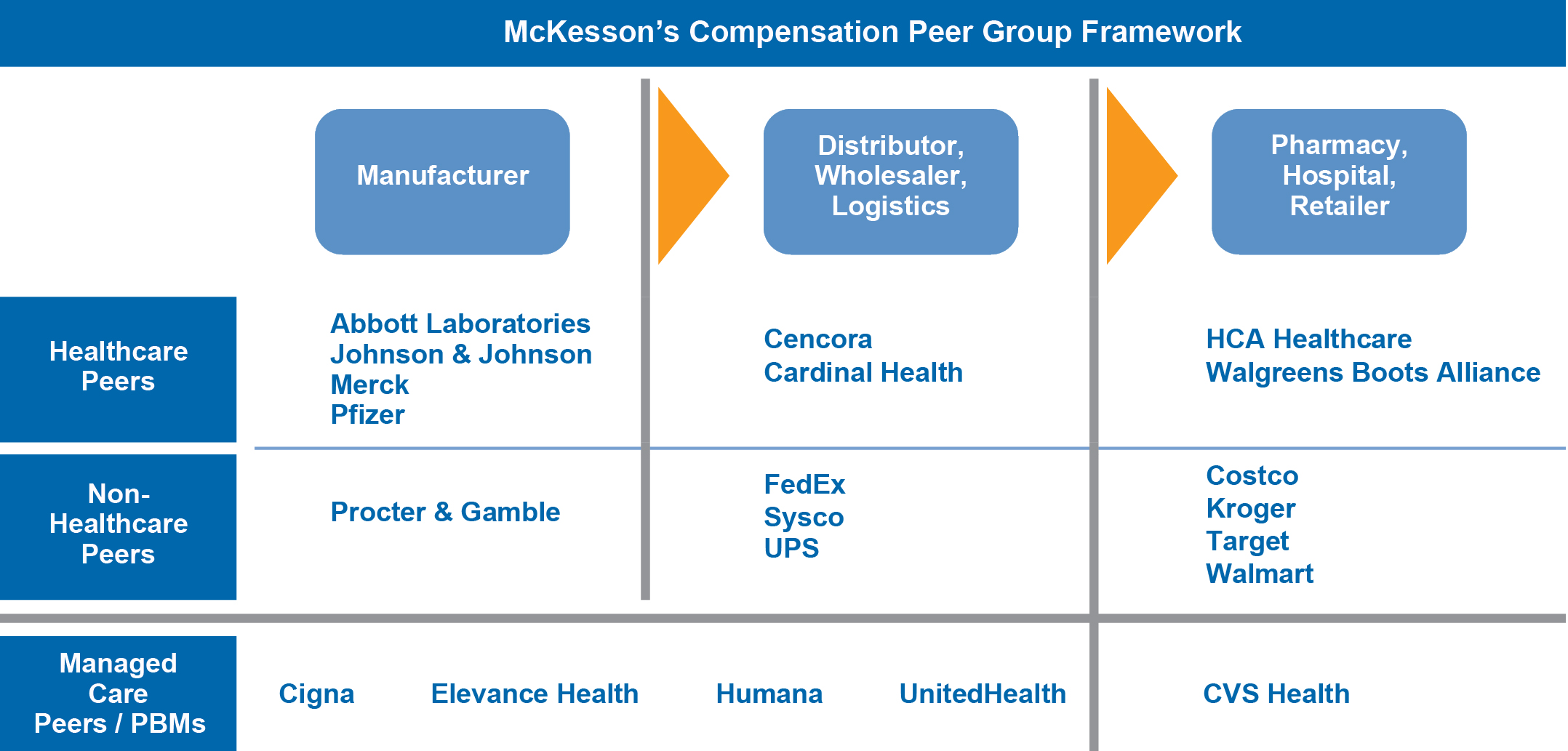
The Compensation and Talent Committee used data derived from our Compensation Peer Group to inform its decisions about overall compensation, compensation elements, optimum pay mix and the relative competitive landscape of our executive compensation program. The committee used multiple reference points when establishing target compensation levels. The committee did not strive to benchmark any individual compensation component or compensation in the aggregate to be at any specific percentile level relative to the market. Our 21 peer companies below are sorted by revenue and market capitalization. They reflect the Compensation Peer Group utilized by the Compensation and Talent Committee at its May 2023 meeting, when it established FY 2024 target direct compensation for our executive officers. To ensure a robust and balanced Compensation Peer Group, select peers fall outside of our preferred market capitalization range due to the difficulty in finding peers of larger revenue with similar business characteristics.
FY 2024 COMPENSATION PEER GROUP
(1)Revenues are stated in billions for the most recently completed fiscal year as publicly reported by each company as of June 5, 2024.
(2)Market capitalizations are stated in billions as of March 28, 2024, the last trading day of our fiscal year.
Independent Review Process
The Compensation and Talent Committee sets performance goals, payout scales and target award levels for executive officers. The committee also determines incentive payouts for the prior fiscal year based on actual results against performance goals. While performance goals and payout scales are initially developed by senior management and driven by the Board-approved, one-year operating plan and the rolling three-year strategic plan reviewed with the Board, the Compensation and Talent Committee has the authority to approve, modify or amend management’s performance goals and payout scale recommendations. Performance goals are selected to be consistent with the operating and strategic plans reviewed, challenged and approved by the Board and information routinely communicated to employees or shareholders by management.
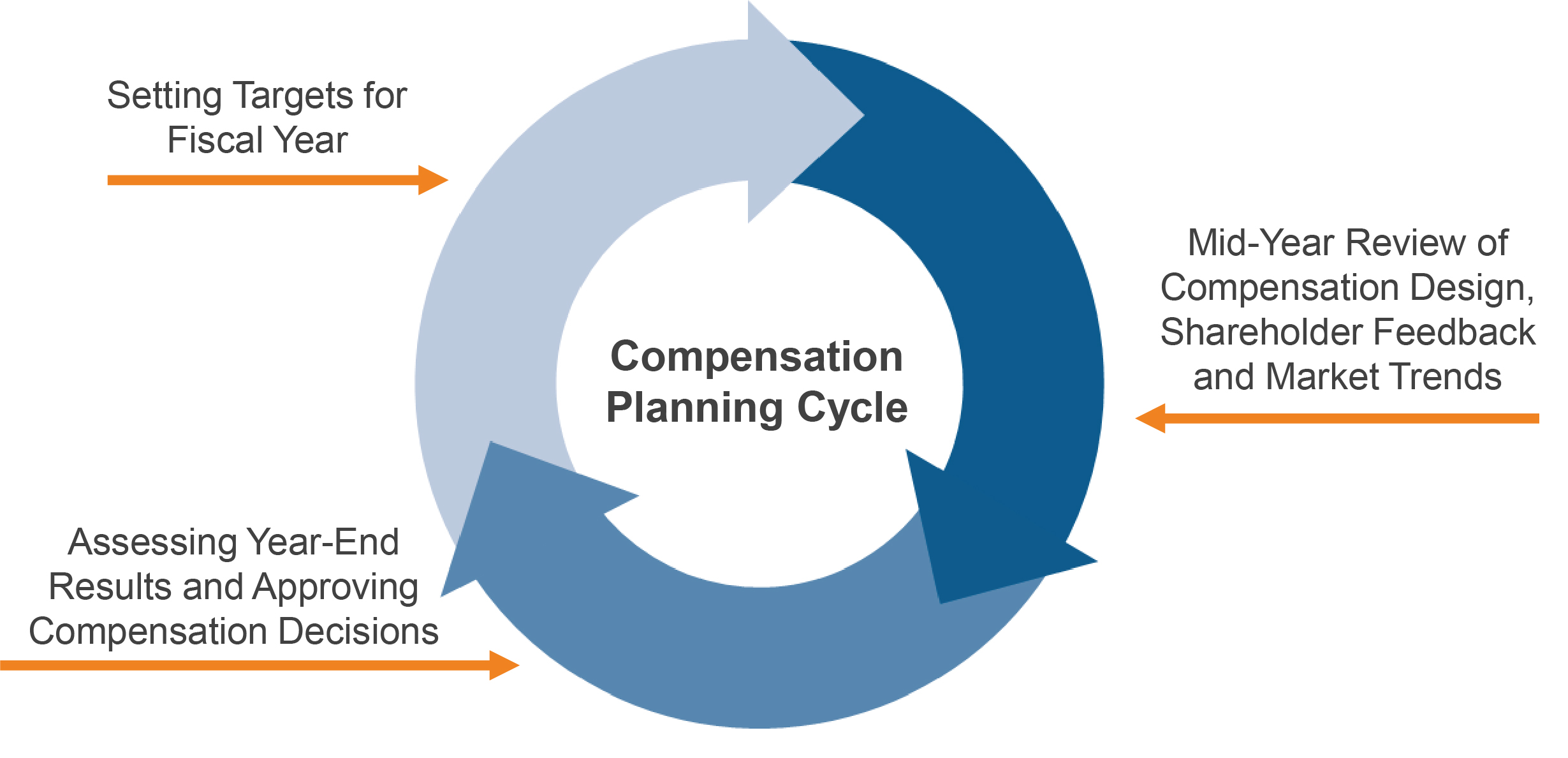
| | | | | | | | |
| Setting Targets for the Fiscal Year | Mid-Year Review | Assessing Year-End Results |
| | | |
•Compensation and Talent Committee’s independent consultant uses data on the Compensation Peer Group derived from independent surveys and disclosures by public companies to inform the committee of competitive pay levels for executive officers. •Our CEO, in consultation with the Compensation and Talent Committee’s independent compensation consultant and our EVP & CHRO, develops compensation recommendations for the other executive officers, for approval by the committee. •Compensation and Talent Committee sets target pay for all executive officers, including our CEO. | •Compensation and Talent Committee examines the design and purpose of all executive compensation pay elements. •Compensation and Talent Committee reviews and considers feedback from shareholders and proxy advisory firms regarding executive compensation program and policies. •Compensation and Talent Committee reviews compliance with Stock Ownership Policy. •Management updates the Compensation and Talent Committee on performance against incentive plan pre-established targets. •Compensation and Talent Committee reflects on market trends and emerging practices in executive compensation and their potential application at McKesson. | •Compensation and Talent Committee reviews current compensation and estimated separation and change in control benefits. •CEO presents an assessment of his individual performance results to the Board and discusses his goals for the new fiscal year. •Compensation and Talent Committee considers, among other things, progress on sustainability priority areas, including regulatory, compliance and legal issues, in making executive compensation determinations. •Board conducts our CEO’s performance review, discusses his performance in executive session and approves his goals for the new fiscal year. •Compensation and Talent Committee determines our CEO’s incentive compensation payouts in executive session with input from its independent compensation consultant. |
Role of Independent Compensation Consultant
Pursuant to its charter, the Compensation and Talent Committee may retain and terminate the services of any consultant or other advisor, as well as approve the advisor’s fees and other engagement terms. Each year, the committee evaluates the qualifications, performance and independence of its independent compensation consultant. To ensure it receives independent and unbiased advice and analysis, the committee adopted a formal independence policy certified annually by its compensation consultant.
During FY 2024, the Compensation and Talent Committee agreed to continue its engagement of Korn Ferry as its independent compensation consultant. As discussed throughout this proxy statement, the Compensation and Talent Committee’s independent compensation consultant advises on compensation matters concerning our executive officers. Representatives from Korn Ferry attended all Compensation and Talent Committee meetings during FY 2024 and communicated directly with committee members.
The fees incurred for FY 2024 services provided by Korn Ferry to the Compensation and Talent Committee totaled $328,333. During FY 2024, Korn Ferry provided other services to the Company requested by Company management consisting of Board succession and search consulting, executive assessments, and sales training programs and tools, for fees totaling approximately $596,618. Services requested by Company management were approved by the Chair of the Compensation and Talent Committee and were contracted for with members of Korn Ferry that were not part of Korn Ferry’s engagement with the Compensation and Talent Committee. The Compensation and Talent Committee believes Korn Ferry’s other work for the Company does not raise a conflict of interest and does not impair Korn Ferry’s ability to provide independent advice to the committee concerning executive compensation matters. In reaching its conclusion, Compensation and Talent Committee members took into account, among other things, the factors set forth in Exchange Act Rule 10C-1 and the NYSE listing standards.
Role of Management
Our CEO provides the Compensation and Talent Committee with pay recommendations for executive officers other than himself. The Compensation and Talent Committee, with input from the committee’s independent compensation consultant, determines our CEO’s compensation in executive session. Our Executive Vice President and Chief Human Resources Officer attends committee meetings to provide perspective and expertise relevant to the agenda. Management supports the committee’s activities by providing analyses and recommendations as requested. Management also reports to the committee on a regular basis regarding feedback received in the course of year-round shareholder engagement.
Information on Other Compensation-Related Topics
Severance and Change in Control Benefits
Our Severance Policy for Executive Employees (Executive Severance Policy) affords benefits to selected management employees, including our executive officers. We provide severance benefits to give executives a measure of financial security following the loss of employment, and to protect the Company from competitive activities after their departure. We believe these benefits are important to attract and retain executives in a highly competitive industry. This policy applies if an executive officer is terminated by the Company for reasons other than for cause and the termination is not covered by the Company’s Change in Control Policy for Selected Executive Employees (CIC Policy).
Award agreements under our 2022 Stock Plan and 2013 Stock Plan include change in control provisions which provide for “double-trigger” vesting upon an involuntary or constructive termination of employment following a change in control. Our CIC Policy provides for cash severance benefits to selected management employees in the event of an involuntary or constructive termination of employment occurring in connection with a change in control. We believe our CIC Policy is in our shareholders’ best interest, so that senior management can remain focused on important business decisions and not on how a potential transaction may affect them personally. The CIC Policy is administered by the Compensation and Talent Committee and benefits are consistent with current market practice. More detailed descriptions of the Executive Severance Policy and the CIC Policy are provided below at “Severance and Change in Control Policies" on page 77.
Stock Ownership Policy
The Company maintains robust guidelines for stock ownership by executive officers. Our CEO’s ownership requirement is six times base salary, and the ownership requirement for each of the Company’s other executive officers is three times their respective base salaries. Shares subject to stock options and PSU target awards do not count toward ownership under the policy. The Company reserves the right to restrict sales of the underlying shares of vesting equity awards if executives fail to meet the ownership requirements specified in the policy. Additionally, executives are required to hold 75% of the net after-tax shares issued upon the vesting or exercise of an award until the policy’s requirements are met. Once the requirement is met, executives must maintain that level of ownership or again be subject to the 75% holding requirement. Members of our Board are also subject to stock ownership guidelines, which are summarized above at “Director Compensation – Equity Compensation.”
The Compensation and Talent Committee reviews executive officer compliance with our Stock Ownership Policy each year. As of March 31, 2024, all current NEOs satisfied their stock ownership requirement.
| | | | | | | | | | | | | | | | | | | | |
| Name | Stock Ownership Policy |
| Target Ownership | | Actual Ownership |
Multiple of Base Salary | Multiple Expressed in Dollars | | Multiple of Base Salary(1) | Value of Shares Held by Executives in Dollars(2) |
| Brian S. Tyler | 6 | 9,000,000 | | | 27.3 | | 40,946,674 | |
| Britt J. Vitalone | 3 | 3,000,000 | | | 13.2 | | 13,221,718 | |
| Michele Lau | 3 | 2,100,000 | | | 8.0 | | 5,578,373 | |
| LeAnn B. Smith | 3 | 1,912,500 | | | 4.8 | | 3,047,161 | |
| Thomas L. Rodgers | 3 | 1,847,100 | | | 5.6 | | 3,428,324 | |
(1)Current NEO ownership is stated as of March 31, 2024, using FY 2024 salary levels. The ownership requirement may be met through any combination of the following:
•Direct stock holdings of the Company’s common stock, including shares held in a living trust, a family partnership or corporation controlled by the officer, unless the officer expressly disclaims beneficial ownership of such shares;
•Shares of the Company’s common stock held in the 401(k) Plan;
•Shares of the Company’s common stock underlying outstanding restricted stock and restricted stock unit awards; and/or
•Shares of the Company’s common stock underlying restricted stock units that are vested and deferred under a Company-sponsored deferral program.
(2)Based on the $536.85 closing price of the Company’s common stock as reported by the NYSE on March 28, 2024.
Anti-Hedging and Pledging Policies and Practices
The Company’s framework of insider trading policies and procedures prohibits all directors and executive officers from engaging in any hedging transaction with respect to Company securities. These individuals are also prohibited from holding Company securities in a margin account or otherwise pledging Company securities as collateral for a loan. Pledges of Company securities arising from certain types of hedging transactions are also prohibited. See page 27 for more detailed information. Equity Grant Policy and Procedures
Under the Company’s written equity grant policy, the grant date of equity awards is generally the date on which the Board or the Compensation and Talent Committee approves the award by meeting or unanimous written consent or a later date designated in such approval. In the case that an award is approved when the Company’s directors or employees may be in possession of material non-public information, the grant date of the equity award is deferred until the earlier of (i) the completion of one NYSE core trading session after the Company publicly discloses its quarterly earnings, or (ii) the passage of 24 hours after the Company has publicly disclosed its quarterly earnings. The Company’s annual grants generally occur at the end of May each year, close in time to our public announcement of financial results for the prior completed fiscal year and publication of our forward estimate of earnings for the current fiscal year.
The annual PSU program has a three-year performance period and the shares that are earned are not subject to any further vesting conditions. RSU awards generally vest over three years. For the time being, the Company has discontinued the grant of stock options. The Company’s equity grant policy states that stock options will be awarded at an exercise price equal to the closing price of the Company’s common stock on the date of grant. Under the terms of our 2022 Stock Plan and 2013 Stock Plan, stock option re‑pricing is not permitted without shareholder approval.
Recoupment Policies
The Board is dedicated to maintaining and enhancing a culture focused on integrity and accountability which discourages conduct detrimental to the Company’s sustainable growth. The Company maintains two recoupment policies.
Compensation Recoupment Policy. Our Compensation Recoupment Policy, originally adopted in 2010, was most recently amended by the Compensation and Talent Committee on January 30, 2024 as described below. This Recoupment Policy is incorporated by reference into all of our incentive plans, including those plans in which our NEOs participate.
The policy applies to any employee who receives a cash or equity award. Under the Recoupment Policy, the Company may recover, or “claw back,” incentive compensation if an employee:
•Engages in misconduct pertaining to a financial reporting requirement under the federal securities laws that in turn would require the Company to file a restatement of its audited financial statements with the SEC to correct an error;
•Receives incentive compensation based on an inaccurate financial or operating measure that when corrected causes significant harm to the Company;
•Engages in any fraud, theft, misappropriation, embezzlement or dishonesty to the detriment of the Company’s financial results as filed with the SEC; or
•Engages in conduct which is not in good faith and which disrupts, damages, impairs or interferes with the business, reputation or employees of McKesson or any of its subsidiaries or affiliates.
The committee may recover incentive compensation after consideration of factors it deems appropriate, such as, for example, the passage of time since the occurrence of the act and any pending or threatened legal proceeding relating to the employee’s conduct.
On January 30, 2024, the Recoupment Policy was amended to provide that in the event that incentive compensation is recovered from current or former Section 16 officers pursuant to the Financial Restatement Recoupment Policy described below, the Company has the discretion to recover erroneously awarded incentive compensation from other non-officer employees who are not subject to the Financial Restatement Recoupment Policy.
If triggered, then to the fullest extent permitted by law, the Company may require the employee to reimburse the Company for all or a portion of any incentive compensation received in cash within the last 12 months, and remit to the Company any compensation received from the vesting or exercise of equity-based awards occurring within the last 12 months. The Company will publicly disclose the results of any deliberations about whether to recoup compensation from an executive officer unless, in individual cases and consistent with any legally mandated disclosure requirements, the Board or the Compensation and Talent Committee concludes that legal or privacy concerns would prevent such disclosure.
Financial Restatement Recoupment Policy. On October 25, 2023, the Board adopted an executive compensation recoupment policy intended to comply with the requirements of Section 10D of the Exchange Act and the rules of the New York Stock Exchange under which the Company must recover certain excess incentive-based compensation paid to Section 16 officers in the event of a restatement of our financial statements due to our material noncompliance with any financial reporting required under U.S. federal securities laws. Recovery under the Financial Restatement Policy is mandatory and no misconduct is required.
Compensation and Talent Committee Report on Executive Compensation
We have reviewed and discussed with management the Compensation Discussion and Analysis. Based on such review and discussions, the Compensation and Talent Committee recommended to the Board of Directors that the Compensation Discussion and Analysis be included in this proxy statement and incorporated by reference to McKesson Corporation’s Annual Report on Form 10-K for the fiscal year ended March 31, 2024.
Compensation and Talent Committee of the Board of Directors
Donald R. Knauss, Chair
Richard H. Carmona, M.D.
Deborah Dunsire, M.D.*
James H. Hinton
Kathleen Wilson-Thompson
*Dr. Dunsire joined the Board on June 3, 2024.
Compensation and Talent Committee Interlocks and Insider Participation
The Compensation and Talent Committee is currently composed of the five independent directors listed above. No member of the Compensation and Talent Committee is, or was during FY 2024, a current or former officer or employee of the Company or any of its subsidiaries. Additionally, during FY 2024, none of our executive officers served on the board of directors or compensation and talent committee of any entity that had one or more of its executive officers serving on the Board or the Compensation and Talent Committee of the Company.
2024 Summary Compensation Table
The table below provides information regarding compensation and benefits earned by our NEOs.
| | | | | | | | | | | | | | | | | | | | | | | |
| Name and Principal Position | Fiscal Year | Salary ($) | Bonus ($)(2) | Stock
Awards ($)(3) | Non-Equity
Incentive Plan
Compensation ($) | All Other Compensation ($)(4) | Total ($) |
Brian S. Tyler Chief Executive Officer | 2024 | 1,490,000 | | -0- | 13,500,408 | | 3,142,410 | | 864,725 | | 18,997,543 | |
| 2023 | 1,433,333 | | -0- | 13,000,596 | | 5,016,667 | | 770,729 | | 20,221,325 | |
| 2022 | 1,375,000 | | -0- | 12,250,438 | | 4,210,938 | | 315,706 | | 18,152,082 | |
Britt J. Vitalone Executive Vice President and Chief Financial Officer | 2024 | 937,500 | | -0- | 4,350,396 | | 1,335,938 | | 158,827 | | 6,782,661 | |
| 2023 | 870,834 | | -0- | 4,000,708 | | 2,002,917 | | 163,254 | | 7,037,713 | |
| 2022 | 845,001 | | -0- | 3,500,404 | | 1,700,564 | | 87,763 | | 6,133,732 | |
Michele Lau Executive Vice President and Chief Legal Officer | 2024 | 175,000 | | 1,500,000 | | 6,851,529 | | 199,500 | | 80,225 | | 8,806,254 | |
LeAnn B. Smith Executive Vice President and Chief Human Resources Officer | 2024 | 635,418 | | 100,000 | | 2,000,379 | | 724,377 | | 80,941 | | 3,541,115 | |
| 2023 | 515,083 | | 100,000 | | 2,050,834 | | 676,177 | | 33,435 | | 3,375,529 | |
| | | | | | |
Thomas L. Rodgers Executive Vice President and Chief Strategy and Business Development Officer | 2024 | 611,750 | | -0- | 1,750,716 | | 697,395 | | 119,115 | | 3,178,976 | |
| 2023 | 589,167 | | -0- | 1,450,503 | | 1,178,334 | | 82,201 | | 3,300,205 | |
| 2022 | 570,834 | | -0- | 1,300,339 | | 998,960 | | 58,564 | | 2,928,697 | |
Lori A. Schechter(1) Former Executive Vice President, Chief Legal Officer and General Counsel | 2024 | 843,833 | | -0- | 2,900,395 | | 961,970 | | 134,765 | | 4,840,963 | |
| 2023 | 827,500 | | -0- | 2,605,652 | | 1,655,000 | | 122,406 | | 5,210,558 | |
| 2022 | 812,500 | | -0- | 2,605,261 | | 1,421,875 | | 429,141 | | 5,268,777 | |
Nancy Avila(1) Former Executive Vice President, Chief Information Officer and Chief Technology Officer | 2024 | 505,250 | | -0- | 2,050,646 | | 575,985 | | 942,043 | | 4,073,924 | |
| 2023 | 645,833 | | -0- | 2,000,904 | | 1,291,667 | | 29,829 | | 3,968,233 | |
| 2022 | 570,834 | | -0- | 1,450,112 | | 998,960 | | 35,100 | | 3,055,006 | |
(1)Ms. Schechter stepped down from her position as Executive Vice President, Chief Legal Officer and General Counsel effective December 31, 2023 and retired from the Company on June 3, 2024. Ms. Avila ceased to be Chief Information Officer and Chief Technology Officer effective October 2, 2023 and involuntarily terminated from the Company without cause on January 1, 2024. For more details, please refer to "Executive Transitions during FY 2024" on page 49. (2)Bonus amounts shown represent the following with respect to FY 2024:
To address cash compensation forfeited at her prior employer, Ms. Lau received a cash sign-on award of $1,500,000, which was paid upon hire. Ms. Lau will be required to repay a pro-rated portion of her cash sign-on award should she voluntarily separate from the Company within two years of her hire date.
Ms. Smith received a cash sign-on award with a cumulative value of $300,000 when she was hired in April 2021. $100,000 was paid upon hire in April 2021, $100,000 was paid in April 2022, and the remaining $100,000 was paid in April 2023.
(3)Stock Award amounts shown represent the aggregate grant date fair value of stock-based awards calculated in accordance with ASC Topic 718. These values exclude estimated forfeitures and may not reflect compensation actually received by our executive officers. The assumptions used to calculate the value of these awards can be found in Financial Note 4 of the Company’s consolidated financial statements in its Annual Report on Form 10-K for the fiscal year ended March 31, 2024, as filed with the SEC on May 8, 2024. For awards that are not subject to performance conditions, such as RSUs, the maximum award levels would not result in awards greater than disclosed in the table above. For awards that are subject to performance conditions, such as PSUs, we report the value at grant date based upon the probable outcome of such conditions consistent with our estimate of aggregate compensation cost to be recognized over the service period determined under ASC Topic 718, excluding the effect of estimated forfeitures.
The following represents the aggregate value based on the maximum number of shares that may be earned for PSU awards computed in accordance with ASC Topic 718 for each of the fiscal years presented above: Mr. Tyler, $16,200,475, $15,600,590 and $14,700,661; Mr. Vitalone, $5,220,716, $4,800,876 and $4,200,466; Ms. Lau, $3,422,373; Ms. Smith, $2,400,677 and $2,100,736; Mr. Rodgers, $2,101,068, $1,741,000 and $1,560,597; Ms. Schechter, $3,480,477, $3,126,712 and $3,126,437; and Ms. Avila, $2,461,111, $2,401,210 and $1,740,177.
To address equity compensation forfeited at her prior employer, Ms. Lau also received a new hire RSU award of $4,000,000, which will vest 50% on each of the first and second anniversaries of the grant date.
(4)All Other Compensation components shown in the table below represent the following amounts with respect to FY 2024:
| | | | | | | | | | | | | | | | | | | | | | | |
| Name | 401(k) Plan Match ($)(a) | Nonqualified Deferred Compensation Plan Match ($)(b) | Financial Counseling ($)(c) | Executive Officer Security Policy ($)(d) | International Assignment and Housing Relocation ($)(e) | Other Perquisites and Severance Benefits ($)(f) | Total All Other Compensation ($) |
| Brian S. Tyler | 13,200 | | 412,638 | | 19,598 | | 327,964 | | 12,000 | | 79,325 | | 864,725 | |
| Britt J. Vitalone | 13,200 | | 104,417 | | 18,246 | | 18,722 | | -0- | 4,242 | | 158,827 | |
| Michele Lau | 13,200 | | -0- | 4,668 | | -0- | 59,857 | | 2,500 | | 80,225 | |
| LeAnn B. Smith | 13,200 | | 39,264 | | 18,246 | | -0- | -0- | 10,231 | | 80,941 | |
| Thomas L. Rodgers | 13,200 | | 58,403 | | 18,246 | | -0- | -0- | 29,266 | | 119,115 | |
| Lori A. Schechter | 13,200 | | 86,753 | | 18,246 | | -0- | -0- | 16,566 | | 134,765 | |
| Nancy Avila | 13,200 | | -0- | 18,246 | | -0- | -0- | 910,597 | | 942,043 | |
(a)Matching Contributions to 401(k) Plan:
These are amounts contributed by the Company to each NEO's account under our 401(k) plan.
(b)Matching Contributions to Nonqualified Deferred Compensation Plans:
As described below in the narrative following the 2024 Nonqualified Deferred Compensation Table, the SRSP and the DCAP III each provide for matching contributions. The amount contributed by the Company to each NEO’s SRSP account was as follows: Mr. Tyler, $412,638; Mr. Vitalone, $104,417; Ms. Lau, $0; Ms. Smith, $39,264; Mr. Rodgers, $58,403; Ms. Schechter, $27,173; and Ms. Avila, $0. The Company made no contributions to the DCAP III accounts of the NEOs, except for Ms. Schechter who received a contribution of $59,580.
(c)Financial Counseling Services:
These amounts represent the value of financial counseling services provided to each NEO.
(d)Executive Officer Security Policy:
Company Aircraft: Mr. Tyler is required under our security policy to use Company aircraft for security, productivity and privacy reasons. The aggregate incremental cost of personal use of Company-provided aircraft for Mr. Tyler in FY 2024 was $313,161. In accordance with our security policy, Mr. Tyler approved Mr. Vitalone’s personal use of the Company’s aircraft. The aggregate incremental cost of personal use of Company-provided aircraft for Mr. Vitalone in FY 2024 was $18,722. To calculate this cost, the Company determines the total variable annual operating cost for each aircraft, such as fuel, trip-related maintenance, landing and parking fees, crew expenses, supplies and catering. The total variable operating cost is then averaged for all flight hours flown and multiplied by the total number of personal flight hours for each NEO. Fixed annual costs that do not change based on usage, such as pilots’ salaries, home hangar expenses, general taxes, routine maintenance and insurance, are excluded from the incremental cost calculation. If an aircraft flies empty before picking up or after dropping off a passenger flying for personal reasons, and the empty flight is not related to any other business-related travel, this “deadhead” segment is included in the incremental cost calculation for determining personal use. Subject to availability and space, occasionally personal guests may accompany our named executive officers on business or personal travel, but in these instances there was no incremental cost to the Company.
Home Security: The Company paid $14,803 for the installation of home security devices for Mr. Tyler, based on an evaluation performed by an independent security consultant. For a complete description of Mr. Tyler’s security benefit, please refer to the section entitled “Other Compensation and Benefits” on page 61. The Company does not reimburse our NEOs for taxes due on imputed income for items or services provided under the Executive Officer Security Policy.
(e)International Assignment and Housing Relocation:
International Assignment: Mr. Tyler served on international assignment as Chairman of the Management Board of McKesson Europe for approximately two years, ending with his appointment to the position of President and Chief Operating Officer, at which time Mr. Tyler and his family repatriated to the United States. Our policies on temporary international assignments and tax equalization are designed to mitigate the inconvenience of such an assignment by covering expenses in excess of what the employee would have incurred had the employee remained in their home country. Accordingly, certain benefits are provided on an income tax-free basis to the employee, and the Company provides tax equalization payments to the employee to ensure that the employee bears a tax burden comparable to their U.S. tax burden on income that is unrelated to the international assignment. These benefits are provided to all Company employees covered by the policies. For Mr. Tyler, All Other Compensation includes $12,000 for income tax gross-ups paid during FY 2024 pursuant to the Company’s relocation policy.
Housing Relocation: For Ms. Lau, includes $36,970 for the value of relocation expenses paid by the Company to her or on her behalf, and $22,887 for income tax gross-ups pursuant to the Company’s relocation policy. These relocation benefits are consistent with the benefits provided to all employees who relocate in connection with their employment with the Company.
(f)Other Perquisites and Severance Benefits:
Annual Physical Examinations: For Mr. Tyler, Mr. Vitalone, Ms. Smith, Mr. Rodgers, Ms. Schechter, and Ms. Avila, includes $3,577, $4,242, $10,128, $13,473, $9,066, and $7,997, respectively, in Company-paid expenses related to annual physical examinations.
McKesson Foundation Company Matching Contributions: For Mr. Tyler, Ms. Smith, Mr. Rodgers, Ms. Schechter, and Ms. Avila, includes $5,000, $103, $1,793, $5,000, and $5,000, respectively, in matching contributions made by the McKesson Foundation to charitable organizations. For Mr. Tyler, Ms. Lau and Ms. Schechter includes $2,500, $2,500, and $2,500, respectively, donated by the McKesson Foundation to a charitable organization in respect of their service as a director of the organization.
Severance Benefit: For Ms. Avila, includes severance benefits of 16 months’ salary continuation having an aggregate value of $897,600.
Other: For Mr. Tyler and Mr. Rodgers, includes a one-time payment of $68,248 and $14,000, respectively, to make them whole with respect to a penalty tax assessed by the IRS due to an inadvertent Company administrative error.
2024 Grants of Plan-Based Awards Table
The table below provides information on plan-based awards granted to our NEOs during the fiscal year ended March 31, 2024:
| | | | | | | | | | | | | | | | | | | | | | | | | | | | | | | | | | | |
| Name | Type of Award | Grant Date | Estimated Future Payouts Under Non-Equity Incentive Plan Awards(1) | | Estimated Future Payouts Under Equity Incentive Plan Awards(2) | All Other Stock Awards: Number of Shares of Stock or Units (#) | Grant Date Fair Value of Stock and Option Awards ($)(5) |
Threshold ($)(3) | Target ($) | Maximum ($) | | Threshold (#)(4) | Target (#) | Maximum (#) |
Brian S. Tyler | RSU | 5/23/2023 | | | | | | | | 13,736 | | 5,400,171 | |
| PSU | 5/23/2023 | | | | | 9,542 | | 19,084 | | 38,168 | | | 8,100,237 | |
| MIP | | 1,378,250 | | 2,756,500 | | 5,513,000 | | | | | | | |
Britt J. Vitalone | RSU | 5/23/2023 | | | | | | | | 4,426 | | 1,740,038 | |
| PSU | 5/23/2023 | | | | | 3,075 | | 6,150 | | 12,300 | | | 2,610,358 | |
| MIP | | 585,938 | | 1,171,875 | | 2,343,750 | | | | | | | |
Michele Lau | RSU | 2/9/2024 | | | | | | | | 2,274 | | 1,140,070 | |
RSU(6) | 2/9/2024 | | | | | | | | 7,979 | | 4,000,272 | |
| PSU | 2/9/2024 | | | | | 1,526 | | 3,051 | | 6,102 | | | 1,711,187 | |
| MIP | | 87,500 | | 175,000 | | 350,000 | | | | | | | |
| LeAnn B. Smith | RSU | 5/23/2023 | | | | | | | | 2,035 | | 800,040 | |
| PSU | 5/23/2023 | | | | | 1,414 | | 2,828 | | 5,656 | | | 1,200,339 | |
| MIP | | 317,709 | | 635,418 | | 1,270,836 | | | | | | | |
Thomas L. Rodgers | RSU | 5/23/2023 | | | | | | | | 1,781 | | 700,182 | |
| PSU | 5/23/2023 | | | | | 1,238 | | 2,475 | | 4,950 | | | 1,050,534 | |
| MIP | | 305,875 | | 611,750 | | 1,223,500 | | | | | | | |
Lori A. Schechter | RSU | 5/23/2023 | | | | | | | | 2,951 | | 1,160,156 | |
| PSU | 5/23/2023 | | | | | 2,050 | | 4,100 | | 8,200 | | | 1,740,239 | |
| MIP | | 421,917 | | 843,833 | | 1,687,666 | | | | | | | |
Nancy Avila | RSU | 5/23/2023 | | | | | | | | 2,086 | | 820,090 | |
| PSU | 5/23/2023 | | | | | 1,450 | | 2,899 | | 5,798 | | | 1,230,556 | |
| MIP | | 252,625 | | 505,250 | | 1,010,500 | | | | | | | |
(1)Amounts shown represent the range of possible cash payouts under the MIP for the FY 2024 performance period. Amounts actually earned under the FY 2024 MIP are included in the 2024 Summary Compensation Table under the column titled “Non-Equity Incentive Plan Compensation.” Information regarding the operation of the MIP is provided above in the section titled “Each Compensation Element Serves a Unique Purpose.”
(2)Amounts shown for PSUs represent the range of possible payouts for the FY 2024 — FY 2026 performance period that the Compensation and Talent Committee established at its May 2023 meeting with respect to annual PSU awards. Payout decisions for these PSU awards will be made in May 2026.
(3)Amounts shown for MIP represent 50% of the target payout for FY 2024, which is the threshold award payout.
(4)Amounts shown for the annual PSUs represent 50% of the target payout for the FY 2024 — FY 2026 performance period, which is the threshold award payout.
(5)Amounts shown reflect the aggregate grant date fair values of RSU and PSU awards computed in accordance with ASC Topic 718, and do not reflect actual realized values. A portion of the grant date fair value of PSU awards was determined by an independent third party using a Monte Carlo simulation model because the performance goals applicable to the PSU awards include a combination of operational and market-based (rTSR) criteria.
(6)For more details on Ms. Lau's sign-on RSU award, please see the "Executive Transitions during FY 2024" section on page 49.
2024 Outstanding Equity Awards Table
The table below provides information on option awards and stock awards held by our NEOs as of March 31, 2024:
| | | | | | | | | | | | | | |
| Name | Stock Awards |
Number of Shares or Units of Stock That Have Not Vested (#)(1) | Market Value of Shares or Units of Stock That Have Not Vested ($)(2) | Equity Incentive Plan Awards: Number of Unearned Shares, Units or Other Rights That Have Not Vested (#)(3) | Equity Incentive Plan Awards: Market or Payout Value of Unearned Shares, Units or Other Rights That Have Not Vested ($)(2) |
| Brian S. Tyler | 32,613 | | 17,508,289 | | 154,570 | | 82,980,905 | |
| Britt J. Vitalone | 10,052 | | 5,396,416 | | 46,536 | | 24,982,852 | |
| Michele Lau | 10,253 | | 5,504,323 | | 6,102 | | 3,275,859 | |
| LeAnn B. Smith | 4,165 | | 2,235,980 | | 13,046 | | 7,003,745 | |
| Thomas L. Rodgers | 3,842 | | 2,062,578 | | 17,548 | | 9,420,644 | |
| Lori A. Schechter | 6,837 | | 3,670,443 | | 32,412 | | 17,400,382 | |
| Nancy Avila | -0- | -0- | 8,526 | | 4,577,183 | |
(1)Stock awards vest as follows:
For Mr. Tyler, 4,578 shares on May 23, 2024; 5,272 shares on May 24, 2024; 8,333 shares on May 25, 2024; 4,579 shares on May 23, 2025; 5,272 shares on May 24, 2025; and 4,579 shares on May 23, 2026.
For Mr. Vitalone, 1,475 shares on May 23, 2024; 1,622 shares on May 24, 2024; 2,381 shares on May 25, 2024; 1,475 shares on May 23, 2025; 1,623 shares on May 24, 2025; and 1,476 shares on May 23, 2026.
For Ms. Lau, 4,747 shares on February 9, 2025; 4,748 shares on February 9, 2026; 758 shares on February 9, 2027.
For Ms. Smith, 678 shares on May 23, 2024; 446 shares on May 24, 2024; 222 shares on May 25, 2024; 507 shares on February 10, 2025; 678 shares on May 23, 2025; 447 shares on May 24, 2025; 508 shares on February 10, 2026; and 679 shares on May 23, 2026.
For Mr. Rodgers, 593 shares on May 23, 2024; 588 shares on May 24, 2024; 885 shares on May 25, 2024; 594 shares on May 23, 2025; 588 shares on May 24, 2025; and 594 shares on May 23, 2026.
For Ms. Schechter, 983 shares on May 23, 2024; 1,057 shares on May 24, 2024; 1,772 shares on May 25, 2024; 984 shares on May 23, 2025; 1,057 shares on May 24, 2025; and 984 shares on May 23, 2026.
(2)Based on the $536.85 closing price of the Company’s common stock as reported by the NYSE on March 28, 2024, the last trading day of our fiscal year.
(3)SEC rules require us to disclose the threshold payout amounts for PSU awards outstanding as of the end of the fiscal year, except that if performance during the last completed fiscal year has exceeded threshold performance, the disclosure is based on the next higher performance measure. The value included in this column includes actual payout value with respect to FY 2022 — FY 2024 PSU awards, which exceeded target performance levels.
Outstanding PSUs actually earned, if any, will pay out in May 2024, May 2025 and May 2026. The following amounts reflect maximum payouts for FY 2023 — FY 2025 PSUs and FY 2024 — FY 2026 PSUs granted to our NEOs:
Completion of the three-year PSU performance period ending March 31, 2024 — Mr. Tyler, 72,026 shares; Mr. Vitalone, 20,580 shares; Ms. Lau, 0 shares; Ms. Smith, 1,990 shares; Mr. Rodgers, 7,646 shares; Ms. Schechter, 15,318 shares; and Ms. Avila, 8,526 shares;
Completion of the three-year PSU performance period ending March 31, 2025 — Mr. Tyler, 44,376 shares; Mr. Vitalone, 13,656 shares; Ms. Lau, 0 shares; Ms. Smith, 5,400 shares; Mr. Rodgers, 4,952 shares; Ms. Schechter, 8,894 shares; and Ms. Avila, 0 shares.
Completion of the three-year PSU performance period ending March 31, 2026 — Mr. Tyler, 38,168 shares; Mr. Vitalone, 12,300 shares; Ms. Lau, 6,102 shares; Ms. Smith, 5,656 shares; Mr. Rodgers, 4,950 shares; Ms. Schechter, 8,200 shares; and Ms. Avila, 0 shares.
2024 Option Exercises and Stock Vested Table
The table below provides information on stock options exercised and stock awards vested with respect to our NEOs during the fiscal year ended March 31, 2024:
| | | | | | | | | | | | | | | | | |
| Name | Option Awards | | Stock Awards |
Number of Shares Acquired on Exercise (#) | Value Realized on Exercise ($)(1) | | Number of Shares Acquired on Vesting (#) | Value Realized on Vesting ($)(2) |
| Brian S. Tyler | 82,092 | | 22,736,547 | | | 99,429 | | 39,072,268 | |
| Britt J. Vitalone | -0- | -0- | | 28,260 | | 11,105,753 | |
| Michele Lau | -0- | -0- | | -0- | -0- |
| LeAnn B. Smith | -0- | -0- | | 2,705 | | 1,123,716 | |
| Thomas L. Rodgers | -0- | -0- | | 11,087 | | 4,364,995 | |
| Lori A. Schechter | -0- | -0- | | 22,271 | | 8,750,995 | |
| Nancy Avila | -0- | -0- | | 14,367 | | 5,820,976 | |
(1)Amount shown represents values realized, calculated as the difference between the market price of the Company’s common stock on the date of exercise and the exercise price.
(2)Amount shown represents the aggregate fair market values of the Company’s common stock realized upon the vesting of RSUs. In addition to the amount realized upon vesting of RSUs, participants received a cash payment of dividend equivalents which for Mr. Tyler was $101,138, for Mr. Vitalone was $28,962, for Ms. Lau was $0, for Ms. Smith was $8,976, for Mr. Rodgers was $14,072, for Ms. Schechter was $22,172, and for Ms. Avila was $22,309.
2024 Nonqualified Deferred Compensation Table
The table below provides information on the contributions, earnings and account balances for our NEOs participating in a Company-sponsored nonqualified deferred compensation program. The nonqualified deferred compensation plans referenced in the table below are described in the narrative immediately following the table.
| | | | | | | | | | | | | | | | | |
| Name | Executive Contributions in Last Fiscal Year ($)(1) | Registrant Contributions in Last Fiscal Year ($)(2) | Aggregate Earnings in Last Fiscal Year ($)(3) | Aggregate Withdrawals/ Distributions ($)(4) | Aggregate Balance at Last Fiscal Year-End ($) |
| Brian S. Tyler | | | | | |
| SRSP Plans | 515,797 | | 412,638 | | 372,548 | | -0- | 3,683,540 | |
| DCAP Plans | -0- | -0- | 232,556 | | -0- | 4,615,229 | |
| Dividend Equivalents | -0- | 81,142 | | -0- | 101,138 | | 112,753 | |
| Britt J. Vitalone | | | | | |
| SRSP Plans | 130,521 | | 104,417 | | 75,494 | | -0- | 667,869 | |
| DCAP Plans | -0- | -0- | 11,265 | | -0- | 122,019 | |
| Dividend Equivalents | -0- | 24,661 | | -0- | 28,962 | | 34,008 | |
| Michele Lau | | | | | |
| SRSP Plans | -0- | -0- | -0- | -0- | -0- |
| DCAP Plans | -0- | -0- | -0- | -0- | -0- |
| Dividend Equivalents | -0- | -0- | -0- | -0- | -0- |
| LeAnn B. Smith | | | | | |
| SRSP Plans | 49,080 | | 39,264 | | 10,852 | | -0- | 113,429 | |
| DCAP Plans | -0- | -0- | -0- | -0- | -0- |
| Dividend Equivalents | -0- | 10,927 | | -0- | 8,976 | | 10,698 | |
| Thomas L. Rodgers | | | | | |
| SRSP Plans | 73,004 | | 58,403 | | 81,579 | | -0- | 599,917 | |
| DCAP Plans | -0- | -0- | -0- | -0- | -0- |
| Dividend Equivalents | -0- | 9,326 | | -0- | 14,072 | | 12,766 | |
| Lori A. Schechter | | | | | |
| SRSP Plans | 33,967 | | 27,173 | | 87,831 | | -0- | 782,767 | |
| DCAP Plans | 1,489,500 | | 59,580 | | 470,415 | | -0- | 7,606,152 | |
| Dividend Equivalents | -0- | 17,053 | | -0- | 22,172 | | 27,422 | |
| Nancy Avila | | | | | |
| SRSP Plans | -0- | -0- | -0- | -0- | -0- |
| DCAP Plans | -0- | -0- | -0- | -0- | -0- |
| Dividend Equivalents | -0- | 11,390 | | -0- | 22,309 | | -0- |
(1)Amounts shown reflect deferrals into SRSP and/or DCAP III accounts. These amounts are reported as compensation in the 2024 Summary Compensation Table above.
(2)Amounts shown represent Company contributions to SRSP and/or DCAP III accounts, as well as dividend equivalents on unvested RSUs. All recipients of RSUs, including our NEOs, receive dividend equivalents at the same dividend rate received by the Company’s common stock investors, which is currently $0.62 per share per quarter.
(3)Amounts shown include earnings (or losses) on compensation deferred into the current SRSP and DCAP III plans and their respective predecessor plans.
(4)Amount shown represents dividend equivalents that were distributed in cash upon vesting of the related RSUs.
Supplemental Retirement Savings Plan
The SRSP was originally adopted by the Board on January 1, 2005 and is the successor plan to the Supplemental Profit-Sharing Investment Plan (SPSIP), which was frozen effective December 31, 2004. The SRSP includes deferral and distribution provisions intended to comply with IRC Section 409A. The SRSP was most recently amended effective July 30, 2019.
U.S. employees, including NEOs, may elect to participate in the SRSP. Participants may elect to defer, in whole percentages, from 1.0% to 5.0% of covered compensation in excess of the IRC Section 401(a)(17) limit (currently, $345,000 per year). “Covered compensation” under this plan includes base salary and MIP payouts. An election to participate in the SRSP remains in effect until the participant informs the plan administrator that he or she wishes to cease participation. In that case, the election to cease participation becomes effective at the beginning of the next calendar year. At an employee participation level of 5.0%, the Company contributes an additional 4.0% of the participant’s pay as a matching contribution, consistent with the terms of our 401(k) Plan (Company Match). Participants are 100% vested in both the Company Match and their own contributions in the SRSP.
Participants in the SRSP and SPSIP make a distribution election at the time they elect to enroll in the plan. Upon separation from service, distributions may be made in either a lump sum or in installments. If the separation from service is not due to retirement, disability or death, the entire account balance is distributed as a lump sum at a time such payment would comply with IRC Section 409A. Distributions under the SRSP and the SPSIP are subject to ordinary income taxes.
Accounts in the SRSP are credited with earnings (or losses) based on the employee’s choice of hypothetical investments in certain of the funds offered under our 401(k) Plan. In the event no such hypothetical investment choice is made, interest is credited to the participant’s account at a default interest rate, which is 120% of the long-term applicable federal rate published by the IRS for December of the immediately preceding calendar year.
Unlike tax-qualified retirement accounts, assets for the payment of benefits under the SRSP and SPSIP are not held in trust. Distributions under these plans are paid from the Company’s general corporate funds. Participants and their beneficiaries are unsecured general creditors of the Company with no special or prior right to any Company assets for payment of any obligation under the plans.
Deferred Compensation Administration Plan III
The DCAP III was adopted by the Board on January 1, 2005 and is the successor plan to the Deferred Compensation Administration Plan II, which was frozen effective December 31, 2004. The DCAP III includes deferral and distribution provisions intended to comply with IRC Section 409A. The DCAP III was most recently amended effective July 30, 2019.
Participation in DCAP III is offered to all senior-level management and executive-level employees, including our executive officers, and certain additional categories of senior-level professionals who are highly compensated employees. Participants may elect to defer into the DCAP III up to 75% of their annual base salary and up to 90% of their annual MIP payout. Unlike the SRSP, an employee’s election to participate in the DCAP III is in effect for only one calendar year. Amounts deferred under the DCAP III are credited to a book account, and credited with earnings (or losses) based on the employee’s choice of hypothetical investments in certain of the funds offered under the 401(k) Plan. In the event no such hypothetical investment choice is made, interest is credited to the participant’s account at a default interest rate, which is 120% of the long-term applicable federal rate published by the IRS for December of the immediately preceding calendar year (DCAP Rate).
Participants in the DCAP III make a distribution election at the time they elect to defer compensation. Distributions may be made at one or more specified dates in the future or upon separation from service in either a lump sum or in installments. If the separation from service is not due to retirement, disability or death, the entire account balance is distributed as a lump sum at a time such payment would comply with IRC Section 409A. Distributions under the DCAP plans are subject to ordinary income taxes.
Earnings that are deferred into the DCAP III are not considered “covered compensation” for 401(k) Plan or SRSP purposes, as defined by those plans. No 401(k) Plan or SRSP employee deductions are taken from compensation deferred into the DCAP III. To keep the DCAP III participants whole with respect to their Company Match, an amount is credited to a participant’s DCAP III account equal to 4% of the amount deferred.
As with the SRSP and the SPSIP, assets for the payment of benefits under the DCAP plans are not held in trust. Distributions are paid from the Company’s general corporate funds. Participants and their beneficiaries are unsecured general creditors of the Company with no special or prior right to any Company assets for payment of any obligation under the plans.
Severance and Change in Control Policies
Executive Severance Policy
The Severance Policy for Executive Employees, as amended and restated April 26, 2022 (Executive Severance Policy), applies in the event an executive officer is terminated by the Company for reasons other than for “Cause” and the termination is not covered by the Company’s CIC Policy, which is described below. Cause has the definition set forth in the Executive Severance Policy, which was included as an exhibit to the Company’s Annual Report on Form 10-K, as filed with the SEC on May 9, 2022.
The benefit payable to participants under the Executive Severance Policy is a minimum of 12 months’ base salary, plus one month’s base salary per year of service, up to a maximum of 24 months. Benefits under this plan are paid as salary continuation and are reduced or eliminated by any income the executive receives under the Company’s short-term disability plan. Participants must execute a general release of the Company and its affiliates in order to receive severance benefits. In addition, benefits are subject to forfeiture and clawback if (i) the participant violates any continuing restrictive covenant obligation under any Company agreement, plan or policy, or if the participant does not comply with obligations under the release, (ii) following termination the Company determines that the participant engaged in any certain act or omission during employment that would have entitled the Company to terminate the participant’s employment for Cause or (iii) as determined by the Compensation and Talent Committee in its sole discretion, the participant has engaged in any other conduct not in good faith that is injurious to the Company.
In addition to the benefits under the Executive Severance Policy, award agreements under our 2022 Stock Plan and 2013 Stock Plan provide for accelerated vesting of RSUs that would have vested within six months following termination and continued participation in PSU awards that would have paid out within six months of termination in the event an executive
officer is terminated by the Company for reasons other than for “cause.” Alternatively, if the officer has attained normal retirement (age 60 with at least 10 years of service) or would be eligible for normal retirement within six months of termination, the officer is entitled to continued vesting of RSU awards and continued participation in PSU awards, provided that the award was granted at least one year before termination.
Change in Control Policy
The Change in Control Policy for Selected Executive Employees, amended and restated effective January 28, 2020 (CIC Policy), provides for severance payments to eligible executive employees of the Company (including executive officers). Payments under the CIC Policy are paid only upon a qualifying separation from service that occurs within six months prior to, or 24 months following, a “Change in Control.” For purposes of the CIC Policy, a qualifying separation from service is one that is by the Company other than for “Cause” and either proximate to or instigated by the party involved in, or otherwise in connection with, the Change in Control, or one that is initiated by the participant for “Good Reason.” Cause and Good Reason have the definitions set forth in the CIC Policy, which was included as an exhibit to the Company’s Annual Report on Form 10-K, as filed with the SEC on May 22, 2020. A Change in Control is defined as the occurrence of any change in ownership of the Company, a change in the effective control of the Company or a change in the ownership of a substantial portion of the assets of the Company, all as defined in IRC Section 409A.
The CIC Policy expands eligibility for benefits to a larger employee group than is eligible under the Executive Severance Policy. Tier one participants (which would include any NEO participating in the CIC Policy) are eligible for a cash benefit equal to 2.99 times the participant’s “Earnings,” defined by the policy as the sum of (i) annual base salary plus (ii) the greater of (A) the participant’s target bonus under the MIP or (B) the average of the participant’s MIP award for the latest three years for which the participant was eligible to receive an award (or such lesser period of time during which the participant was eligible to receive an award). Tier one participants are eligible for Company-paid life insurance for three years, and a taxable cash payment which is sufficient to provide a net amount equal to the participant’s premium for COBRA continuation coverage for three years. CIC Policy severance payments may be delayed following a participant’s separation from service to comply with IRC Section 409A. Any payments delayed as a result of such compliance will accrue interest at the DCAP Rate until paid.
Effective January 28, 2020, the Compensation and Talent Committee approved amendments to the CIC Policy that eliminated excise tax gross-ups. In the event that payments and benefits received in connection with a change in control would constitute parachute payments subject to excise tax under IRC Section 4999, payments and benefits will be reduced to the extent necessary to avoid payment of the excise tax, but only if the reduction results in a greater after-tax benefit to the participant.
Award agreements under our 2022 Stock Plan and 2013 Stock Plan include change in control provisions which provide for “double-trigger” vesting upon an involuntary or constructive termination of employment following a change in control. Our CIC Policy provides for cash severance benefits to selected management employees in the event of an involuntary or constructive termination of employment occurring in connection with a change in control (as defined in the CIC Policy).
Potential Payments upon Termination or Change in Control
The following narrative describes potential payments and benefits that may be received by our NEOs or their respective beneficiaries pursuant to existing plans or arrangements under various separation scenarios, including termination of employment or a change in control of McKesson.
Benefits and Payments upon Death or Disability
In the event of (i) death or (ii) termination of employment due to permanent and total disability, which occurs on the first anniversary of the date the executive is unable to perform services, executives are entitled to accelerated vesting of their outstanding options and RSUs, prorated PSU awards and prorated MIP awards. Prorated PSU and MIP payments are made at the end of the performance period when payments are made to actively employed plan participants. Vested stock options remain exercisable for three years, subject to earlier expiration of the option term.
Termination for Cause
Generally, under the Company’s incentive plans and programs, “cause” means the executive’s willful misconduct and in some cases the executive’s negligent misconduct, which, in any case, is injurious to the Company. The specific consequences of such behavior are reflected in plan documents. In the event of termination for Cause, all obligations or commitments under our incentive plans are canceled or voided, including outstanding equity grants, vested stock options, and MIP awards. However, payments such as accrued but unpaid salary and paid time off are made as required by federal and state laws.
Benefits and Payments upon Voluntary Termination
In the event of voluntary termination, all unvested incentive awards are canceled unless the employee is eligible for certain benefits based on age and service with the Company. Employees whose age plus service equals 65 (65 points) are eligible for prorated MIP awards upon voluntary termination on or after January 1 of the fiscal year. Under the 2013 Stock Plan and 2022 Stock Plan (referred to below as the Stock Plans), all employee participants with at least 65 points have three years to exercise vested stock options following a voluntary termination, subject to expiration of the option term. Employee participants who have attained normal retirement (age 60 with at least 10 years of service) are eligible for continued vesting of equity awards following a voluntary termination, and the full term to exercise stock options, provided that the award was granted at least one year before the date of termination.
Benefits and Payments upon Involuntary Termination
The Executive Severance Policy covers our executive officers, including our NEOs. The Executive Severance Policy is described above under “Severance and Change in Control Policies.”
Benefits and Payments upon Involuntary Termination in Connection with a Change in Control
The CIC Policy provides severance benefits to certain selected employees, including our NEOs. The CIC Policy is described above under “Severance and Change in Control Policies.”
Upon a qualifying termination in connection with a Change in Control, award agreements under the Stock Plans provide for accelerated vesting of outstanding unvested equity awards. Award agreements under the Stock Plans provide that upon a Change in Control, PSUs convert into time-based vesting awards based on the greater of target or actual performance under the terms of the awards through the date of the Change in Control. The MIP provides for payment, after the end of the fiscal year in which a Change in Control occurs, equal to the greatest of (i) the target award; (ii) the award payable based on actual performance; or (iii) the average actual award payable to the participant for the prior three years. This MIP award is also payable if the participant’s employment is involuntarily terminated within 12 months after a Change in Control.
The table below sets forth the value of benefits to which NEOs or their beneficiaries may be entitled under the five termination scenarios described above. Unless otherwise noted, the amounts shown assume separation on March 31, 2024 and, where applicable, are calculated using the $536.85 closing price of the Company’s common stock on March 28, 2024, the trading last day of our fiscal year.
In the table below, a “-0-” indicates no monetary value is associated with the benefit, while a “–” indicates the NEO is not entitled to the benefit.
| | | | | | | | | | | | | | | | | | | | | | | | |
| Name | Benefit | Benefits and
Payments
upon Death
or Disability ($) (a) | Termination
for Cause ($) (b) | Benefits and
Payments
upon
Voluntary
Termination ($) (c) | Benefits and
Payments
upon
Involuntary
Termination ($) (d) | Benefits and
Payments
upon
Involuntary
Termination in Connection
with a
Change in
Control ($)
(e) | | | | |
| Brian S. Tyler | Salary Continuation / Severance(1) | – | – | – | 3,013,500 | 14,990,559 | | | | |
MIP(2) | 3,142,410 | – | 3,142,410 | 3,142,410 | 3,370,139 | | | | |
Value of Stock Vesting(3) | 67,531,434 | – | – | 48,428,701 | 78,332,319 | | | | |
Medical(4) | – | – | – | – | 96,110 | | | | |
| Total | 70,673,844 | – | 3,142,410 | 54,584,611 | 96,789,127 | | | | |
| Britt J. Vitalone | Salary Continuation / Severance(1) | – | – | – | 2,009,000 | 7,813,180 | | | | |
MIP(2) | 1,335,938 | – | 1,335,938 | 1,335,938 | 1,538,349 | | | | |
Value of Stock Vesting(3) | 19,989,075 | – | – | 13,989,238 | 23,412,031 | | | | |
Medical(4) | – | – | – | – | 51,075 | | | | |
| Total | 21,325,013 | – | 1,335,938 | 17,334,176 | 32,814,635 | | | | |
| Michele Lau | Salary Continuation / Severance(1) | – | – | – | 1,406,300 | 2,693,299 | | | | |
MIP(2) | 199,500 | – | – | 199,500 | 199,500 | | | | |
Value of Stock Vesting(3) | 6,050,299 | – | – | – | 7,142,252 | | | | |
Medical(4) | – | – | – | – | 96,110 | | | | |
| Total | 6,249,799 | – | – | 1,605,800 | 10,131,161 | | | | |
| LeAnn B. Smith | Salary Continuation / Severance(1) | – | – | – | 749,488 | 3,918,112 | | | | |
MIP(2) | 724,377 | – | – | 724,377 | 724,377 | | | | |
Value of Stock Vesting(3) | 4,776,892 | – | – | 1,256,766 | 6,272,019 | | | | |
Medical(4) | – | – | – | – | 74,067 | | | | |
| Total | 5,501,269 | – | – | 2,730,631 | 10,988,575 | | | | |
| Thomas L. Rodgers | Salary Continuation / Severance(1) | – | – | – | 1,236,941 | 4,596,716 | | | | |
MIP(2) | 697,395 | – | 697,395 | 697,395 | 877,683 | | | | |
Value of Stock Vesting(3) | 7,496,573 | – | – | 5,213,887 | 8,825,278 | | | | |
Medical(4) | – | – | – | – | 74,067 | | | | |
| Total | 8,193,968 | – | 697,395 | 7,148,223 | 14,373,744 | | | | |
(1)Amounts shown in column (d) represent salary continuation calculated under the Executive Severance Policy plus six months’ interest accrued at the DCAP Rate, as though payments would be delayed six months to comply with IRC Section 409A. Amounts shown in column (e) represent the lump sum severance benefit calculated under the CIC Policy plus six months’ interest accrued at the DCAP Rate, as though payment would be delayed six months to comply with IRC Section 409A.
(2)Amounts shown in columns (a), (c) and (d) represent actual MIP payouts for FY 2024 as reported in the 2024 Summary Compensation Table on page 69. Amounts shown in column (e) are equal to the greatest of (i) the target award; (ii) the award payable based on actual performance; or (iii) the average actual award payable to the participant for the prior three years.
(3)Amounts shown represent the value, as of March 31, 2024, of RSUs and PSUs which would become vested in whole or in part upon certain termination events. The amounts shown for the Value of Stock Vesting in the event of “Involuntary Termination in Connection with a Change in Control” (column (e)) include PSU awards converted to RSUs based on the greater of target and actual performance achieved. PSU awards in this column are shown at (i) actual performance achieved with respect to FY 2022 — FY 2024 PSU awards; and (ii) target performance with respect to PSU awards with in-flight performance periods as of March 31, 2024. For more information on unvested equity awards held by our NEOs, refer to the 2024 Outstanding Equity Awards Table.
(4)Amounts shown represent three years of premiums for COBRA continuation coverage.
CEO Pay Ratio
As permitted by SEC rules, we used the same median employee this year that we used for our pay ratio disclosure in our 2023 proxy statement, because there has been no change in our global employee population or employee compensation arrangements that we believe would result in a significant impact to the pay ratio. We identified our median employee using our global employee population identified as of January 1, 2023. We used annual base pay as our consistently applied compensation measure. For purposes of our CEO pay ratio, our CEO’s compensation is $18,997,543 and our median employee compensation is $64,861. Accordingly, our CEO to median employee pay ratio is 293:1.
Our CEO pay ratio disclosure is a reasonable estimate and may not be comparable to the CEO pay ratio reported by other companies because the SEC rules for identifying the median employee and calculating the pay ratio allow companies to use different methodologies, exemptions, estimates and assumptions.
Pay Versus Performance
The following tables and narratives set forth information regarding: (i) the total compensation of our Principal Executive Officer (PEO), Mr. Brian S. Tyler, and our non-PEO Named Executive Officers (collectively, the Non-PEO NEOs) as presented in the Summary Compensation Table (SCT) for each of the past four fiscal years; (ii) “compensation actually paid” (CAP) to our PEO and our Non-PEO NEOs, as calculated pursuant to Item 402(v) of Regulation S-K (Item 402(v)); (iii) certain financial performance measures, including Total Shareholder Return (TSR), after-tax net income (loss) attributable to McKesson Corporation, prepared in accordance with GAAP (Net Income), and our Company-Selected Measure, Adjusted EPS for incentive programs; and (iv) the relationship of CAP to those certain financial performance measures.
| | | | | | | | | | | | | | | | | | | | | | | | | | | | | | | | |
| Fiscal Year | Summary
Compensation
Table Total to
PEO ($) | Compensation
Actually Paid
to PEO ($) | Average
Summary
Compensation
Table Total for
Non-PEO NEOs ($) | Average
Compensation
Actually Paid
for Non-PEO
NEOs ($) | | Value of Initial Fixed
$100 Investment
Based On: | | Net Income ($ in millions) | Adjusted
EPS ($) |
| Company
TSR ($) | Peer Group
TSR ($) | |
| (a) | (b) | (c) | (d) | (e) | | (f) | (g) | | (h) | (i) |
| 2024 | 18,997,543 | | 51,712,052 | | 5,203,982 | | 8,863,859 | | | 408.88 | | 178.46 | | | 3,002 | | 27.44 | |
| 2023 | 20,221,325 | | 38,806,464 | | 4,898,008 | | 8,070,799 | | | 269.71 | | 153.73 | | | 3,560 | | 26.37 | |
| 2022 | 18,152,082 | | 65,282,708 | | 4,509,999 | | 14,158,069 | | | 230.55 | | 159.63 | | | 1,114 | | 23.26 | |
| 2021 | 14,840,073 | | 33,045,127 | | 4,271,746 | | 9,719,606 | | | 145.67 | | 134.04 | | | (4,539) | | 17.04 | |
Notes:
(1)To calculate CAP, the following amounts were deducted from and added to Summary Compensation Table (SCT) total compensation:
PEO SCT Total to CAP Reconciliation
| | | | | | | | | | | | | | |
| Fiscal Year | SCT Total ($) | Deductions from SCT
Total ($) | Additions to SCT Total ($) | Compensation Actually
Paid ($) |
| | | (i) | (ii) | |
| 2024 | 18,997,543 | | 13,500,408 | | 46,214,917 | | 51,712,052 | |
| 2023 | 20,221,325 | | 13,000,596 | | 31,585,735 | | 38,806,464 | |
| 2022 | 18,152,082 | | 12,250,438 | | 59,381,064 | | 65,282,708 | |
| 2021 | 14,840,073 | | 11,500,289 | | 29,705,343 | | 33,045,127 | |
Average Non-PEO NEOs SCT Total to CAP Reconciliation
| | | | | | | | | | | | | | |
| Fiscal Year | SCT Total ($) | Deductions from SCT
Total ($) | Additions to SCT Total ($) | Compensation Actually
Paid ($) |
| | (i) | (ii) | |
| 2024 | 5,203,982 | | 3,317,343 | | 6,977,220 | | 8,863,859 | |
| 2023 | 4,898,008 | | 2,664,524 | | 5,837,315 | | 8,070,799 | |
| 2022 | 4,509,999 | | 2,326,573 | | 11,974,643 | | 14,158,069 | |
| 2021 | 4,271,746 | | 2,226,561 | | 7,674,421 | | 9,719,606 | |
i.Represents the grant date fair value of equity-based awards granted in each fiscal year presented, as shown in the “Stock Awards” column of the SCT.
ii.Represents the value of equity calculated in accordance with Item 402(v) for each fiscal year presented. The assumptions used in calculating the fair value of the equity awards in FY 2024 did not differ in any material respect from the assumptions used to calculate the grant date fair value of the awards as reported in the Summary Compensation Table, except that the fair value calculations of (i) the TSR PSUs granted in FY 2023 and FY 2024 used an estimated volatility between 19% and 22%, as compared to an estimated volatility between 24% to 34% used to calculate the grant date fair value of such awards, and (ii) the non-TSR PSUs granted in FY 2023 and FY 2024 assumed payouts between 96% and 129%, as compared to the grant date fair value calculations which assumed a payout at target.
(2)The Principal Executive Officer (PEO) represented in columns (b) and (c) is Brian S. Tyler.
The non-PEO Named Executive Officers (Non-PEO NEOs) represented in columns (d) and (e) are the following individuals for each of the fiscal years presented:
•FY 2024 – Britt J. Vitalone, Michele Lau, LeAnn B. Smith, Thomas L. Rodgers, Lori A. Schechter, and Nancy Avila;
•FY 2023 – Britt J. Vitalone, Lori A. Schechter, Nancy Avila and LeAnn B. Smith;
•FY 2022 – Britt J. Vitalone, Lori A. Schechter, Tracy L. Faber and Nancy Avila; and
•FY 2021 – Britt J. Vitalone, Lori A. Schechter, Thomas L. Rodgers and Tracy L. Faber.
(3)TSR is cumulative for the measurement periods beginning on March 31, 2020 and ending on March 31 of each of 2021, 2022, 2023, and 2024, respectively. The peer group referenced for purposes of the TSR comparison in column (g) is the group of companies included in the Standard & Poor’s (S&P) 500 Health Care Index, which is the industry peer group the Company used for purposes of Item 201(e) of Regulation S-K.
(4)Net Income in column (h) reflects GAAP income (loss) attributable to McKesson Corporation.
(5)Adjusted EPS for incentive programs, our Company-Selected Measure in column (i), is the non-GAAP financial performance measure from the tabular list of FY 2024 Most Important Measures below which, in the Company’s assessment, is the most important performance measure for FY 2024 linking PEO and non-PEO NEO CAP to the Company’s performance. See Appendix A to this proxy statement for a reconciliation of diluted earnings per share from continuing operations as reported under GAAP to Adjusted EPS for incentive programs.
PEO Equity Award Detail
| | | | | | | | | | | | | | | | | | | | | | | |
| Fiscal Year | Year End Fair
Value of Equity
Awards
Granted in the
Year ($) | Change in Fair Value of Outstanding and Unvested Equity Awards Granted in Prior Years | Fair Value as of
Vesting Date of
Equity Awards
Granted and
Vested in the
Year ($) | Change in Fair Value as of the Vesting Date of Equity Awards Granted in Prior Fiscal Years that Vested in the Fiscal Year | Fair Value at the
End of the Prior
Year of Equity
Awards that
Failed to Meet
Vesting
Conditions in
the Year ($) | Value of
Dividends or
other Earnings
Paid on Stock
or Option
Awards not
Otherwise
Reflected in
Fair Value or
Total
Compensation
($) | Total Equity
Award
Adjustments ($) |
| (i) | (ii) | (iii) | (iv) | (v) | (vi) | |
| 2024 | 19,249,885 | | 23,023,341 | | -0 | - | 3,840,553 | | -0 | - | 101,138 | | 46,214,917 | |
| 2023 | 14,913,714 | | 13,443,829 | | -0 | - | 3,032,450 | | -0 | - | 195,742 | | 31,585,735 | |
| 2022 | 25,000,413 | | 33,600,371 | | -0 | - | 572,038 | | -0 | - | 208,242 | | 59,381,064 | |
| 2021 | 16,364,447 | | 13,034,008 | | -0 | - | 290,267 | | -0 | - | 16,621 | | 29,705,343 | |
Non-PEO NEO Equity Award Detail
| | | | | | | | | | | | | | | | | | | | | | | |
| Fiscal Year | Year End Fair
Value of Equity
Awards
Granted in the
Year ($) | Change in Fair Value of Outstanding and Unvested Equity Awards Granted in Prior Years | Fair Value as of
Vesting Date of
Equity Awards
Granted and
Vested in the
Year ($) | Change in Fair Value as of the Vesting Date of Equity Awards Granted in Prior Fiscal Years that Vested in the Fiscal Year | Fair Value at the
End of the Prior
Year of Equity
Awards that
Failed to Meet
Vesting
Conditions in
the Year ($) | Value of
Dividends or
other Earnings
Paid on Stock
or Option
Awards not
Otherwise
Reflected in
Fair Value or
Total
Compensation
($) | Total Equity
Award
Adjustments ($) |
| (i) | (ii) | (iii) | (iv) | (v) | (vi) | |
| 2024 | 3,848,402 | | 2,812,080 | | 53,629 | | 533,378 | | (286,351) | | 16,082 | | 6,977,220 | |
| 2023 | 2,995,518 | | 2,170,991 | | -0 | - | 638,913 | | -0 | - | 31,893 | | 5,837,315 | |
| 2022 | 4,748,056 | | 6,817,164 | | -0 | - | 340,430 | | -0 | - | 68,993 | | 11,974,643 | |
| 2021 | 3,155,205 | | 4,326,468 | | -0 | - | 171,389 | | -0 | - | 21,359 | | 7,674,421 | |
i.Add the fair value as of the end of the covered fiscal year of all awards granted during the covered fiscal year that are outstanding and unvested as of the end of the covered fiscal year;
ii.Add the amount equal to the change as of the end of the covered fiscal year (from the end of the prior fiscal year) in fair value (whether positive or negative) of any awards granted in any prior fiscal year that are outstanding and unvested as of the end of the covered fiscal year;
iii.Add, for awards that are granted and vest in the same year, the fair value as of the vesting date;
iv.Add the amount equal to the change as of the vesting date (from the end of the prior fiscal year) in fair value (whether positive or negative) of any awards granted in any prior fiscal year for which all applicable vesting conditions were satisfied at the end of or during the covered fiscal year;
v.Subtract, for any awards granted in any prior fiscal year that fail to meet the applicable vesting conditions during the covered fiscal year, the amount equal to the fair value at the end of the prior fiscal year; and
vi.Add the dollar value of any dividends or other earnings paid on stock or option awards in the covered fiscal year prior to the vesting date that are not otherwise included in the total compensation for the covered fiscal year.
Required Tabular Disclosure of Most Important Measures to Determine FY 2024 CAP
The four metrics listed below represent the most important measures the Compensation and Talent Committee used to link CAP to Company performance for FY 2024, as further described in the Compensation Discussion and Analysis in the sections entitled “Annual Compensation” and “Long-Term Incentive Compensation.”
| | |
| FY 2024 Most Important Performance Measures |
| Adjusted EPS |
| Adjusted Operating Profit |
| Free Cash Flow |
| Average ROIC |
Relationships Between “Compensation Actually Paid” and Performance Measures
The graphs and narratives below show and describe (i) the relationship between the Company’s TSR and that of the S&P 500 Health Care Index, and (ii) the relationship of “compensation actually paid” (CAP) to our PEO and Non-PEO NEOs to (a) the Company’s TSR; (b) the Company’s Adjusted EPS (Company-Selected Measure), and (c) the Company’s Net Income.
Total Shareholder Return (TSR): Company versus Peer Group: The Company’s four-year cumulative TSR has significantly exceeded that of the S&P 500 Health Care Index. We selected the S&P 500 Health Care Index as the comparator because it is generally available to shareholders and broadly used by other companies in the same industry.
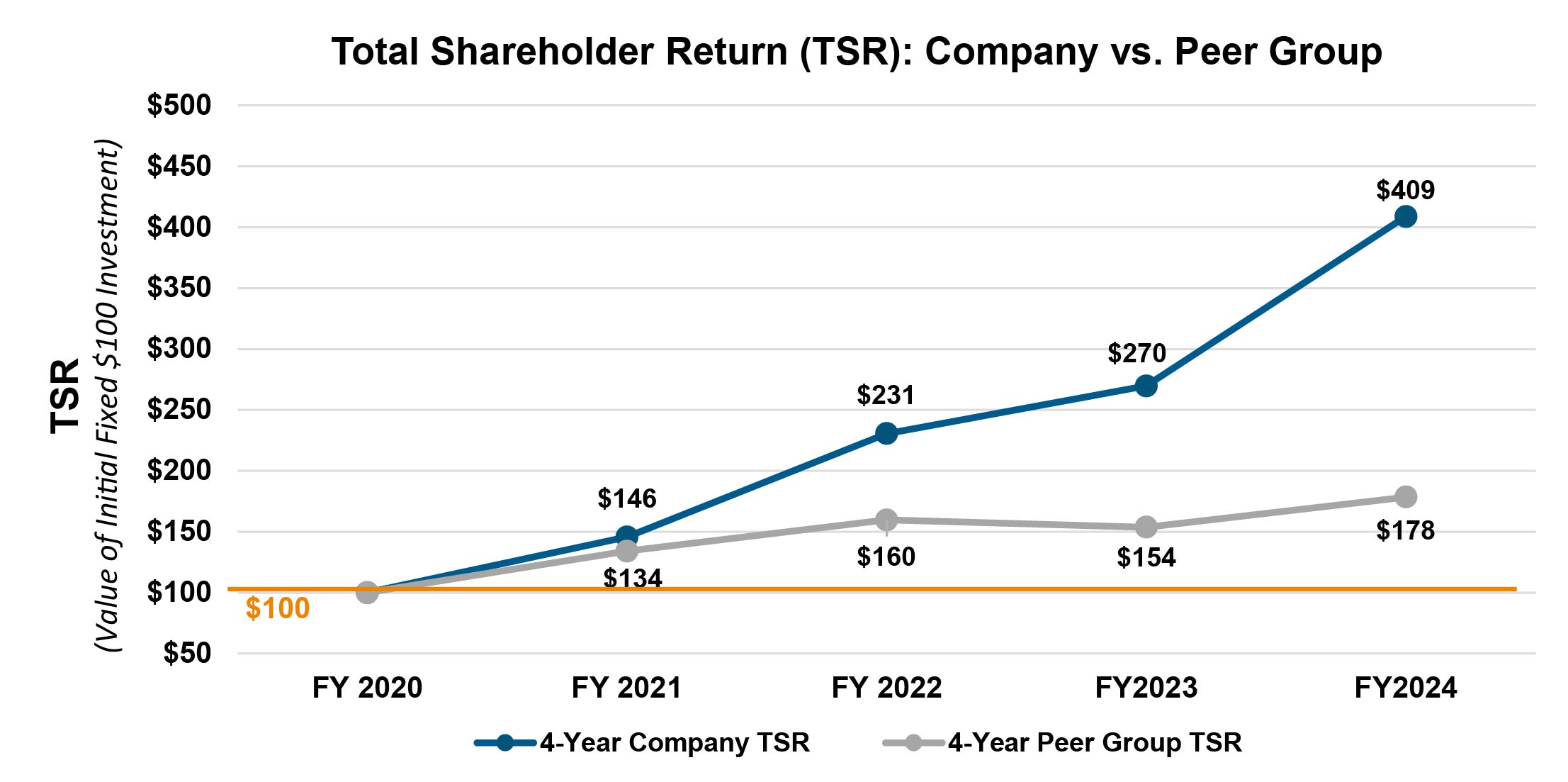
Compensation Actually Paid (CAP) versus TSR: As shown in the first table of this Pay versus Performance section, the PEO’s and Non-PEO NEOs’ CAP values are higher than the corresponding grant date fair values in the SCT, which is consistent with the Company’s positive TSR each year, as shown in the graphs immediately above and below. This is due primarily to the Company’s use of equity incentives, the value of which is tied directly to stock price in addition to the Company’s financial performance. Our executive compensation program emphasizes equity-based pay, with the majority of target direct compensation for both the PEO and Non-PEO NEOs delivered via equity-based awards.
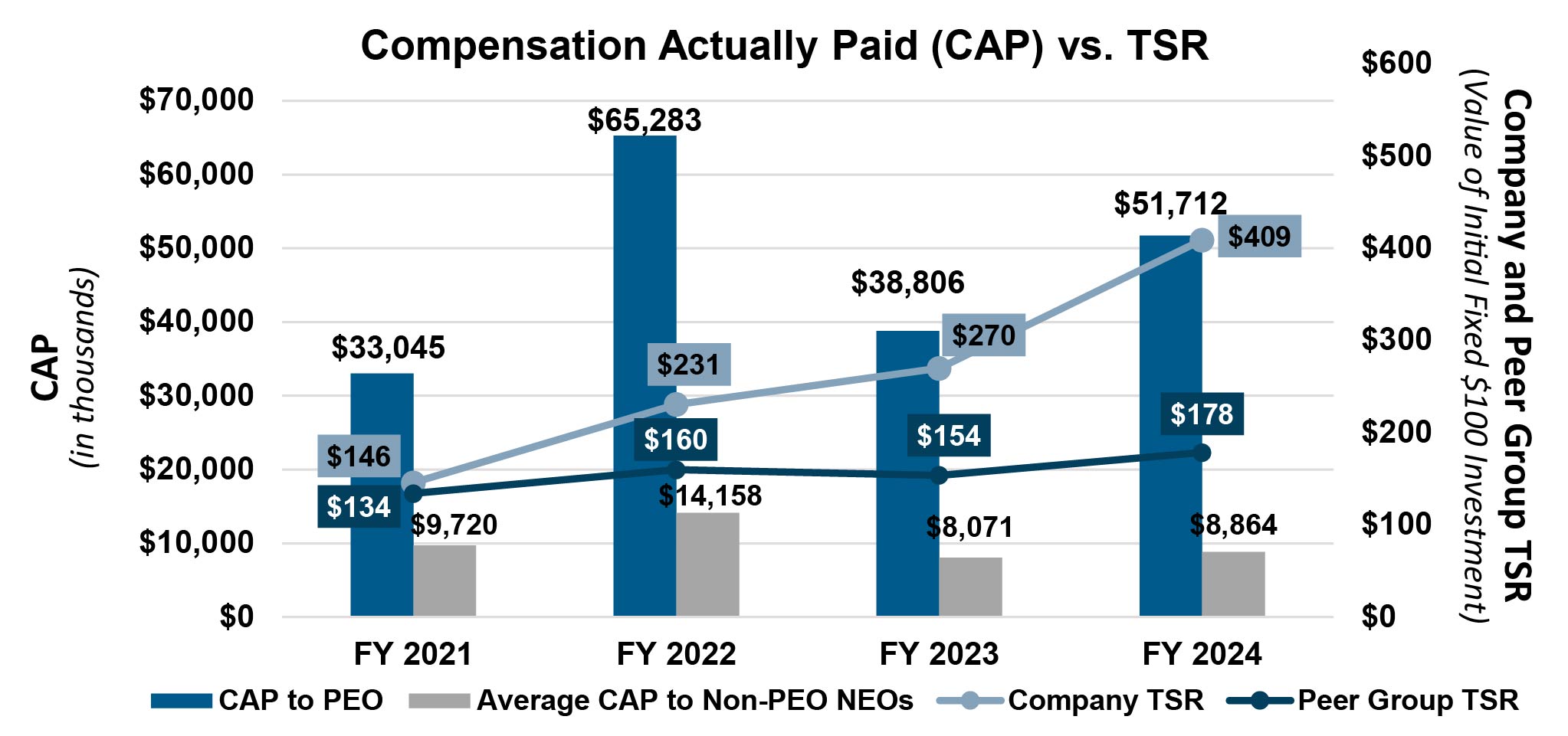
CAP versus Adjusted EPS: The chart below compares the PEO’s and Non-PEO NEOs’ CAP values to our Company-Selected Measure (CSM), Adjusted EPS. As noted above, for each fiscal year presented, CAP values are higher than the corresponding grant date fair value of stock awards shown in the SCT, which is consistent with our growing Adjusted EPS.
The Company focuses on Adjusted EPS in our incentive plans because earnings per share is one of the principal measures used by shareholders to assess financial performance results and establish a price for the Company’s equity, and it is a central component of our guidance to shareholders. The use of Adjusted EPS in our incentive plans aligns our executives’ interests with the broader set of strategic objectives they are tasked to manage, keeping enterprise value and shareholder interests at the forefront of management decisions on both a short- and long-term basis. Accordingly, Adjusted EPS is included as a key metric in both our annual and long-term incentives.
Given this emphasis on Adjusted EPS, its impact on the value of the Company’s shares and therefore CAP values — both positive and negative — is significant. Adjusted EPS drives a significant portion of the Company’s annual cash incentive and determines a significant portion of PSU award payouts to be earned during any three-year PSU performance period.
CAP versus Net Income: The Compensation and Talent Committee does not use Net Income to determine compensation opportunity or outcomes.
The Committee believes that Adjusted EPS is a superior indicator of core operating performance and profitability. In addition, it is common for our shareholders to use Adjusted EPS and other metrics to inform their views of historical and future expectations for underlying operational performance. Net Income, on the other hand, can show variability year over year due to timing of specific events or because of unusual or non-recurring events. For example, in the table above, there is a large net loss in FY 2021 Net Income, which was primarily attributable to the opioid litigation settlement charge included in our FY 2021 GAAP results of operations. The actual cash impact of that settlement will take place over multiple years, and the FY 2021 Net Income loss figure does not reflect the actual underlying performance of the business, which is better reflected by the other metrics included in our incentive programs, as well as the Company’s 46% TSR for that fiscal year.
Therefore, we would not necessarily expect to see alignment between Net Income (loss) and CAP. The Compensation and Talent Committee is focused on alignment of our compensation programs to metrics that most appropriately measure our profitability and sustainable long-term growth.
| | | | | | | | | | | | | | |
| ITEM 4 | | |
| | |
| | | | |
| Approve Amendment to Certificate of Incorporation to Provide for Officer Exculpation | |
| | | | |
| | | | |
| On January 31, 2024, the Board approved, and determined to recommend to our shareholders that they approve, certain amendments to the Company’s Amended and Restated Certificate of Incorporation (the Charter) to permit the exculpation of officers consistent with recent changes to the Delaware General Corporation Law (the DGCL). Section 9 of Article VI of the Charter currently includes certain exculpatory provisions that eliminate the liability of directors for monetary damages to the fullest extent possible under applicable law. As a Delaware corporation, the DGCL permits the Company to eliminate directors’ personal liability for monetary damages resulting from a breach of the fiduciary duty of care, subject to exceptions prescribed by the DGCL. Such director exculpatory provisions are common among large public companies, and we believe that they allow the Company to recruit and retain highly qualified persons to serve as directors. Under prior Delaware law, the statutory exculpatory provisions could only be extended to directors of corporations. However, effective August 1, 2022, the Delaware legislature amended the DGCL to permit Delaware corporations to extend similar exculpatory protections to officers, subject to the conditions and limitations under Section 102(b)(7) of the DGCL. The Board believes that it is in the best interests of the Company and its shareholders to provide such exculpatory provisions to the officers of the Company to the extent permitted by the DGCL, as recently amended. In making this determination, the Board considered that the DGCL provision limits exculpation of officers only to claims that do not involve breaches of the duty of loyalty, acts or omissions not in good faith or that involve intentional misconduct or a knowing violation of law, or any transaction in which the officer derived an improper personal benefit. Further, the statutory exculpation does not extend to derivative claims brought by or in the right of the Company. In weighing the potential benefits and drawbacks to shareholders, the Board further considered that officers, like directors, are exposed to a substantial risk of lawsuits that could seek to impose personal monetary liability. The Board believes that these new exculpatory protections recognized by the Delaware legislature, if approved by our shareholders, would allow the Company to continue to attract and retain highly qualified officers and enable them to exercise good business judgment and act in the best interests of the shareholders, while minimizing their potential personal liability and reducing distractions arising from frivolous litigation, including diversion of management attention and potential waste of corporate resources. If this proposal is approved by shareholders, a Certificate of Amendment to our Charter to implement this proposal will be filed with the Secretary of State of the State of Delaware, and Section 9 of Article VI of the Charter will be amended to read in its entirety as set forth below (with additions shown as underlined): 9. Liability of Directors and Officers. To the fullest extent permitted by Delaware statutory or decisional law, as amended or interpreted, no director or officer of this Corporation shall be personally liable to the Corporation or its stockholders for monetary damages for breach of fiduciary duty as a director or officer, as applicable. This Section 9 does not affect the availability of equitable remedies for breach of fiduciary duties. Solely for purposes of this Section 9, “officer” shall have the meaning determined in accordance with Section 102(b)(7) of Title 8 of the Delaware Code, as amended from time to time. | |
| | | | |
| | | | |
| Your Board recommends a vote FOR this proposal. | |
| | | | |
| | | | | | | | | | | | | | |
| ITEM 5 | | |
| | |
| | | | |
| Shareholder Proposal on Independent Board Chairman | |
| | | | |
| | | | |
| Shareholders will vote on the following proposal if it is properly presented at the Annual Meeting and not previously withdrawn or otherwise excluded. The Company is not responsible for the accuracy or content of the shareholder proposal presented below, which appears in the form we received it. It may contain typographical or other errors, as well as assertions about the Company that we believe are incorrect. We have not attempted to make any corrections or refute any inaccuracies. The following shareholder proposal has been submitted to the Company for action at the Annual Meeting by John Chevedden. Mr. Chevedden’s address and shareholdings will be provided promptly upon receipt of a written or oral request. Proposal 5 – Independent Board Chairman Shareholders request that the Board of Directors adopt an enduring policy, and amend the governing documents as necessary in order that 2 separate people hold the office of the Chairman and the office of the CEO. Whenever possible, the Chairman of the Board shall be an Independent Director. This includes that a former CEO is determined to not be independent. The Board has the discretion to select a Temporary Chairman of the Board who is not an Independent Director to serve while the Board is seeking an Independent Chairman of the Board on an accelerated basis. Although it is best practice to adopt this proposal soon this policy could be phased in when there is a contract renewal for our current CEO or for the next CEO transition. The roles of Chairman and CEO are fundamentally different and should be held by 2 directors, a CEO and a Chairman who is completely independent of the CEO and our company. The job of the CEO is to manage the company. The job of the Chairman is to oversee the CEO. This proposal topic won 52% support at Boeing and 54% support at Baxter International in 2020. Boeing then adopted this proposal topic. The ascending complexities of a company with $60 Billion in market capitalization, like McKesson, increasingly demands that 2 persons fill the 2 most important jobs on an enduring basis — Chairman and CEO. This should be an easy proposal for McKesson to adopt because McKesson already has an independent Board Chairman. However the McKesson Board could, on short notice, appoint one person to the 2 most important jobs at McKesson for an extended period of time. And if that happens there are no established roles for a McKesson Lead Director. Please vote yes: Independent Board Chairman – Proposal 5 | |
| | | | |
| | |
| Item 5. Shareholder Proposal on Independent Board Chairman |
|
| | | | | | | | | | | | | | |
| COMPANY STATEMENT IN OPPOSITION Your Board recommends a vote “AGAINST” this proposal for the following reasons: •The Board recognizes the value of strong independent Board leadership; currently, Don Knauss serves as independent Board Chair. •McKesson and its shareholders are best served when leadership choices are made by the Board on a case-by-case basis. •The Board regularly evaluates and reviews the Board’s leadership structure, a process which incorporates feedback from the Company’s shareholders. The Board recognizes the value of strong independent Board leadership; currently Don Knauss serves as independent Board Chair. An independent Board Chair has led our Board since 2019, when Brian Tyler became our CEO. Our Board elected Mr. Knauss as independent Board Chair in April 2022, succeeding the prior independent Board Chair, Edward Mueller, in a planned transition. McKesson and its shareholders are best served when leadership choices are made by the Board on a case-by-case basis. The Board believes continued flexibility to appoint the necessary Board leadership on a case-by-case basis is in the best interest of the Company and its shareholders. While the Board’s current practice is to elect an independent Board Chair, its directors have a fiduciary duty to regularly evaluate and determine the most appropriate Board leadership structure for McKesson and its shareholders in light of the Company’s evolving needs, circumstances and opportunities. Our current directors have deep knowledge of the strategic goals of the Company, the opportunities and challenges it faces, and the various capabilities of our directors and management. Therefore, the Board is best positioned to determine the most effective Board leadership structure, on a case-by-case basis, to protect and enhance long-term shareholder value. In situations where the Board Chair is not independent, McKesson’s Corporate Governance Guidelines require the appointment of a Lead Independent Director with clearly defined responsibilities to ensure strong independent governance functions and effective oversight of management. The Board opposes a prescriptive policy that would unnecessarily restrict its ability in structuring McKesson’s Board leadership as appropriate when faced with new or different circumstances. This proposal, if implemented, does not consider individual qualifications or if such a structure is the most suitable for the specific circumstances that the Board would need to consider. The rigid standard imposed by this proposal would deprive the Board of the flexibility to use its business judgment to select the most effective Board leadership structure to meet the needs of the Company and prioritize the interests of its shareholders based on the circumstances confronting the Board and the Company at any given time. The Board regularly evaluates and reviews the Board’s leadership structure, a process which incorporates feedback from the Company’s shareholders. The Board and the Governance and Sustainability Committee evaluate the Board’s leadership structure at least annually, and more frequently as appropriate. This process includes evaluating the performance of the current Board Chair and Board leadership structure generally to ensure strong independent governance and effective oversight of management. In addition, we regularly discuss our Board leadership structure with our shareholders as part of our year-round shareholder engagement program. Through these conversations, shareholders have not expressed concerns about our Board’s current ability to determine the appropriate Board leadership structure for the Company at any given time. The Board maintains effective independent oversight on behalf of our shareholders by ensuring that the Audit, Compensation and Talent, and Governance and Sustainability Committees are led by and composed entirely of independent directors. McKesson follows strong corporate governance practices as described in more detail beginning on page 11 of this proxy statement. | |
| | |
| Your Board recommends a vote "AGAINST" this proposal. | |
| | | | | | | | | | | | | | |
| ITEM 6 | | |
| | |
| | | | |
| Shareholder Proposal on Report on Risks of State Policies Restricting Reproductive Health Care | |
| | | | |
| | | | |
| Shareholders will vote on the following proposal if it is properly presented at the Annual Meeting and not previously withdrawn or otherwise excluded. The Company is not responsible for the accuracy or content of the shareholder proposal presented below, which appears in the form we received it. It may contain typographical or other errors, as well as assertions about the Company that we believe are incorrect. We have not attempted to make any corrections or refute any inaccuracies. The following shareholder proposal has been submitted to the Company for action at the Annual Meeting by Rhia Ventures. Rhia Ventures’ address and shareholdings will be provided promptly upon receipt of a written or oral request. Report on Risks of State Policies Restricting Reproductive Health Care WHEREAS: Companies must navigate a patchwork of state laws regarding the provision of reproductive health care. Since 2011, states have passed more than 600 laws restricting abortion access, and twelve states now ban most abortions. Other states have enacted legislation that protects these rights. McKesson has significant operations in states where reproductive rights are severely limited. McKesson’s female employees – over 62 percent of the company’s 35,000 employees in the United States – may face challenges accessing reproductive healthcare, including abortion services, for themselves or family members. McKesson may find it more difficult to recruit employees in states that have outlawed abortion (bit.ly/3Ctj3ZI). Employers, as well as employees, bear the cost of restricted access to reproductive health care. Women who cannot access abortion are three times more likely to leave the workforce than women who are able to access abortion when needed, and four times as likely to slip into poverty (bit.ly/37qrmMw). The Institute for Women’s Policy Research estimates state abortion restrictions may annually keep nearly 597,000 women aged 15 to 44 out of the workforce (bit.ly/3SQRp4n). This may harm McKesson’s ability to meet diversity goals, with negative consequences to performance, brand and reputation. According to a 2022 survey commissioned by Lean In, more than three-quarters of both women under 40 and men, regardless of political affiliation, would prefer to work for companies supporting abortion access (bit.ly/3IcR5qJ). A 2022 Harris Poll found that in the wake of the Dobbs decision, 69 percent of employees aged 18 to 34 want more clarity and transparency about their organization’s policies and benefits for reproductive healthcare (bit.ly/3OqENNL). RESOLVED: Shareholders request the Board issue a public report within one year of the annual meeting, omitting confidential information and at reasonable expense, detailing any known and potential risks or costs to the company caused by enacted or proposed state policies severely restricting reproductive rights or access to reproductive health medications, and detailing any strategies beyond litigation and legal compliance that the company may deploy to minimize or mitigate these risks. SUPPORTING STATEMENT: Shareholders recommend the report evaluate risks and costs to the company associated with new laws severely restricting reproductive rights and medication, and similar restrictive laws proposed or enacted in other states. In its discretion, the Board’s analysis may include effects on employee hiring, retention, and productivity, and decisions regarding closure or expansion of operations in states proposing or enacting restrictive laws and strategies such as public policy advocacy by the company, related political contributions policies, and human resources or educational strategies. | |
| | | | |
| | |
| Item 6. Shareholder Proposal on Report on Risks of State Policies Restricting Reproductive Health Care |
|
| | | | | | | | | | | | | | |
| COMPANY STATEMENT IN OPPOSITION Your Board recommends a vote “AGAINST” this proposal for the following reasons: •McKesson aspires to be the best place to work in healthcare by attracting, developing and retaining the best talent to advance our purpose of Advancing Health Outcomes for All®. •McKesson provides a comprehensive Total Rewards package, including medical benefits. •The proposal would impose unnecessary burdens on McKesson without any meaningful benefit to our employees or shareholders. McKesson aspires to be the best place to work in healthcare. We know that the success of our business depends on our ability to attract, hire, develop and retain a highly skilled and inclusive workforce. That’s why the first pillar of our enterprise strategy is focusing on our people and culture as we aspire to be the best place to work in healthcare. A component of our annual enterprise risk assessment focuses on talent, and our Board engages in regular oversight of talent, including employee inclusion, engagement and advancement. To reinforce our commitment to current and potential employees and define what makes McKesson a great company to work for, we strive every day to live our employee value proposition by providing meaningful work, caring for our employees and creating a culture where all employees feel they belong. Caring for our employees includes providing programs that focus on their holistic well-being, fostering a culture of purpose and ensuring our employees have a voice. McKesson provides a comprehensive Total Rewards package, including medical benefits. As part of our efforts to attract, retain and advance our employees, we offer comprehensive and competitive health and wellness benefits. This includes benefits essential to the health of our people. McKesson takes pride in the comprehensive Total Rewards package offered to our employees and regularly reviews our benefits programs to confirm they remain competitive; support our employees’ physical, emotional and financial well-being; and comply with applicable laws. We provide travel and lodging benefits that include travel for any covered health service if such covered service is not available from a local provider within 100 miles of an employee’s home. While McKesson offers an expansive set of benefits, the Company does not decide for any employee which treatments and procedures are medically necessary; rather, these decisions are made by our employees, employees’ healthcare providers and the insurance companies administering the plan. We take our employees' privacy seriously, especially when it comes to their health information. We want our employees to feel comfortable accessing their medical benefits. We value our people and are deeply committed to their health and well-being. We actively review and act on issues that our employees raise (anonymously or directly) concerning our benefits programs. To date, management is not aware of material concerns raised by employees concerning reproductive care coverage included in our health and wellness benefits. The proposal would impose unnecessary burdens on McKesson without any meaningful benefit to our employees or shareholders. The scope of the requested report is overly broad and burdensome. The report would need to include a thorough review of all existing state laws, and all proposed bills, regulations and policies that may never become applicable to our employees. As the legal landscape on this topic frequently changes, the requested report would also quickly become out-of-date. We plan to continue to obey all enacted and applicable laws and regulations. In line with our commitment to care for our employees, we will closely monitor the impacts on our employees of any enacted legislation, responding as needed to best support our workforce. This will allow us to more efficiently and effectively use our resources to meet the needs of our employees, rather than expending our resources on this requested report. It will also ensure we remain in compliance with all applicable laws and regulations. We know that the success of our business depends on our ability to attract, hire, develop and retain a highly skilled and inclusive workforce. Our success also relies on our ability to nurture a culture that supports our growth and aligns employees around the Company’s purpose of Advancing Health Outcomes for All®. Given our commitment to hiring and retaining the most talented people and our comprehensive healthcare benefits and polices, we do not believe that the requested report would provide meaningful value or that the cost of creating and publishing the requested report would be an effective use of Company resources. | |
| Your Board recommends a vote "AGAINST" this proposal. | |
Security Ownership of Certain Beneficial Owners
The following table sets forth, as of May 28, 2024, information regarding ownership of the Company’s outstanding common stock by any entity or person, to the extent known by us or ascertainable from public filings, that is the beneficial owner of more than 5% of the outstanding shares of common stock:
| | | | | | | | | | | |
| Name and Address of Beneficial Owner | Amount and Nature of Beneficial Ownership | Percent of Class* |
| | | |
The Vanguard Group 100 Vanguard Boulevard Malvern, Pennsylvania 19355 | 12,145,675 | | (1) | 9.3% |
| | | |
| | | |
BlackRock, Inc. 50 Hudson Yards New York, New York 10001 | 11,665,986 | | (2) | 9.0% |
| | | |
* Based on 129,936,487 shares of common stock outstanding, as of May 28, 2024.
(1)This information is based upon a Schedule 13G/A filed with the SEC on February 13, 2024 by The Vanguard Group, which reports shared voting power with respect to 178,157 shares, sole dispositive power with respect to 11,570,003 shares, and shared dispositive power with respect to 575,672 shares.
(2)This information is based upon a Schedule 13G/A filed with the SEC on January 25, 2024 by BlackRock, Inc., which reports sole voting power with respect to 10,509,429 shares and sole dispositive power with respect to 11,665,986 shares as a result of being a parent company or control person of certain subsidiaries.
Section 16(a) Reports
Section 16(a) of the Securities Exchange Act of 1934, as amended (Exchange Act) requires the Company’s directors and executive officers, and persons who own more than 10% of a registered class of the Company’s equity securities, to file with the SEC initial reports of ownership and reports of changes in ownership of common stock and other equity securities of the Company. Such officers, directors and greater than 10% shareholders are required by SEC regulations to furnish the Company with copies of all Section 16(a) forms they file.
To the Company’s knowledge, all reports required by Section 16(a) of the Exchange Act in FY 2024 from our officers, directors and greater than 10% beneficial owners were timely filed.
Security Ownership of Directors and Executive Officers
The following table sets forth, as of May 28, 2024, except as otherwise noted, information regarding ownership of the Company’s outstanding common stock by: (i) all directors and director nominees; (ii) each executive officer named in the 2024 Summary Compensation Table below (collectively, our named executive officers or the NEOs); and (iii) all directors, NEOs and executive officers as a group. The table also includes shares of common stock that underlie outstanding RSUs and options to purchase common stock of the Company that either vest or become exercisable within 60 days after May 28, 2024.
| | | | | | | | | | | |
| Name of Individual | Shares of Common Stock Beneficially Owned | (1) | Percent of Class |
| Nancy Avila | 5,172 | | | * |
| Richard H. Carmona, M.D. | — | |
| * |
| Dominic J. Caruso | — | |
| * |
| W. Roy Dunbar | — | |
| * |
| Deborah Dunsire, M.D. | — | |
| * |
| James H. Hinton | — | |
| * |
| Donald R. Knauss | 2,069 | | (2) | * |
| Michele Lau | 138 | | (3) | * |
| Bradley E. Lerman | — | |
| * |
| Linda P. Mantia | 483 | |
| * |
| Maria N. Martinez | 483 | |
| * |
| Kevin M. Ozan | 15 | |
| * |
| Thomas L. Rodgers | 7,909 | | | * |
| Susan R. Salka | — | |
| * |
| Lori A. Schechter | 16,355 | | (2) | * |
| LeAnn B. Smith | 2,824 | |
| * |
| Brian S. Tyler | 97,412 | | (3) | * |
| Britt J. Vitalone | 17,004 | | (3 | * |
| Kathleen Wilson-Thompson | — | |
| * |
| All directors, NEOs and executive officers as a group (19 persons) | 149,864 | | (2)(3) | * |
* Less than 1.0%. The number of shares beneficially owned and the percentage of shares beneficially owned are based on 129,936,487 shares of the Company’s common stock outstanding as of May 28, 2024, adjusted as required by the rules promulgated by the SEC. Shares of common stock that may be acquired by exercise of stock options or vesting of RSUs within 60 days after May 28, 2024, and vested RSUs that are not yet settled are deemed outstanding and beneficially owned by the person holding such stock options or RSUs for purposes of computing the number of shares and percentage beneficially owned, but are not deemed outstanding for purposes of computing the percentage beneficially owned by any other person.
(1)Except as otherwise indicated in the footnotes to this table, the persons named have sole voting and investment power with respect to all shares of common stock shown as beneficially owned by them, subject to community property laws where applicable.
(2)Includes shares held by immediate family members who share a household with the named person, by family trusts as to which the named person and his or her spouse have shared voting and investment power, or by an independent trust for which the named person disclaims beneficial ownership as follows: Mr. Knauss, 1,296 shares; Ms. Schechter, 4,178 shares; and all directors, NEOs and executive officers as a group, 5,474 shares.
(3)Includes shares held under the Company’s 401(k) Plan as of May 28, 2024, as follows: Ms. Lau, 138 shares; Mr. Tyler, 214 shares; Mr. Vitalone, 549 shares; and all NEOs and executive officers as a group, 901 shares.
| | | | | |
| |
| Annual Meeting Information |
Record Date and Who Can Vote
On or about June [ ], 2024, the Company began delivering proxy materials to all shareholders of record at the close of business on June 5, 2024 (Record Date). On the Record Date, there were 129,710,815 shares of the Company’s common stock outstanding and entitled to vote. As a shareholder, you are entitled to one vote for each share of common stock you held on the Record Date, including shares: (A) held for you in an account with a broker, bank or other nominee; (B) held directly in your name as the shareholder of record; or (C) allocated to your account in the Company’s 401(k) Plan.
The names of shareholders of record entitled to vote at the Annual Meeting will be available for 10 days prior to the meeting for any purpose germane to the Annual Meeting. You may request this information prior to the Annual Meeting by contacting the Corporate Secretary of the Company by email at corpsecretary@mckesson.com.
How to Vote
Your vote is important. Shareholders can vote by using the Internet, telephone or mail, or at the Annual Meeting. As a shareholder, you are entitled to one vote for each share of common stock you held on the Record Date. You can vote in any of the following ways:
Shareholders of Record or a Participant in the Company’s 401(k) Plan
If you are a shareholder of record or a participant in the Company’s 401(k) Plan, you can vote your shares by using the Internet, by calling a toll-free number, or by mailing your signed proxy card(s). Specific instructions for voting by means of the Internet or telephone are included on the accompanying proxy card. The Internet and telephone voting procedures are designed to authenticate your identity, allow you to vote your shares and confirm that your voting instructions have been properly recorded. If you do not wish to vote via the Internet or by telephone, please complete, sign and return the proxy card in the self-addressed, postage-paid envelope provided.
Street Name Shareholders
If you have shares held by a broker, bank or other nominee, you can vote your shares by following the instructions provided by your broker, bank or other nominee.
Your vote as a shareholder is important. Please vote as soon as possible to ensure that your vote is recorded.
Proxy Authority
All shares represented by valid proxies will be voted as specified and in the discretion of the designated proxy holders as to any other matters that may properly come before the Annual Meeting. If you sign and return a proxy card without specific voting instructions, your shares will be voted as recommended by our Board of Directors on all proposals described in this proxy statement, and in the discretion of the designated proxy holders as to any other matters that may properly come before the Annual Meeting. We are currently not aware of any matter to be presented at the Annual Meeting other than the items described in this proxy statement.
Revocation
You can revoke your proxy at any time before the Annual Meeting by sending to the Company’s Corporate Secretary a written revocation to corpsecretary@mckesson.com or by submitting a proxy bearing a later date by the voting methods described above. You may also revoke your proxy by attending the Annual Meeting and casting a ballot. If you have shares held by a broker, bank or other nominee, you can revoke your proxy by following the instructions provided by your broker, bank or other nominee.
| | |
| Annual Meeting Information |
|
Attendance
The Annual Meeting will be held on July 31, 2024 and conducted exclusively online without an option for physical attendance. Shareholders of record as of the Record Date will be able to attend and participate in the online Annual Meeting by visiting www.virtualshareholdermeeting.com/MCK2024 and entering the 16-digit control number on your Notice, voting instructions form or on your proxy card for purposes of asking questions and casting your votes for the Annual Meeting ballot items. Only shareholders and proxy holders who enter their valid control number will be able to participate in the online Annual Meeting in order to submit questions and vote.
The live webcast of the Annual Meeting will begin promptly at 8:30 a.m., Central Time. We encourage you to access the webcast early, starting at approximately 8:15 a.m., Central Time, in order to allow yourself time to log in and test your computer. If you encounter technical difficulties accessing the online Annual Meeting, please call the technical support telephone number posted on www.virtualshareholdermeeting.com/MCK2024.
Even if you plan to attend the Annual Meeting online, we recommend that you vote in advance of the Annual Meeting as described in this proxy statement, so that your vote will be counted if you later decide to not attend the Annual Meeting or you encounter technical difficulties. If you properly submit your votes before the online Annual Meeting, then you do not have to vote at the Annual Meeting unless you wish to change your vote.
Dividend Reinvestment Plan
For those shareholders who participate in the Company’s Automatic Dividend Reinvestment Plan (DRP), the enclosed proxy card includes all full shares of common stock held in your DRP account on the Record Date for the Annual Meeting, as well as your shares held of record.
401(k) Plan
Participants in the Company’s tax-qualified 401(k) Plan have the right to instruct the trustee, on a confidential basis, how the shares allocated to their accounts are to be voted, and will receive a voting instruction card for that purpose. In general, the 401(k) Plan provides that all shares for which no voting instructions are received from participants will be voted by the trustee in the same proportion as shares for which voting instructions are received. However, shares that have been allocated to 401(k) Plan participants’ PAYSOP accounts for which no voting instructions are received will not be voted.
Quorum, Vote Required and Method of Counting Votes
The presence in person or by proxy of holders of a majority of the voting power of the outstanding shares of common stock entitled to vote at the meeting will constitute a quorum for the transaction of business at the Annual Meeting. Abstentions or broker non-votes will be considered present for quorum purposes.
Item 1 – Election of Directors. You may vote “for” or “against” each of the director nominees, or “abstain” from voting on the election of any nominee. A nominee will be elected as a director if he or she receives a majority of votes cast (that is, the number of votes cast “for” a director nominee must exceed the number of votes cast “against” that nominee). Abstentions and broker non-votes (as described below) will not count as votes cast and will have no effect on the outcome of the matter. Each nominee previously submitted an irrevocable resignation in the event that the nominee fails to receive a majority of the votes cast and the Board decides to accept that resignation. As described in our Corporate Governance Guidelines, if a nominee fails to receive a majority of the votes cast, the Governance and Sustainability Committee will make a recommendation to the Board with respect to the irrevocable resignation, and the Board will take action no later than 90 days following the Annual Meeting and publicly disclose its determination. Directors are elected by a plurality of the votes cast in any contested election.
| | |
| Annual Meeting Information |
|
Item 2 – Ratification of the Appointment of the Independent Registered Public Accounting Firm. You may vote “for” or “against,” or “abstain” from voting on this proposal. Approval requires the affirmative vote of a majority of the voting power of the shares present in person or represented by proxy at the meeting and entitled to vote on the proposal. Shares represented by abstentions will have the effect of a vote against this proposal. As described in more detail below, this proposal is considered a routine matter, and brokers can cast discretionary votes on this proposal.
Item 3 – Non-Binding Advisory Vote on Executive Compensation. You may vote “for” or “against,” or “abstain” from voting on this non-binding advisory proposal. Approval requires the affirmative vote of a majority of the voting power of the shares present in person or represented by proxy at the meeting and entitled to vote on the proposal. Shares represented by abstentions will have the effect of a vote against this proposal. Broker non-votes with respect to this proposal will have no effect on the outcome of the matter.
Item 4 – Approval of Amendment to Certificate of Incorporation to Provide for Officer Exculpation. You may vote “for” or “against,” or “abstain” from voting on this proposal. Approval requires the affirmative vote of a majority of the voting power of the outstanding shares of our common stock entitled to vote on the matter. Shares represented by abstentions and broker non-votes will have the effect of a vote against this proposal.
Items 5 and 6 – Shareholder Proposals. You may vote “for” or “against,” or “abstain” from voting on this proposal. Approval requires the affirmative vote of a majority of the voting power of the shares present in person or represented by proxy at the meeting and entitled to vote on the proposal. Shares represented by abstentions will have the effect of a vote against this proposal. Broker non-votes with respect to this proposal will have no effect on the outcome of the matter.
All votes cast at the Annual Meeting will be tabulated by the independent inspector of election.
Broker Non-Votes
Broker non-votes occur when beneficial owners do not provide voting instructions and the broker, bank or other nominee does not have discretion to vote. Rules of the NYSE prohibit discretionary voting by brokers on certain “non-routine” matters. At the Annual Meeting, if brokers, banks and other nominees have not received instructions from the beneficial owners, they will not be permitted to vote on any proposal other than the ratification of the appointment of the independent registered public accounting firm (Item 2).
Therefore, we encourage all beneficial owners to provide voting instructions to your nominees to ensure that your shares are voted at the Annual Meeting.
Voting Results
We intend to publish voting results in a Current Report on Form 8-K to be filed with the SEC within four business days after the Annual Meeting.
Online Access to Annual Reports and Proxy Statements
The notice of annual meeting, proxy statement and annual report are available at www.proxyvote.com. Instead of receiving future copies of the proxy statement and annual report by mail, you may, by following the applicable procedures described below, elect to receive these documents electronically, in which case you will receive an e-mail with a link to these documents.
Shareholders of Record: You may elect to receive proxy materials online next year in place of printed materials by logging on to www.proxyvote.com and entering your request within either the Internet voting section or order hard copy options. By doing so you will save the Company printing and mailing expenses, reduce the impact on the environment and obtain immediate access to the annual report, proxy statement and voting form when they become available.
| | |
| Annual Meeting Information |
|
Beneficial Shareholders: If you hold your shares through a broker, bank or other holder of record, you may also have the opportunity to receive copies of the proxy statement and annual report electronically. Please check the information provided in the proxy materials mailed to you by your broker, bank or other holder of record regarding the availability of this service or contact the broker, bank or other holder of record through which you hold your shares and inquire about the availability of such an option for you.
If you elect to receive your materials via the Internet, you can still request paper copies by leaving a message with Investor Relations by sending an e-mail to investors@mckesson.com.
Important Notice Regarding the Availability of Proxy Materials for the 2024 Annual Meeting of Shareholders to be held on July 31, 2024. Our 2024 proxy statement and annual report are available free of charge at proxyvote.com.
Householding of Proxy Materials
In a further effort to reduce printing costs, postage fees and the impact on the environment, we have adopted a practice approved by the SEC called “householding.” Under this practice, shareholders who have the same address and last name and do not participate in electronic delivery of proxy materials will receive only one copy of our proxy materials, unless any of these shareholders notifies us that he or she wishes to continue receiving individual copies. Shareholders who participate in householding will continue to receive separate proxy cards.
If you share an address with another shareholder and received only one set of proxy materials, but would like to request a separate copy of these materials, we will have a separate copy promptly delivered to you upon your written or oral request. To request such a separate copy, please contact Broadridge Investor Communication Solutions by calling 1-866-540-7095 or by writing to Broadridge Investor Communication Solutions, Attn: Householding Department, 51 Mercedes Way, Edgewood, New York 11717. Similarly, you may also contact Broadridge Investor Communication Solutions if you received multiple copies of the proxy materials and would prefer to receive a single copy in the future.
Solicitation of Proxies
We are providing these proxy materials in connection with the solicitation made by the Company’s Board of Directors of proxies to be voted at the Annual Meeting. The Company is paying the cost of preparing, printing and mailing these proxy materials. We will reimburse brokerage firms, banks and others for their reasonable expenses in forwarding proxy materials to beneficial owners and obtaining their instructions. The Company has retained Alliance Advisors LLC (Alliance) to assist in distributing these proxy materials. We have also engaged Alliance to assist in the solicitation of proxies. We expect Alliance’s solicitation fee to be approximately $50,000 plus out-of-pocket expenses. The directors, officers and employees of the Company may also participate in the solicitation without remuneration in addition to compensation received as directors, officers or employees.
Shareholder Proposals for the 2025 Annual Meeting
To be eligible for inclusion in the Company’s 2025 proxy statement pursuant to Rule 14a-8 under the Exchange Act, shareholder proposals must be sent to the Corporate Secretary of the Company at corpsecretary@mckesson.com or at the principal executive offices of the Company located at 6555 State Highway 161, Irving, Texas 75039, and must be received no later than [ ].
The Company’s advance notice By-Law provisions require that, for our 2025 Annual Meeting, shareholder nominations made outside of the Company’s proxy access By-Law provisions and proposals made outside of Rule 14a-8 under the Exchange Act must be submitted in accordance with the requirements of the By-Laws, no later than May 2, 2025 and no earlier than April 2, 2025. Any notice of director nominations other than through the Company's proxy access provision must include the additional information required by Rule 14a-19(b) under the Exchange Act.
Shareholders may also request that director nominees be included in the Company’s proxy materials pursuant to the Company’s proxy access provisions under its By-Laws. Such nominations must be submitted no later than April 2, 2025 and no earlier than March 3, 2025. Each shareholder making such a nomination would be required to provide certain information, representations and undertakings as outlined in the By-Laws. A copy of the full text of the Company’s By-Laws referred to above may be obtained by writing to the Corporate Secretary of the Company.
| | |
| Annual Meeting Information |
|
A copy of the Company’s Annual Report on Form 10-K for the fiscal year ended March 31, 2024, on file with the SEC, excluding certain exhibits, may be obtained without charge by writing to Investor Relations, McKesson Corporation, 6555 State Highway 161, Irving, TX 75039.
Website addresses and hyperlinks are included for reference only. The reports mentioned above, or any other information contained on or available through websites referred to and/or linked to in this Proxy Statement (other than the Company’s website to the extent specifically referred to herein as required by the SEC or NYSE rules) are not part of this proxy solicitation and are not incorporated by reference into this Proxy Statement or any other proxy materials.
Some of these reports and information contain cautionary statements regarding forward-looking information that should be carefully considered. Our statements and reports about our objectives may include statistics or metrics that are estimates, make assumptions based on developing standards that may change, and provide aspirational goals that are not intended to be promises or guarantees. For more information, please refer to the section “Cautionary Statements” in our Impact Report. The statements and reports may also change at any time and we undertake no obligation to update them, except as required by law.
| | | | | |
| |
| Appendix A — Supplemental Information |
The Company believes the presentation of Non-GAAP measures provides useful supplemental information to investors with regard to its operating performance, as well as assists with the comparison of its past financial performance to the Company’s future financial results. Moreover, the Company believes that the presentation of Non-GAAP measures assists investors’ ability to compare its financial results to those of other companies in the same industry. However, the Company’s Non-GAAP measures may be defined and calculated differently by other companies in the same industry.
Reconciliation of GAAP Earnings Per Diluted Share (EPS) to Adjusted Earnings Per Share (EPS) for Incentive Compensation (Non-GAAP)
| | | | | | | | | | | | | | | | | | | | |
| Year Ended March 31, |
| 2024 | | 2023 | | 2022 |
Earnings per diluted common share from continuing operations attributable to McKesson Corporation (GAAP)(a) | $ | 22.39 | | | $ | 25.05 | | | $ | 7.26 | | |
| After-tax adjustments: | | | | | | |
| Amortization of acquisition-related intangibles | 1.42 | | | 1.29 | | | 1.69 | | |
| Transaction-related expenses and adjustments | 0.15 | | | (0.52) | | | 10.40 | | |
| LIFO inventory-related adjustments | (0.86) | | | 0.01 | | | (0.11) | | |
| Gains from antitrust legal settlements | (1.35) | | | (0.67) | | | (0.22) | | |
| Restructuring, impairment, and related charges, net | 0.66 | | | 1.13 | | | 1.46 | | |
| Claims and litigation charges, net | 0.82 | | | 0.02 | | | 1.54 | | |
| Other adjustments, net | 4.21 | | | (0.37) | | | 1.67 | | (b) |
Adjusted Earnings per Diluted Share (Non-GAAP)(a) | $ | 27.44 | | | $ | 25.94 | | | $ | 23.69 | | |
| After-tax adjustments: | | | | | | |
Incentive compensation adjustments, net(a) | — | | | 0.43 | | | (0.43) | | (c) |
Adjusted EPS for Incentive Compensation (Non-GAAP)(a) | $ | 27.44 | | | $ | 26.37 | | | $ | 23.26 | | |
| | | | | | | | | | | |
| | FY 2022 — FY 2024
Cumulative |
3-Year cumulative earnings per diluted common share from continuing operations attributable to McKesson Corporation (GAAP)(a) | | $ | 54.70 | | (d) |
| After-tax adjustments | | 22.37 | | |
3-Year Cumulative Adjusted Earnings per Diluted Share (Non-GAAP)(a) | | $ | 77.07 | | (d) |
Incentive compensation adjustments, net(a) | | $ | 2.10 | | (e) |
3-Year Cumulative Adjusted EPS for Incentive Compensation (Non-GAAP)(a) | | $ | 79.17 | | |
(a)Certain computations may reflect rounding adjustments.
(b)Other adjustments, net includes a provision for bad debts of $4 per diluted share for the year ended March 31, 2024 related to the bankruptcy of our customer, Rite Aid Corporation.
(c)For the year ended March 31, 2024, consists of $(0.01) per diluted share of foreign currency gains or losses, primarily related to Canadian dollars and Euros, compared to our fiscal 2024 plan FX rates offset by $0.01 per diluted share related to business acquisition activities. For the year ended March 31, 2023, consists of $0.24 per diluted share of foreign currency gains or losses, primarily related to Euros and Canadian dollars, compared to our fiscal 2023 plan FX rates and $0.20 per diluted share impact from our European divestiture activities, partially offset by $(0.01) per diluted share related to business acquisition activities. For the year ended March 31, 2022, consists of $(0.47) per diluted share impact from our European divestiture activities, partially offset by $0.03
| | |
| Appendix A — Supplemental Information |
|
per diluted share of foreign currency gains or losses, primarily related to Euros and Canadian dollars, compared to our fiscal 2022 plan FX rates.
(d)GAAP earnings per diluted common share from continuing operations attributable to McKesson Corporation, as reported in our Annual Report on Form 10-K, was $22.39, $25.05, and $7.26 for the years ended March 31, 2024, 2023, and 2022, respectively. Adjusted Earnings per Diluted Share (Non-GAAP) was $27.44, $25.94, and $23.69 for the years ended March 31, 2024, 2023, and 2022, respectively.
(e)Incentive compensation adjustments, net includes $0.44 per diluted share impact of foreign currency gains or losses, primarily related to Canadian dollars and Euros, compared to our fiscal 2022 plan FX rates, $1.65 per diluted share from our European divestiture activities, and $0.01 per diluted share from business acquisition activities.
Reconciliation of GAAP Income from Continuing Operations before Interest Expense and Income Taxes to Adjusted Operating Profit for Incentive Compensation (Non-GAAP)
| | | | | | | | | | | |
| (In millions) | Year Ended March 31, 2024 |
| Income from continuing operations before interest expense and income taxes (GAAP) | | $ | 4,041 | | |
| Pre-tax adjustments: | | | |
| Amortization of acquisition-related intangibles | | 249 | | |
| Transaction-related expenses and adjustments | | (12) | | |
| LIFO inventory-related adjustments | | (157) | | |
| Gains from antitrust legal settlements | | (244) | | |
| Restructuring, impairment, and related charges, net | | 115 | | |
| Claims and litigation charges, net | | 147 | | |
| Other adjustments, net | | 762 | | |
| Adjusted Operating Profit (Non-GAAP) | | $ | 4,901 | | |
| Pre-tax adjustments: | | | |
| Incentive compensation adjustments, net | | — | | (a) |
| Adjusted Operating Profit for Incentive Compensation (Non-GAAP) | | $ | 4,901 | | |
(a)Consists of $(1) million of foreign currency gains or losses, primarily related to Canadian dollars and Euros, compared to our fiscal 2024 plan FX rates, partially offset by $1 million related to business acquisition activities.
| | |
| Appendix A — Supplemental Information |
|
Reconciliation of Operating Cash Flow (GAAP) to Free Cash Flow (Non-GAAP)
| | | | | | | | | | | | | | | | | | | | |
| Year Ended March 31, |
| (In millions) | 2024 | 2023 | 2022 |
| Operating Cash Flow (GAAP) | | $ | 4,314 | | | $ | 5,159 | | | $ | 4,434 | |
| Investing Cash Flow (GAAP) | | (1,072) | | | (542) | | | (89) | |
| Financing Cash Flow (GAAP) | | (3,342) | | | (4,368) | | | (6,321) | |
| Effect of exchange rate changes on cash, cash equivalents, and restricted cash | | 6 | | | 25 | | | 55 | |
| Cash, cash equivalents, and restricted cash classified as Assets held for sale | | — | | | 470 | | | (540) | |
| Net increase (decrease) in cash, cash equivalents, and restricted cash | | $ | (94) | | | $ | 744 | | | $ | (2,461) | |
| | | | | | | | | | | | | | | | | | | | |
| Year Ended March 31, |
| (In millions) | 2024 | 2023 | 2022 |
| Operating Cash Flow (GAAP) | | $ | 4,314 | | | $ | 5,159 | | | $ | 4,434 | |
| Payments for property, plant, and equipment | | (431) | | | (390) | | | (388) | |
| Capitalized software expenditures | | (256) | | | (168) | | | (147) | |
| Free Cash Flow (Non-GAAP) | | $ | 3,627 | | | $ | 4,601 | | | $ | 3,899 | |
Supplemental Non-GAAP Financial Information
In an effort to provide investors with additional information regarding the Company’s financial results as determined by generally accepted accounting principles (“GAAP”), McKesson Corporation (the “Company” or “we”) also presents the following Non-GAAP measures.
•Adjusted Earnings per Diluted Share (Non-GAAP) and 3-Year Cumulative Adjusted Earnings per Diluted Share (Non-GAAP): We define Adjusted Earnings per Diluted Share as GAAP earnings per diluted common share from continuing operations attributable to McKesson, excluding per share impacts of amortization of acquisition-related intangibles, transaction-related expenses and adjustments, LIFO inventory-related adjustments, gains from antitrust legal settlements, restructuring, impairment, and related charges, claims and litigation charges, other adjustments as well as the related income tax effects for each of these items, as applicable, divided by diluted weighted-average shares outstanding. We define 3-Year Cumulative Adjusted Earnings per Diluted Share as the sum of Adjusted Earnings per Diluted Share (Non-GAAP) for the applicable last three fiscal years.
•Adjusted Operating Profit (Non-GAAP): We define Adjusted Operating Profit as GAAP income from continuing operations before interest expense and income taxes, excluding amortization of acquisition-related intangibles, transaction-related expenses and adjustments, LIFO inventory-related adjustments, gains from antitrust legal settlements, restructuring, impairment, and related charges, claims and litigation charges, and other adjustments.
The following provides further details regarding the adjustments made to our GAAP financial results to arrive at our Non-GAAP measures as defined above:
Amortization of acquisition-related intangibles — Amortization expenses of intangible assets directly related to business combinations and the formation of joint ventures.
Transaction-related expenses and adjustments — Transaction, integration, and other expenses that are directly related to business combinations, the formation of joint ventures, divestitures, and other transaction-related costs including initial public offering costs. Examples include transaction closing costs, professional service fees, legal fees, severance charges, retention payments and employee relocation expenses, facility or other exit-related expenses, certain fair value adjustments including deferred revenues, contingent consideration and inventory, recoveries of acquisition-related expenses or post-closing expenses, net interest expense impact of hedging foreign currency-denominated notes, bridge loan fees and gains or losses on business combinations, and divestitures of businesses that do not qualify as discontinued operations.
LIFO inventory-related adjustments — LIFO inventory-related non-cash charges or credit adjustments.
| | |
| Appendix A — Supplemental Information |
|
Gains from antitrust legal settlements — Net cash proceeds representing the Company’s share of antitrust lawsuit settlements.
Restructuring, impairment, and related charges — Restructuring charges that are incurred for programs in which we change our operations, the scope of a business undertaken by our business units, or the manner in which that business is conducted as well as long-lived asset impairments. Such charges may include employee severance, retention bonuses, facility closure or consolidation costs, lease or contract termination costs, asset impairments, accelerated depreciation and amortization, and other related expenses. The restructuring programs may be implemented due to the sale or discontinuation of a product line, reorganization or management structure changes, headcount rationalization, realignment of operations or products, integration of acquired businesses, and/or company-wide cost saving initiatives. The amount and/or frequency of these restructuring charges are not part of our underlying business, which include normal levels of reinvestment in the business. Any credit adjustments due to subsequent changes in estimates are also excluded from adjusted results.
Claims and litigation charges — Adjustments to certain of the Company’s reserves, including those related to estimated probable settlements for its controlled substance monitoring and reporting, and opioid-related claims, as well as any applicable income items or credit adjustments due to subsequent changes in estimates. This does not include our legal fees to defend claims, which are expensed as incurred. This also may include charges or credits for general non-operational claims not directly related to our ongoing business.
Other adjustments — The Company evaluates the nature and significance of transactions qualitatively and quantitatively on an individual basis and may include them in the determination of our adjusted results from time to time. While not all-inclusive, other adjustments may include: other asset impairments; gains or losses from debt extinguishment; and other similar substantive and/or infrequent items as deemed appropriate.
The Company evaluates the aforementioned Non-GAAP measures on a periodic basis and updates the definitions from time to time. The evaluation considers both the quantitative and qualitative aspects of the Company’s presentation of Non-GAAP adjusted results.
Income tax effects are calculated in accordance with Accounting Standards Codification 740, “Income Taxes,” which is the same accounting principle used by the Company when presenting its GAAP financial results.
•Free Cash Flow (Non-GAAP): We define free cash flow as net cash provided by (used in) operating activities less payments for property, plant, and equipment and capitalized software expenditures, as disclosed in our consolidated statements of cash flows in our Annual Report on Form 10-K.
In addition, Adjusted EPS for Incentive Compensation (Non-GAAP), 3-Year Cumulative Adjusted EPS for Incentive Compensation (Non-GAAP), and Adjusted Operating Profit for Incentive Compensation (Non-GAAP) are measures that management utilizes to determine employee incentive compensation. These measures are further adjusted from certain non-GAAP measures defined above for incentive compensation adjustments, net, including certain foreign currency gains or losses compared to plan, certain business acquisition activities and the impact from our European divestiture activities. While not all-inclusive, incentive compensation adjustments, net may include other substantive and/or infrequent items as deemed appropriate by our Compensation and Talent Committee.
The Company believes the presentation of Non-GAAP measures provides useful supplemental information to investors with regard to its operating performance, as well as assists with the comparison of its past financial performance to the Company’s future financial results. Moreover, the Company believes that the presentation of Non-GAAP measures assists investors’ ability to compare its financial results to those of other companies in the same industry. However, the Company’s Non-GAAP measures may be defined and calculated differently by other companies in the same industry.
The Company internally uses both GAAP and Non-GAAP financial measures in connection with its own financial planning and reporting processes. Management utilizes Non-GAAP financial measures when allocating resources, deploying capital, as well as assessing business performance, and determining employee incentive compensation. The Company conducts its businesses internationally in local currencies, including Canadian dollars, Euro, and British pound sterling. As a result, the comparability of our results reported in U.S. dollars can be affected by changes in foreign currency exchange rates. We believe free cash flow is important to management and useful to investors as a supplemental measure as it indicates the cash flow available for working capital needs, re-investment opportunities, strategic acquisitions, share repurchases, dividend payments, or other strategic uses of cash. Nonetheless, Non-GAAP adjusted results and related Non-GAAP measures disclosed by the Company should not be considered a substitute for, nor superior to, financial results and measures as determined or calculated in accordance with GAAP.
 Filed by the Registrant
Filed by the Registrant











































































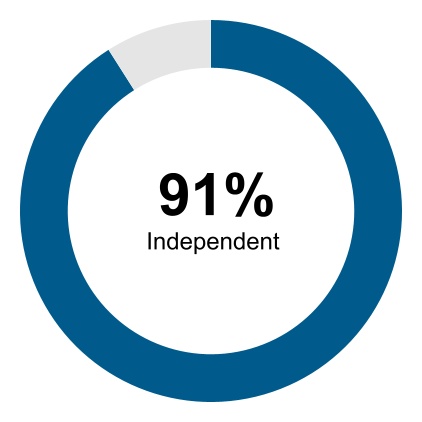































































 FOR
FOR FOR
FOR







 FOR
FOR AGAINST
AGAINST AGAINST
AGAINST












































































































































































































































































































































